THIS PAGE FIRST POSTED 1 JUNE 2018
LAST MODIFIED Thursday 26 June 2025 15:05
Eliza Hamilton Dunlop, songwriter
Dr GRAEME SKINNER (University of Sydney)
THIS PAGE IS CURRENTLY UNDER CONSTRUCTION
To cite this:
Graeme Skinner (University of Sydney),
"Eliza Hamilton Dunlop, songwriter",
Australharmony (an online resource toward the early history of music in colonial Australia):
https://sydney.edu.au/paradisec/australharmony/dunlop-eliza-hamilton.php; accessed 8 February 2026
For an introduction to Dunlop's songs see:
Graeme Skinner (University of Sydney), "Eliza Hamilton Dunlop, Irish and colonial melodist: her songs for music and collaborations with Isaac Nathan", in Anna Johnston and Elizabeth Webby (eds), Eliza Hamilton Dunlop: writing from the colonial frontier (Sydney: Sydney University Press, 2021), 121-58
https://dx.doi.org/10.30722/sup.9781743327487 (print and ebook)
ONSITE PDF (DOWNLOAD)
Page directory (click on live links)
* Personal data (Dunlop and family)
* Songs for music and other musical documentation
1815 - Verses (for Patrick Carolan)
1833 - Song lyrics (in The dark lady of Doona)
1838 - ? The saucy Superb (tune: ? Health to the duchess)
1838 - She was - yet have I oft denied [SoaE2] (tune: I stood amid the glittering throng)
1838 - The Aboriginal mother [SoaE4] (tune: 'Twas when the seas were roaring)
1839 - Your eyes have the twin-star's light [SoaE5] (tune: The foggy dew)
1839 - Song lyric [Walter Scott] in The ford of Emu Plains (tune: Allen-a-dale)
1840 - Oh! the limpid streams [SoaE7] ("for music")
1840 - I bless thy shores, my native land [SoaE8] (tune: Peggy Ban)
? c.1841 - Song lyrics (in The cousins of Aledo)
1841 - The Aboriginal mother (music: Nathan)
1842 - The eagle chief (music: Nathan)
1842 - Mable Macmahon (music: Nathan)
1842 - Star of the south (music: Nathan)
1843 - The Aboriginal father (music: Nathan)
1843 - The Irish volunteers ([music: Elfort])
1843 - Rosetta Nathan's dirge
1845 - Morning on Rostrevor mountain (no tune indicated)
1847 - Elegy for Mary Fitzroy
1848 - Our home is the gibber-gunyah (and other Aboriginal songs)
1853/57 - The Helleborus niger (tune: Eveleen's Bower)
1865 - The bell birds ring (tune from Bunting)
1867 - The spindrift bursts (no tune indicated)
Undated 1 - Echo of "My ain kind dearie O" (tune: My ain kind dearie O [The lea rig])
Undated 2 - The royal pilosus (tune: Far, far at sea)
Undated 3 - The evening star . . . (tune: The girl I left behind me)
Undated 4 - Mo Varia astore (? tune: O Mary asthore)
Undated 5 - Nathan
* General documentation (Dunlop and family)
* Musical sources and resources
See also mainpage on Dunlop's collaborator Isaac Nathan:
https://sydney.edu.au/paradisec/australharmony/nathan-isaac-and-family.php
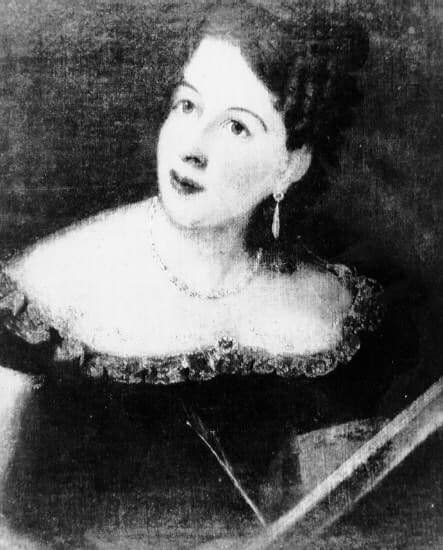
Eliza Hamilton Dunlop, c. 1820s (frontispiece illustration, De Salis 1967; from a portrait then in the possession of Miss I. L. Goddard)
DUNLOP, Eliza Hamilton (Eliza Matilda Harding HAMILTON; Mrs. LAW; Mrs. E. H. DUNLOP)
Poet, songwriter, recorder and translator of Indigenous songs
Born Armagh, Ireland, c. 1796
Married (1) James Sylvius LAW, Ireland, by 1812
Married (2) David DUNLOP, Ireland, 1823
Arrived Sydney, NSW, 25 February 1838 (per Superb, from Liverpool, 19 September 1837, via Hobart Town, 13 February 1838)
Died Wollombi, NSW, 20 June 1880, aged "84"
https://trove.nla.gov.au/search?l-publictag=Eliza+Hamilton+Dunlop (TROVE tagged)
http://nla.gov.au/nla.party-618587 (NLA persistent identifier)
http://worldcat.org/identities/lccn-n89650732 (WorldCat identities)
https://www.austlit.edu.au/austlit/page/A31624 (AustLit) (PAYWALL)
http://imslp.org/wiki/Category:Dunlop,_Eliza_Hamilton (IMSLP Petrucci Music Library)
https://australianroyalty.net.au/tree/purnellmccord.ged/individual/I11684/Eliza-Hamilton (Australian Royalty)
DUNLOP, David (David DUNLOP)
Born Priestland, Co. Antrim, Ireland, 12 May 1794
Married (2) Eliza LAW, Ireland, c. 1823
Arrived Sydney, NSW, 25 February 1838 (per Superb, from Liverpool, 19 September 1837, via Hobart Town, 13 February 1838)
Died Wollombi, NSW, 24 March 1863 (the later grave plaque has incorrectly "1864")
https://trove.nla.gov.au/search?l-publictag=David+Dunlop+d1863 (TROVE tagged by Australharmony)
LAW, Mary Georgina (Mary Sophia Georgina LAW)
Born Coleraine, Ireland, 1816; daughter of Eliza HAMILTON and James LAW
Arrived Sydney, NSW, 25 February 1838 (per Superb, from Liverpool, 19 September 1837, via Hobart Town, 13 February 1838)
Died Wollombi, NSW, May 1879
https://trove.nla.gov.au/search?l-publictag=Mary+Georgina+Law+d1879 (TROVE tagged by Australharmony)
https://nla.gov.au/nla.party-1484589 (NLA persistent identifier)
DUNLOP, Rachel Rhoda (Rachel Rhoda DUNLOP; Mrs. David Ambrose MILSON)
Born Ireland, c. 1828; daughter of Eliza HAMILTON and David DUNLOP
Arrived Sydney, NSW, 25 February 1838 (per Superb, from Liverpool, 19 September 1837, via Hobart Town, 13 February 1838)
Married David Ambrose MILSON, Wollombi, NSW, 16 March 1853
Died Dulwich Hill, NSW, 5 August 1908
https://trove.nla.gov.au/search?l-publictag=Rachel+Dunlop+Milson+d1908 (TROVE tagged)
Songs for music and other musical documentation
1818 - Verses (for Patrick Carolan)
Commentary:
Eliza Dunlop's earliest documented public musical engagement took place on 28 April 1818, when she was still Mrs. Law and aged around 21. A verse prologue she had written specially for the occasion was read at a benefit concert organised by the Belfast Anacreontic Society for the harper Patrick Carolan (Johnston with Plummer 2015, 83).
Land of those matchless chords whose faery spell
Owns the wide realm, and sways the pulse of feeling
Fair Land of heavens-taught minstrelsy, oh tell!
Why round thy Harp is letheal slumber stealing . . .
This Carolan was, according to Dunlop, "blind from birth" and the last surviving pupil of the recently deceased Arthur Ó Néill (c.1737-1816). But it is uncertain whether, or how, he was related to Turlough O'Carolan (1670-1738), whose tunes feature so prominently in Bunting's collections.
Ó Néill, in his memoirs dictated after he retired to Belfast in 1808 (ed. in Fox 1911), referred to "Young Carolan" - Turlough's only son - though supposed he had died in England. Yet even if Carolan junior was not dead, and born in his father's sixties, he can't have been less than 80 in 1818. Dunlop's lines do suggest that her harper was old (". . . One whose course of melody is run"), and that the benefit may have been arranged to convince him to remain in Belfast, rather than see the name Carolan "depart for other climes".
A fragmentary published collection of his father's music is supposed to have been published by Carolan junior in Dublin, with the assistance of Jonathan Swift, in 1748; a date of birth of c.1730 (his mother died in 1733) would seem most likely.
Sources:
The vase
http://digital.sl.nsw.gov.au/delivery/DeliveryManagerServlet?dps_pid=FL9674364 (DIGITISED)
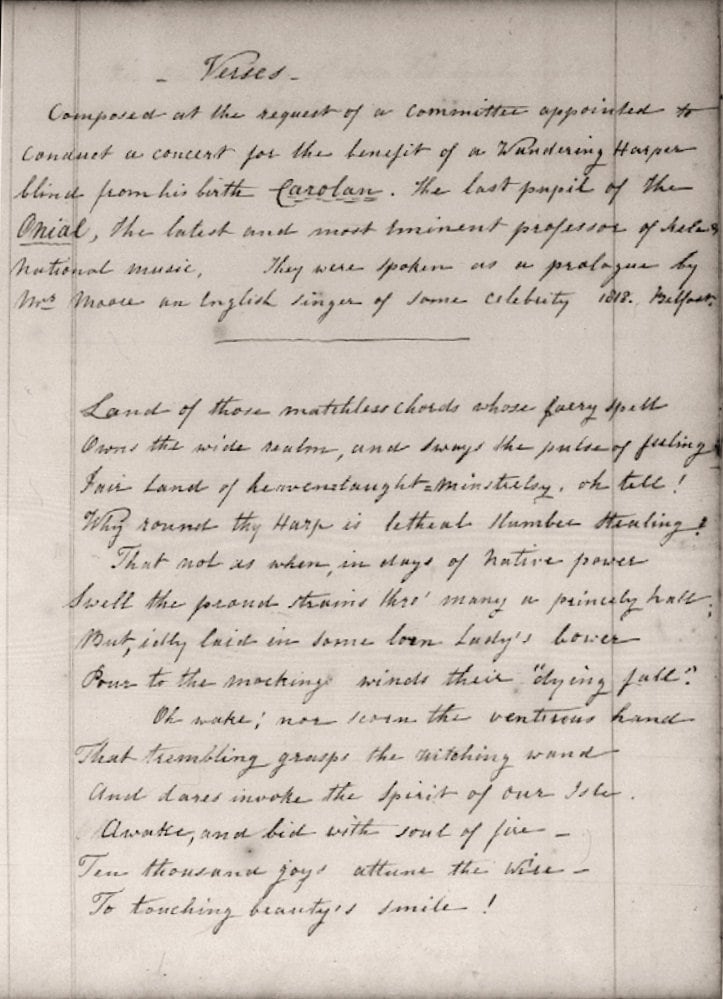
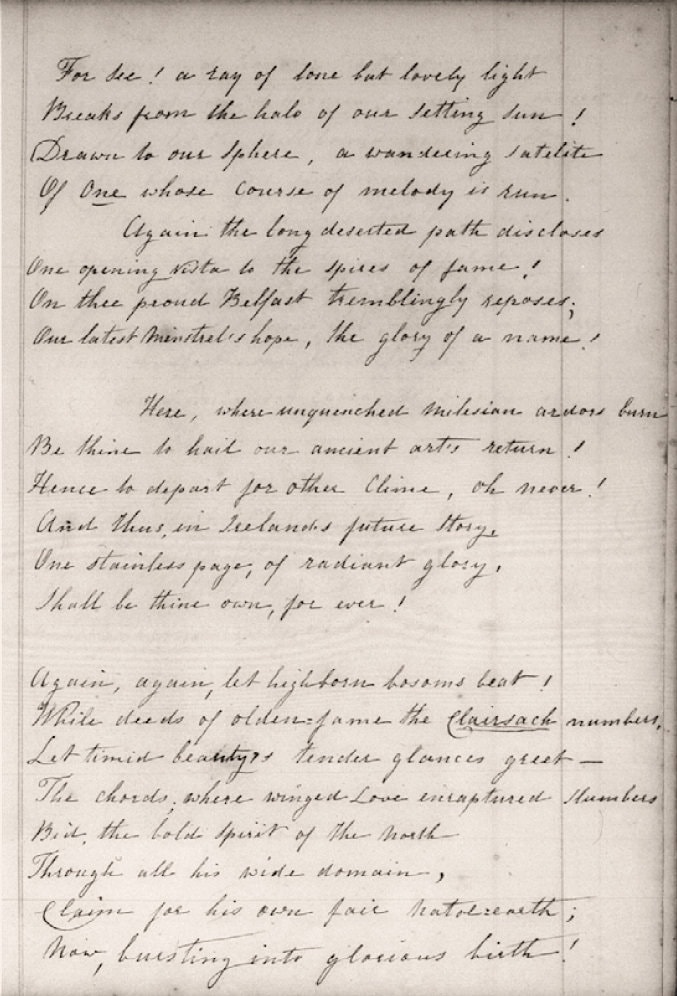

Verses
Composed at the request of a committee appointed to conduct a concert for the benefit of a Wandering Harper blind from his birth Carolan. The last pupil of the O'Nial, the latest and most eminent professor of Ireland's National music. They were spoken as a prologue by Mrs. Moore [?] an English singer of some celebrity. 1818. Belfast.
Land of those matchless chords whose faery spell
Owns the wide realm, and sways the pulse of feeling
Fair Land of heavens-taught minstrelsy, oh tell!
Why round thy Harp is letheal slumber stealing!
That not as when, in days of native power
Swell the proud strains thro' many a princely hall;
But, idly laid in some lorn Lady's bower
Pour to the mocking winds their "dying fall."
Oh wake! nor scorn the venturous hand
That trembling gropes the witching wand
And dare invoke the Spirit of our Isle.
Awake, and bid with soul of fire -
Ten thousand joys attune the Wise -
To touching beauty's smile!
For see! a ray of lone but lovely light
Breaks from the halo of our setting sun!
Drawn to our sphere, a wandering satelite
Of One whose course of melody is run.
Again the long deserted path discloses
One opening vista to the spires of fame!
On thee proud Belfast tremblingly reposes;
Our latest Minstrel's hope, the glory of a name!
Here, where unquenched Milesian ardors burn
Be thine to hail our ancient art's return!
Hence to depart for other climes, oh never!
And thus, in Ireland's future story,
One stainless page, of radiant glory,
Shall be thine own, for ever!
Again, again, let high-born bosoms beat!
While deeds of olden fame the Clairsach numbers,
Let timid beauty's tender glances greet -
The chords; where winged Love enraptured slumbers
Bid, the bold spirit of the North
Through all his wide domain
Claim for his own fair native earth;
Now, bursting into glorious birth!
The meed of honor, truth, and worth,
The noblest boon of Heaven! immortal music's reign.
Here let the spell-bound genius rest;
Catch harmony's entrancing sigh;
Pillowed on feeling's throbbing breast -
And watched by pity's dewy eye.
Then, Harper-Bards again shall sweep
The range of sound, low, bold, and deep;
And steadfast hope shall smile!
And memory cease to weep.
* Clair-sach or Clairdagh, from the Celtic Clas i.e. harmony - / The Harp : / it must be remembered that H is not a letter of the Irish alphabet and used only, as in the greek language, merely, as an aspirate.
"ADDRESS BY MRS. E. H. DUNLOP . . .", The Atlas (3 May 1845), 269
http://www.nla.gov.au/ferguson/1440365x/18450503/00010023/5-6.pdf
Composed at the request of a committee appointed to conduct a concert for the benefit of Carolan, a Wandering Harper, blind from his birth, a pupil of O'Niel, and the last professor of our national music. They were spoked as a prologue by Mrs. Moore, an English singer of some celebrity . . . [substanitally as above]
References:
Louisa M. Middleton, "O'Carolan, Torlogh", Dictionary of national biography (1885-1900), volume 41, 347-38
https://en.wikisource.org/wiki/O'Carolan,_Torlogh_(DNB00) (DIGITISED)
Robert Prescott Stewart, "Irish music", in George Grove, A dictionary of music and musicians (1900)
https://en.wikisource.org/wiki/A_Dictionary_of_Music_and_Musicians/Irish_Music (DIGITISED)
W. H. Grattan Flood, The story of the harp (London: The Walter Scott Publishing Co., 1905), 131, 145-47 (portrait of O'Neill 146)
https://archive.org/stream/cu31924022330025#page/n171/mode/2up (DIGITISED)
"Memoirs of Arthur O'Neill", ed. in Charlotte Milligan Fox, Annals of the Irish harpers (London: Smith, Elder & Co., 1911), 164-66
https://archive.org/stream/annalsofirishhar00foxcuoft#page/164/mode/2up (DIGITISED)
[164] . . . When Carolan died he left an only son and three daughters, and these lived in the County of Louth. The celebrated Dean Delany delighted in Carolan so much, [165] that he took young Carolan by the hand with the intention of opening a subscription for the purpose of defraying all expenses in reviving and recovering all his father's compositions. Young Carolan was but a tolerable performer on the harp, and totally destitute of any talent for composition. However, the Dean never ceased until he obtained a subscription to the amount of £1,600 or thereabouts, on which young Carolan made some attempts to represent his father; but his productions were scandalous, as I often heard, and Master Carolan becoming tired of industry, after humbugging the good-natured Dean for some time, formed an acquaintance with another man's wife in Ballymahon in the County of Longford, took her to London, where I am informed he died, when the residue of the 151,600 was spent, or otherwise disposed of between him and his Dulcinea . . . [166] . . . I heard a few tunes of the gleanings of young Carolan played, which I thought tolerably decent, but when I heard them and the chief part of his father's works played by the gentleman I alluded to I imagined myself in a manner enchanted.
Roy Johnston with Declan Plummer, The musical life of nineteenth-century Belfast (London and New York: Routledge, 2015), 83
https://books.google.com.au/books?id=NzkrDwAAQBAJ&pg=PA83 (PREVIEW)
Gráinne Yeats, "Carolan [Carrallan, Carrollan, Carrollini, O'Carolan], Turlough [Ó Cearbhalláin, Toirdhealbhach]", Grove music online
https://doi.org/10.1093/gmo/9781561592630.article.04978 (PAYWALL)
Breandán Ó Madagáin, "Carolan, Turlough [Toirdhealbhach Ó Cearbhalláin]”, Dictionary of national biography online
https://doi.org/10.1093/ref:odnb/20484 (PAYWALL)
1833/34 - Song lyrics in The dark lady of Doona (W. H. Maxwell)
Commentary:
In her first letter to Isaac Nathan in 1841, Dunlop mentioned that "a few of my songs" had appeared in The dark lady of Doona, a gothic novel by her cousin William Hamilton Maxwell, published in London in 1833/34. She later identified one of her contributions as the love song The Virginia voyager to his mistress ("Is lover's tear so insincere?"), the variant "original" of which she much later reprinted in The atlas in Sydney as 'Tis night at sea (1845).
Two of the novel's other songs, the short ballads "The stag will rest the foray o'er" ("from the Irish") and "The song is hush'd in Bala's halls", appealed to one of the early reviewers enough to quote them in full. Both were later anthologised under Maxwell's name, the second - on the triumphs of the Great O'Neill (c.1550-1616) - by Samuel Lover, who while expressing surprise ("Maxwell seldom indulged in verse") didn't further interrogate its origins.
These and two other short love lyrics, "Such was the eye that won my love", and "Give me harp the harp, my love, and when", are the only other identifiable set-pieces in the work, and therefore Dunlop's "few" would seem to stake a claim for at least couple of them. A conventionally gendered reckoning of those days would probably have made up Dunlop's "few" with the other two love lyrics, and distribute the ballads to Maxwell; but, as to the truth, we can never know for sure.
In the novel all five pieces are "performed" - sung by a minstrel with harp accompaniment and "symphonies" (instrumental preludes and postludes to each sung verse), and all are plausible vehicles for singing. While a suitable tune might be found for any of them, none of the lyrics gives any hint of a preferred melody: notwithstanding the apparent echo of "The harp that once thro' Tara's halls" in the first line of the bleak second ballad, Moore's tune (Gramachree) for the former is not, in this instance, a workable option:
The song is hushed in Bala's hall,
The beacon's cold upon the steep,
The steed has left the empty stall,
The banner's sunk upon the keep . . .
But for a tune that does fit neatly, see, for instance, "Thy fair bosom" (with Moore's battle lyric "Night clos'd around the conqueror's way") in Moore and Stevenson 3-1810, 30
https://books.google.com.au/books?id=egBfAAAAcAAJ&pg=PA30 (DIGITISED)
Sources:
William Hamilton Maxwell, The dark lady of Doona (London: Smith, Elder and Co., [1833] 1834)
https://archive.org/details/darkladydoona01maxwgoog (DIGITISED)
https://books.google.com.au/books?id=rMZUAAAAYAAJ (DIGITISED)
[1] Is lovers' tear so insincere?
Maxwell, The dark lady of Doona, 171-72
https://books.google.com.au/books?id=rMZUAAAAYAAJ&pg=PA171 (DIGITISED)
https://archive.org/details/darkladydoona01maxwgoog/page/n179 (DIGITISED)
[171] . . . As he spoke, a light and elegant symphony was played with excellent skill, and a voice of uncommon sweetness sung the following words:
THE VIRGINIA VOYAGER TO HIS MISTRESS.
Is lover's tear so insincere?
Are lover's oaths so soon forgot?
Is lover's pain all false and vain:
No! Lady, I'll "forget thee not!" . . .
'Tis calm at sea - and now to thee,
To all that's dear I speed in thought;
But e'en the storm shall shape its form
To whisperings of "forget me not!"
The North's cold star has faded far,
And stranger-planets gild my cot -
But, lady dear, a hemisphere
Shall change, and I "forget thee not!"
Soon wandering o'er a western shore,
Or weal or woe may be my lot -
But worlds may burn, and systems turn,
Yet, Lady, I'll "forget thee not!"
[172] The voice ceased, the symphony was played again, and the last stanza thus repeated:
But worlds may burn, and systems turn,
Yet, Gerald, I'll "forget thee not!"
"'TIS NIGHT AT SEA", The Atlas (2 August 1845), 425
http://www.nla.gov.au/ferguson/1440365x/18450802/00010036/5-6.pdf (DIGITISED)
'TIS NIGHT AT SEA.*
BY MRS. E. H. DUNLOP.
A lover's tear is insincere -
A lover's oaths may be forgot -
I spurn the train as cold and vain,
Yet sigh, and say Forget me not.
'Tis night at sea, and now to THEE,
To all most dear I speed in thought;
And e'en the storm hath shaped its form,
To whisperings of Forget me not.
The pale north star hath faded far,
And stranger planets gild my cot;
But, Mary, dear, a hemisphere
May change, yet I forget thee not.
Soon wandering o'er a stranger shore -
What bliss, what woe, may be my lot!
But worlds must burn, and systems turn,
Ere dies the hope Forget thee not.
* The original of a poem published in the work of a much loved relative - "The Dark Lady of Doona."
[2] The stag will rest the foray o'er
Maxwell, The dark lady of Doona, 179-80
https://books.google.com.au/books?id=rMZUAAAAYAAJ&pg=PA180 (DIGITISED)
https://archive.org/details/darkladydoona01maxwgoog/page/n188 (DIGITISED)
[179] . . . The minstrel bowed with respectful deference to the lady of the castle . . . Placing himself upon the seat assigned to him by the seneschal, he drank the wine the page presented; and having adjusted a few strings and satisfied himself that the tuning of the instrument was perfect, he leaned over the harp, and, while one hand mechanically touched the wires, seemed absorbed in thought and waiting some harmonic impulse, before he commenced his song. Suddenly the fitful hour of fancy came, and he raised his head slowly. In a few brief moments his countenance had undergone a fearful change - every line and feature was convulsed with grief - his look was turned to the ceiling - his attitude like one "crazed with care or crossed in hopeless love," as he played over a wild and mournful symphony, and with a voice of much power, which seemed, however, impaired by mental emotion, he sang the following:
[180] BALLAD (from the Irish)
"The stag will rest the foray o'er,
And sun himself upon the mountain -
The seal will bask along the shore -
The hind repose beside the fountain -
The soldier, when the battle's done,
Will dream upon his grassy pillow -
The seaman, when the port is won,
Laughs at the dangers of the billow.
But slighted love, with harpy fang,
Consigns the heart to hopeless sorrow -
A lasting grief - a withering pang -
An endless night without a morrow.
The troubled wave of ocean sleeps -
The hottest field with evening closes -
But, love betrayed, for ever weeps,
And only in the grave reposes."
As the song ended, with the last chord of the symphony, the bard's head drooped upon the harp again . . .
[Review], The national standard (21 December 1833), 385
https://books.google.com.au/books?id=TnUPAAAAQAAJ&pg=RA1-PA385
Hercules Ellis (ed.), The songs of Ireland, second series (Dublin: James Duffy, 1849), 232-33
https://archive.org/stream/songsirelandedb00unkngoog#page/n236/mode/2up (DIGITISED)
[3] Such was the eye that won my love
Maxwell, The dark lady of Doona, 181-82
https://books.google.com.au/books?id=rMZUAAAAYAAJ&pg=PA181 (DIGITISED)
https://archive.org/details/darkladydoona01maxwgoog/page/n189 (DIGITISED)
[181] . . . He swept the strings again, - and bending a look on Inez, which covered her cheeks with blushes, he thus accompanied the harp:
Such was the eye that won my love,
And thrilled me with its very glance;
And such the form that once could move,
The voice could charm, the smile entrance.
I view thee, fairest, and I sigh,
Thou look'st so like what once was mine;
Her red, red lip and sparkling eye,
And voice .and smile were just like thine.
[182] She's gone - inconstant as the wind
That wantons with the summer flower;
She's gone - but madness stays behind,
And heartless home and joyless bower.
A fading eye, a powerless hand,
When o'er the strings it fain would stray;
Deserted steed, and idle brand,
All tell me that my love's away." [From the Irish]
The melancholy cadence died upon the harp, and the minstrel pushed the instrument away. The skill with which he touched' the chords, and the full and powerful tones with which he sang the melody, produced a murmur of applause, succeeded by a momentary silence . . .
[4] The song is hushed in Bala's hall
Maxwell, The dark lady of Doona, (184), 185-86
https://books.google.com.au/books?id=rMZUAAAAYAAJ&pg=PA185
https://archive.org/details/darkladydoona01maxwgoog/page/n193 (DIGITISED)
[184] . . . the minstrel, with one wild sweep at the moment, struck [185] the harp-strings, and with uncommon pathos, sung what appeared an extemporary lay:
The song is hushed in Bala's hall,
The beacon's cold upon the steep,
The steed has left the empty stall,
The banner's sunk upon the keep;
The knight upon Lough Neagh's shore,
Has laid aside the glittering steel:
And minstrel strikes the harp no more.
To tell' the triumphs of O'Neal.
The melody ceased; - no applause followed . . .
. . . The minstrel paused, but suddenly seized the harp again. "One passing verse," he muttered, "ere I go." The air was similar to the last, but the accompaniment, no longer melancholy and desponding, was wild, martial, and irregular:
[186] The day will come - the day will come -
When vengeance, bursting from her trance,
Shall sound the trump, and strike the drum,
And point the gun, and couch the lance!
While from hill-top and woodland den,
The smothered war-cry loud shall peal -
And gray morass, and mountain glen,
Echo the triumphs of O'Neal!
Springing from his chair, the minstrel grasped his harp, and, with a cold obeisance to the Dark Lady, and a glance of defiance at the knight, followed the elder traveller from the banquet-room . . .
[Review], The national standard (21 December 1833), 385
https://books.google.com.au/books?id=TnUPAAAAQAAJ&pg=RA1-PA385 (DIGITISED)
Samuel Lover (ed.), The lyrics of Ireland (London: Houlston and Wright, 1858), 216
https://books.google.com.au/books?id=ZE0nubwE-XYC&pg=PA216 (DIGITISED)
https://archive.org/details/lyricsireland00lovegoog/page/n252 (DIGITISED)
[5] Give me the harp, my love, and when
Maxwell, The dark lady of Doona, 293
https://books.google.com.au/books?id=rMZUAAAAYAAJ&pg=PA293 (DIGITISED)
https://archive.org/details/darkladydoona01maxwgoog/page/n300 (DIGITISED)
. . . At the bidding of the dark Lady, Ulic a Neilan rose, and approaching the elevated bench near the dais, from which the minstrels poured forth their simple melodies, he placed himself beside the instrument, touched the chords carelessly for a moment, and after a wild prelude, sang the following "unpremeditated lay":
Give me the harp, my love, and when,
My finger strikes each golden string,
Let fancy bring me back again
The dream of bliss that bless'd life's spring -
But if the thought of happier hour,
Recall one pang of wild regret -
Then, harp, exert thy magic power,
And teach this bosom - to forget.
The symphony of the island-bard had ended when the hall-portal unclosed, and the crowd giving way, Hubert, followed by a stranger, advanced . . .
References:
Thomas Bailey Saunders, "Maxwell, William Hamilton", Dictionary of national biography 37
https://en.wikisource.org/wiki/Maxwell,_William_Hamilton_(DNB00) (DIGITISED)
"Thoughts on the last hours of an Author, The Revd. William Hamilton Maxwell", The vase
http://digital.sl.nsw.gov.au/delivery/DeliveryManagerServlet?dps_pid=FL9674376 (DIGITISED)
? 1838 - The Saucy superb (tune: ? Health to the duchess)
Commentary:
The Dunlops arrived in Sydney on 25 February 1838, having sailed in the Superb from Liverpool, on 19 September 1837, via Hobart Town. The ship was under the command of John Biscoe (1794-1843), a seasoned sailor and south seas explorer, who in 1833 had been honoured by the Geographical Society of London for having "discovered considerably tracts . . . since called Enderby's Land . . . and Graham Land". Accompanying Biscoe on this voyage was his wife Emma Crowe (1817-1893), who gave birth to their son William in Sydney in September 1838. In Hobart in late 1842, funds were raised by a committee of Biscoe's friends to enable him and his family to return to England. However, he died on the voyage, and was buried at sea.
In her account of the Dunlops' voyage on the Superb, De Salis printed a lyric headed simply "For the Courier". It was apparently composed in the later stages of the voyage on the "Saucy Superb", and whether the lines were written by Eliza herself, or some other passenger, they were evidently preserved among the family papers. The ship landed first at Hobart Town in February 1838, the newspaper referred to may well have been the The Hobart Town courier:
What ship like the Saucy Superb on the wave
With a Captain and crew, scientific and brave,
Then honor brave Bisco whose name shall be heard,
And praise and success to the Saucy Superb . . .
If so, it was not published. It is a jolly, if thoroughly conventional sea song, though there is a little more to it than that. The metre, taken together with the words "praise and success" in the fourth line of the first verse would have marked it out for many readers as a likely parody contrafactum of the song Health to the duchess. With a tune by the French composer Philidor, that song was introduced by Charles Dibdin into his 1773 London farce, The deserter, itself freely adapted from Monsigny's comic opera Le déserteur (Paris, 1769).
An earlier Australian song written for the tune, was A new song, made in New South Wales on the rebellion, of 1808, attributed to Lawrence Davoren (see also Skinner 2015).
Words and melody edition (first verse only underlaid):
". . . the Saucy Superb" (? Dunlop 1838); tune: Health to the duchess; verse 1 fitted to the first half of the melody
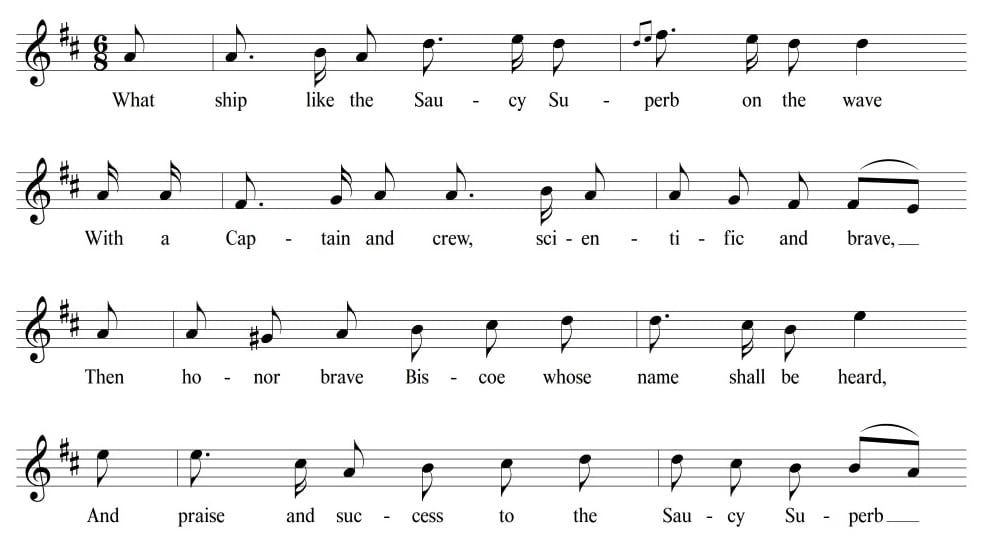
Sources:
"For the Courier" [? The Hobart Town courier]; unidentified original; ed. De Salis 1967, Two early colonials, 39-40
What ship like the Saucy Superb on the wave
With a Captain and crew, scientific and brave,
Then honor brave Biscoe whose name shall be heard,
And praise and success to the Saucy Superb.
Oh! proud is the port that she hails from I ween
In that fair happy land of our Lady the Queen.
But prouder are we, who traversed the world
Till the far of South Sea saw our canvas unfurled.
The fill up the can lads and toast it with me
Here's the Saucy Superb in the Port or at seas
And of all jolly messmates who hear aft the bell
Here's the bold, rough and ready, a health to Reynall [? Reynaull].
But Italian or Lachards from catheads to stern
Mates, Master, or men have no sea craft to learn.
Then here's to brave Bisco whose praise shall be heard
With the fame and the name of the Saucy Superb.
Music concordances:
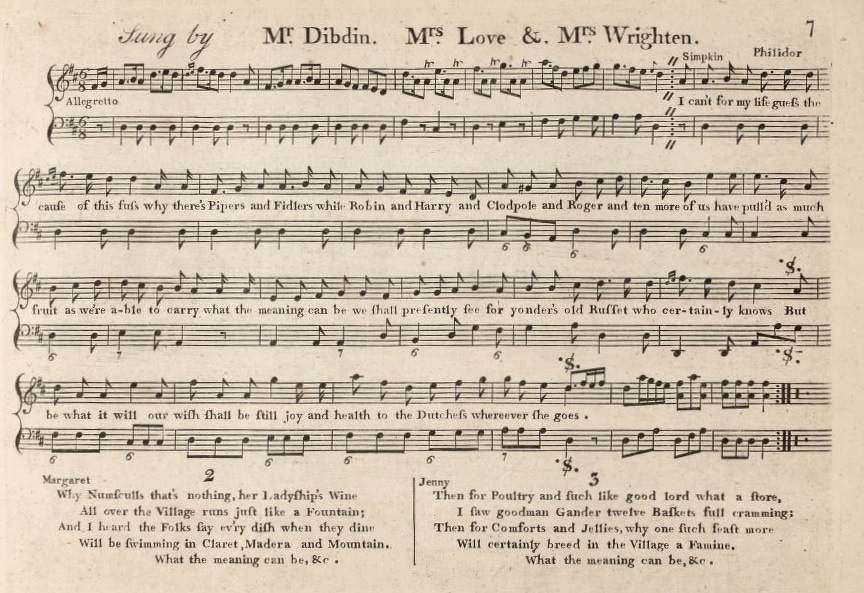
Air, Act 1, scene 1, "I can't for the life guess the cause of this fuss ... Joy and health to the Duchess, wherever she goes" [by Philidor], in The songs &c in The deserter, a musical drama as perform'd with universal applause, at the Theatre Royal in Drury Lane, composed by Messrs. Monsigny, Philidor, & Dibdin (London: Printed for John Johnston & Longman, Lukey, & Co. [? 1773]), 7
https://archive.org/stream/songscindeserter00dibd#page/7/mode/2up (DIGITISED)
References:
"GEOGRAPHICAL SOCIETY", The gentleman's magazine (July 1833), 59
https://books.google.com.au/books?id=CnSrSlq_ckcC&pg=PA59 (DIGITISED)
TROVE items tagged John Biscoe 1794-1843:
https://trove.nla.gov.au/search?l-publictag=John+Biscoe+1794-1843 (TROVE tagged by Australharmony)
https://nla.gov.au/nla.party-1465462 (NLA persistent identifier)
[Advertisement], The Austral-Asiatic Review, Tasmanian and Australian Advertiser (21 October 1842), 2
http://nla.gov.au/nla.news-article232480756
To the Public. THE CHARITABLE DONATIONS of the public are earnestly solicited on behalf of Captain John Biscoe, late of the Marian Watson, and formerly of the schooner Tula, of about 120 tons, in which vessel, accompanied by the cutter Lively, of forty-six tons only, he explored the Southern Regions, generally, for the space of three years; whose unexampled intrepidity on that occasion, in the search of scientific knowledge, is admitted by public testimonials from the British and foreign governments, and whose tract is marked on the present Admiralty charts; the hardships and privations of that voyage gave a blow to his constitution, which, after a long series of illness, has at last incapacitated him from following his profession. His friends now seek the means to enable him to return with his family to England, and confidently appeal to the benevolence of the Van Diemen's Land public to effect it . . .
De Salis 1967, Two early colonials, 39-40
Graeme Skinner, "The invention of Australian music", Musicology Australia 37/2 (December 2015), 300-01
https://sydney.edu.au/paradisec/australharmony/medialocal/skinner-2015-the-invention-of-australian-music.pdf (ONSITE DOWNLOAD)
"John Biscoe", Wikipedia
https://en.wikipedia.org/wiki/John_Biscoe (ONLINE)
1838 - Songs of an exile no. 2 - She was - yet have I oft denied (tune: I stood amid the glittering throng)
Commentary:
Number 2 of the Songs of an exile, "She was - yet have I oft denied" (1838) is "adapted to the music" of Henry Bishop's concert song I stood amid the glittering throng (1831). Dunlop's terminology here - "music" rather than "air" - perhaps indicates that she had in mind not just appropriating the melody, but also Bishop's piano accompaniment, to be performed from printed sheet music or a manuscript copy she owned or had access to. Is a manuscript copy more likely, given that she (or the copyist) mis-remembered the title slightly - "among" rather than "amid"?
Sources:
"SONGS OF AN EXILE - (No. 2)", The Australian (22 November 1838), 3
http://nla.gov.au/nla.news-article36860702
SONGS OF AN EXILE - (No. 2)
Adapted to the music of I stood among [sic] the glittering throng.
SHE WAS - yet have I oft denied,
Veiling the secret in my heart,
SHE was my dearest - my pride:
For whom those bitter tear drops start,
Now happy voices fill mine ear
And dancing footsteps throng around -
Yet hers amid them all I hear!
A sound of music from the ground.
Still, MY lorn spirit, seeks the clay,
Where her young limbs in darkness rest -
While her's, in light of endless day,
Reposes on a Saviour's breast.
E. H. DUNLOP.
"Songs of an Exile, No. 2", Bent's News and Tasmanian Register (21 December 1838), 4
http://nla.gov.au/nla.news-article233325817
Music concordances:
I stood amid the glitt'ring throng (ballad, London, 1831); words Frederick William Naylor Bayley (1808-1853); music Henry Rowley Bishop (1786-1855)
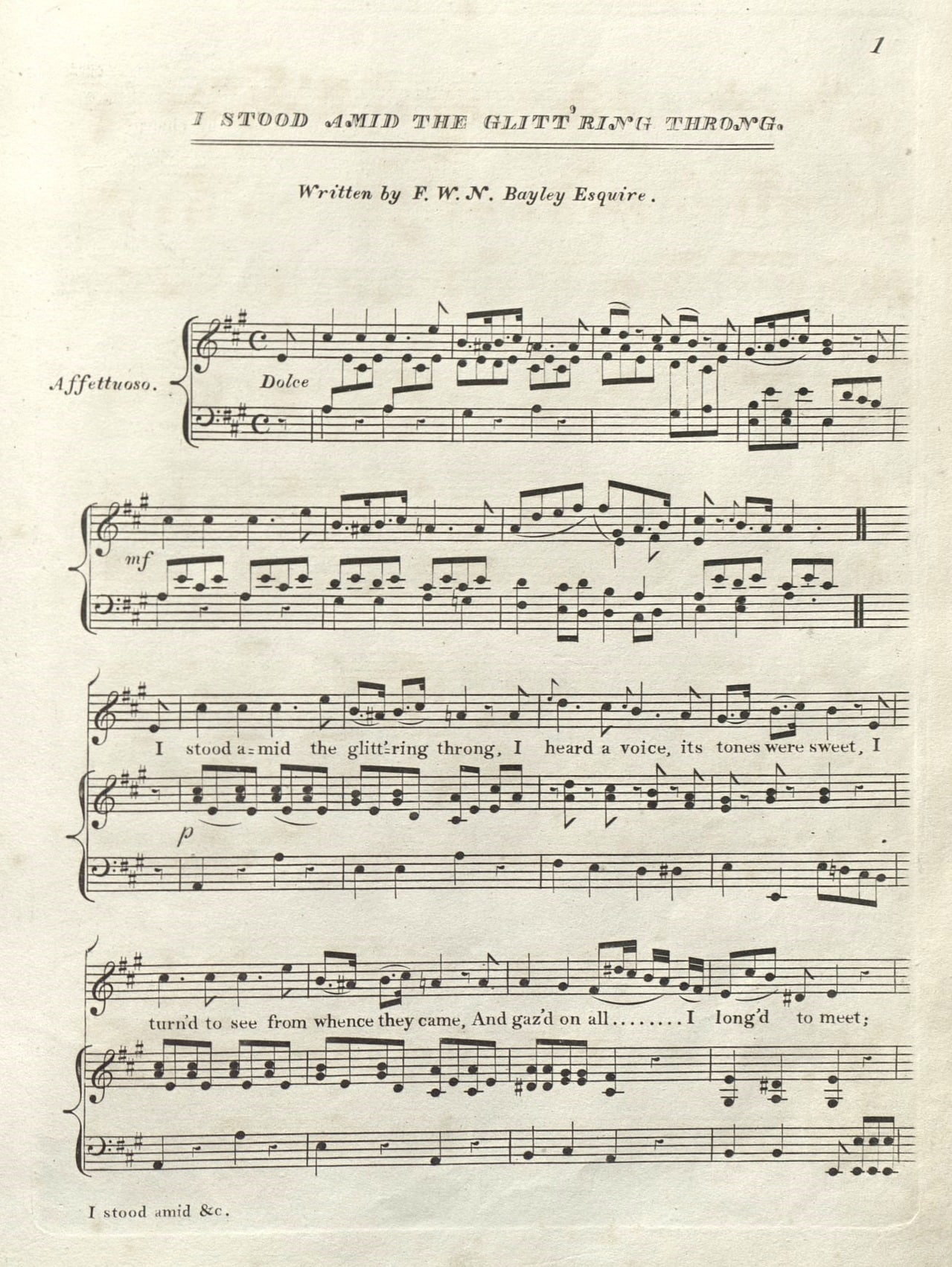
I stood amid the glittering throng, a ballad, the poetry by F. W. H. Bayley esq., the music by H. R. Bishop, sung by Madame Vestris, Mrs. Wood, Miss Inverarity, Miss Somerville and Miss H. Cawse . . . fourth edition (London: Goulding and D'Almaine, [1831])
https://archive.org/stream/hartley00535542#page/n78/mode/1up (DIGITISED)
I stood amid the glittering throng, a ballad written by F. W. H. Bayley esq., composed by H. R. Bishop (New York: Bourne Depository of Arts, [n.d.])
https://dc.lib.unc.edu/cdm/ref/collection/sheetmusic/id/19398 (DIGITISED)
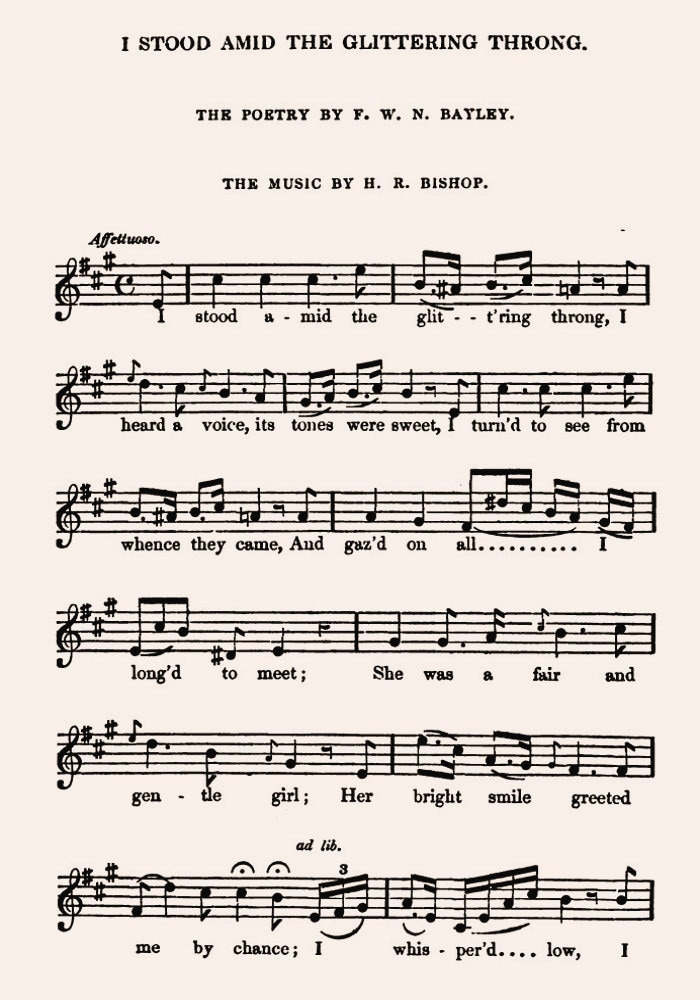
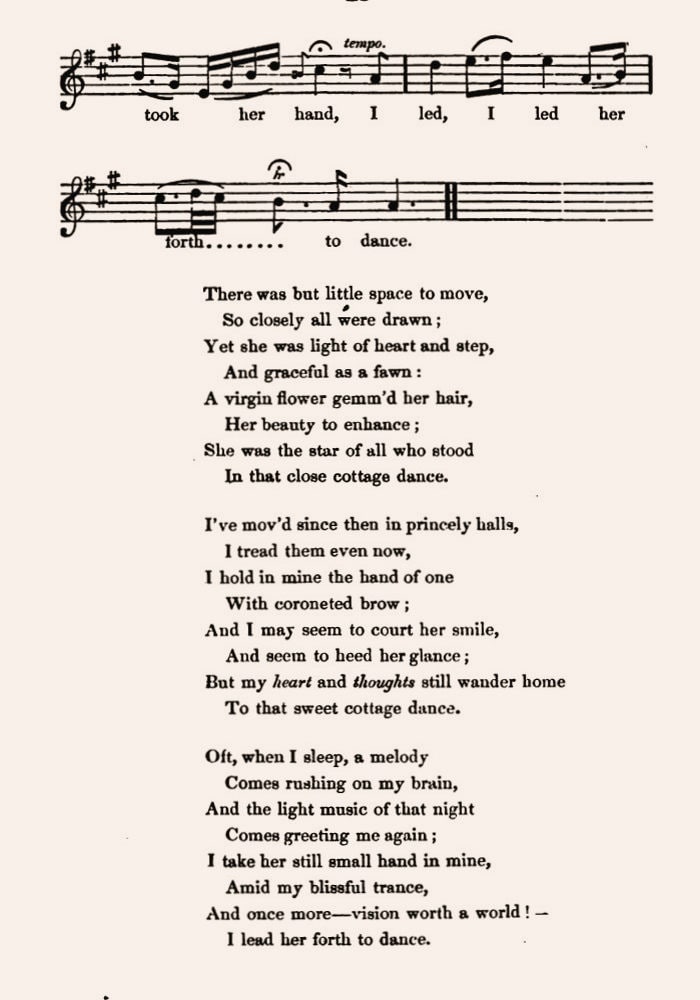
The musical gem, a collection of modern and favourite songs, duets, and glees, selected from the works of the most celebrated composers, adapted for the voice, flute, or violin, three volumes in one . . . 3. Flowers of song (London: Henry G. Bohn, 1845), 22-23
https://books.google.com.au/books?id=nd-679FOeGcC&pg=RA2-PA22 (DIGITISED)
References:
"SONG", Morning Advertiser [London] (19 May 1831), 2
"I STOOD AMID THE GLITTRING THRONG." BY F. W. N. BAYLEY, ESQ.
This Song, which is the same that created so great a sensation at the evening Concert of Lady --- but a few nights past, is set to one of the most touching and plaintive melodies composed by Bishop, who appears to have exerted more than his usual talent in giving effect to a ballad, which, like "Oh no we never mention her," has been, we are told, the result of feeling on the part of its author. Mr. B. said to have written it on his return from a soirée near Portman-square, after gallopading with a certain illustrious person in the exclusive coterie; and the young lady alluded to is supposed to be the lovely and amiable recluse of a cottage orné, in the vicinity of Cheltenham. Madame Vestris, Miss Inverarity, Mrs. Wood, Mrs. Waylett, Miss Sommerville, and Miss H. Cawse, are the ladies, by means of whose most sweet warbling it will make its debut before the public.
I stood amid the glittering throng - I heard a voice - it's tones were sweet! I turned to see from whence they came - And gazed on all I longed to meet. She was a fair and gentle girl! Her bright smile greeted me by chance I whispered low - I took her hand - I led her forth to dance! . . .
1838 - Songs of an exile no. 4, The Aboriginal mother - Oh! hush thee - hush my baby [1] (Tune: 'Twas when the seas were roaring)
Commentary:
Dunlop's best known and most discussed lyric, The Aboriginal mother, was her response to what has become known as the Myall Creek massacre of 1838. It was first published, as fourth of the Exile series, in The Australian, on 13 December.
The massacre had occurred on 9 June, but only came to attention of the press and public with the beginning of the trials of the perpetrators in November. Amid a great public outcry, mainly in support of the eleven accused, the first trial for the murder of just one of the victims, held on 15 November, resulted in acquittal by a sympathetic jury. At the second trial, on further charges, which ran from 26 to 29 November, a guilty verdict was achieved, and on 5 December the sentence of death was passed on the prisoners. Seven of the perpetrators were duly executed on 18 December, though, as a result of public hostility toward the sentences, the remaining prisoners were set free.
Whether David Dunlop, as a stipendiary magistrate, knew anything of the case or the impending trials, earlier than November, is not known (his opposite number at Scone, Edward Denny Day, was first alerted to the atrocities in July; although the high level of secrecy surrounding the early stages of the investigation suggests perhaps not. Allowing several days for the newspaper reports of the first trial to reach them from Sydney, the Dunlops may only became aware of event in detail toward the end of November.
Apart from this single appearance of the lyric itself, there is no other documentation, so far discovered, linking the Dunlops in any way with the original public controversy following the massacre and executions. No public reply to it, or private comment upon it, has so far been identified, which is hardly surprising, given the sheer amount of commentary surrounding the executions of the convicted perpetrators, on 18 December, five days after the song appeared. Dunlop's public intervention was both unique and brave. Although she signed it simply "E. H. D.", many well-informed readers and no doubt most interested journalists were well aware that the author was the wife of David Dunlop, the troubled police magistrate at Penrith. But if they said little or nothing at the time, at least some of those who objected to Dunlop's characterisation of the event conceivably had good enough memories to hold it against her in future.
As Dunlop later informed Isaac Nathan, she originally "wrote" her new verses "for" the tune of "Twas when the seas were roaring". Handel's melody is generally thought to have been associated with the original lyrics from their first appearance in John Gay's The what d'ye call it? (London, 1715). The music and words were first published separately c. 1725, later also being also known as The faithful maid and The melancholy nymph. The tune was also used in Gay's The beggar's opera, and a simplified variant republished as Air 28 in the second of the two original 1728 editions.
Words and melody edition (first verse only underlaid):
"The Aboriginal mother" (Dunlop 1838): tune: The melancholy nymph (Handel 1715; from 1770 edition)
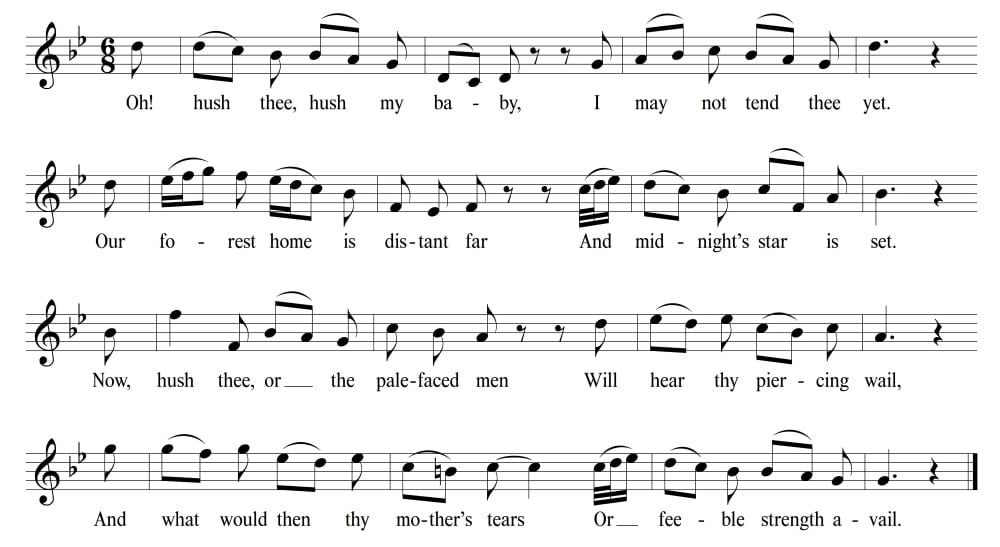
Synthesised sound file, Australharmony 2018
Sources:
"SONGS OF AN EXILE (No. 4)", The Australian (13 December 1838), 4
http://nla.gov.au/nla.news-article36861275
SONGS OF AN EXILE (No. 4)
THE ABORIGINAL MOTHER, (FROM MYALL'S CREEK.)
Oh! hush thee - hush my baby,
I may not tend thee yet.
Our forest home is distant far,
And midnight's star is set.
Now, hush thee - or the pale-faced men
Will hear thy piercing wail,
And what would then thy mother's tears
Or feeble strength avail!
Oh, could'st thy little bosom,
That mother's torture feel,
Or could'st thy know thy father lies
Struck down by English steel;
Thy tender form would wither,
Like the kniven in the sand,
And the spirit of my perished tribe
Would vanish from our land.
For thy young life my precious,
I fly the field of blood,
Else had I, for my chieftain's sake,
Defied them where they stood;
But basely bound my woman's arm,
No weapon might it wield:
I could but cling round him I loved,
To make my heart a shield.
I saw my firstborn treasure
Lie headless at my feet,
The goro on this hapless breast,
In his life-stream is wet!
And thou! I snatched thee from thy sword,
It harmless passed by thee!
But clave the binding cords - and gave,
Haply, the power to flee.
To flee! My babe - but wither?
Without my friend - my guide?
The blood that was our strength is shed!
He is not by my side!
Thy sire! oh! never, never
Shall Toon Bakra hear our cry:
My bold and stately mountain-bird!
I thought not he could die.
Now who will teach thee, dearest,
To poise the shield and spear,
To wield the koopin, or to throw
The boommering, void of fear;
To breast the river in its might;
The mountain tracks to tread?
The echoes of my homeless heart
Reply - the dead, the dead!
And ever must the murmur
Like an ocean torrent flow:
The parted voice comes never back,
To cheer our lonely woe:
Even in the region of our tribe,
Beside our summer streams,
'Tis but a hollow symphony -
In the shadow-land of dreams.
Oh hush thee, dear - for weary
And faint I bear thee on -
His name is on thy gentle lips,
My child, my child, he's gone!
Gone o'er the golden fields that lie
Beyond the rolling clouds,
To bring thy people's murder cry
Before the Christian's God.
Yes! o'er the stars that guide us,
He brings my slaughter'd boy:
To shew their God how treacherously
The stranger men destroy;
To tell how hands in friendship pledged
Piled high the fatal pyre;
To tell, to tell of the gloomy ridge!
And the stockmen's human fire.
E. H. D.
The vase (with explanatory note)
http://digital.sl.nsw.gov.au/delivery/DeliveryManagerServlet?dps_pid=FL9674294 (DIGITISED)
Documentation:
Letter draft, Eliza Hamilton Dunlop, Wollombi, NSW, undated (before October 1841) to Isaac Nathan, Sydney; unidentified original, transcribed in De Salis papers (also incomplete ed. in De Salis 1967, Two early colonials, 101-02)
. . . I wrote the Aboriginal Mother for the air, "When the seas were roaring". The massacre it commemorates took place a short period after my arrival in the Colony . . .
Music concordances:
The melancholy nymph; words John Gay (1685-1732), in The what d'ye call it, London, 1715; music George Frederick Handel (1685-1759)
The what d'ye call it, a tragi-comi-pastoral farce, as it is acted at the Theatre Royal in Drury Lane, by Mr. Gay . . . the third edition (London: Bernard Lintot, 1716), 32-34 (act 2, scene 8)
https://books.google.com.au/books?id=iI9bAAAAQAAJ&pg=PA32
'TWAS when the seas were roaring
With hollow blasts of wind;
A damsel lay deploring,
All on a rock reclin'd.
Wide o'er the rolling billows
She cast a wistful look;
Her head was crowned with willows
That tremble o'er the brook . . .
The musical miscellany; being a collection of choice songs, set to the violin and flute, by the most eminent masters . . . volume the second (London: John Watts, 1729), 94-96
https://books.google.com.au/books?id=sZ5EAQAAMAAJ&pg=PA94
The beggar's opera, as it is acted at the Theatre-Royal in Lincolns-Inn Fields . . . the second edition, to which is added the overtire in score, and the musick prefix'd to each son (London: John Watts, 1728), 26
https://books.google.com.au/books?id=W9UNAAAAQAAJ&pg=PA36 (DIGITISED)
The beggar's opera, as it is acted at the Theatre-Royal in Lincolns-Inn Fields . . . the third edition, with . . . the songs, and the basses, (. . . compos'd by Dr. Pepusch) curiously engrav'd on copper plates (London: John Watts, 1729), [tune appendix] 24-25
https://archive.org/details/beggarsoperaasit00pepu/page/24 (DIGITISED)
!['Twas when the sea was roaring [sic] (The beggar's opera, 4th edn. 1735, 26)](imageslocal/handel-twas-when-the-sea-beggars-opera.jpg)
The beggar's opera, as it is acted at the Theatre-Royal in Lincolns-Inn Fields . . . the fourth edition; to which is added the music prefix'd to each song (London: John Watts, 1735), 36 (act 2, scene 9, air 28)
https://gallica.bnf.fr/ark:/12148/btv1b8572257b/f54 (DIGITISED)
https://imslp.org/wiki/Special:ReverseLookup/317005 (DIGITISED)
"The melancholly nymph" [unattributed], The musical entertainer engrav'd by George Bickham, jun'r, vol. 1 (London: George Bickam, [serialised 1736-39; 1740]), 53
https://archive.org/stream/musicalentertain00bick#page/n119/mode/2up (DIGITISED)
"The melancholly nymph, set by Mr. Handle" [sic], Universal harmony; or, The gentleman and ladies' social companion . . . (London: J. Newberry, 1746)
https://books.google.com.au/books?id=KHvhfxLAnm0C&pg=PP113
![The melancholy nymph, set by Mr. Handel (London: R. Falkener, [? 1770s])](imageslocal/handel-melancholy-nymph.jpg)
The melancholy nymph, set by Mr. Handel (London: R. Falkener, [? 1770s])
http://www.worldcat.org/oclc/642512492
A select collection of English songs, in three volumes, volume the third (London: J. Johnson, 1783), [45]
https://books.google.com.au/books?id=MIM-AQAAMAAJ&pg=PP45 (DIGITISED)
HANDEL: 'Twas when the Seas were roaring (HWV 228:19); Patrizia Kwella, The Academy of Ancient Music, Christopher Hogwood
https://www.youtube.com/watch?v=xhqkxWm0STo (STREAMED)
HANDEL: 'Twas when the Seas were roaring (The melancholy nymph) (HWV 228:19); The Brook Street Band (Nicki Kennedy; Sally Bruce-Payne)
https://www.youtube.com/watch?v=_KqyXaj4YX0 (STREAMED)
References (Dunlop):
De Salis 1967, 101-02
References (Myall Creek massacre):
R. v. Kilmeister (No. 1) [chief justice James Dowling, 15 November 1838], NSW, Supreme Court 105; Macquarie Law School (court reports from the Sydney press):
http://www.law.mq.edu.au/research/colonial_case_law/nsw/cases/case_index/1838/r_v_kilmeister1
R. v. Kilmeister (No. 2) [justice William Burton, 26 November 1838] NSW, Supreme Court 110; Macquarie Law School (court reports from the Sydney press):
http://www.law.mq.edu.au/research/colonial_case_law/nsw/cases/case_index/1838/r_v_kilmeister2
References (source song):
Charles B. Teske, "Gay's ''Twas when the seas were roaring' and the rise of pathetic balladry", Anglia - Zeitschrift für englische Philologie 83 (1965), 411-25
https://doi.org/10.1515/angl.1965.1965.83.411 (DIGITISED)
1839 - Songs of an exile no. 5 - The Irish mother - Your eyes have the twin-star's light, ma croidhe (Tune: The foggy dew)
Commentary:
This is the first of two lyrics from the Songs of an exile series for which Dunlop nominated tunes anthologised by Bunting (the other is no. 8, I bless thy shores). However, Bunting did not print a version of this tune, Foggy dew, until 1840, two years after Dunlop's new lyric for it appeared as The Irish mother ("Your eyes have the twin-star's light") (1838), no. 5 of the Songs of an exile. Bunting's is, nevertheless, the earliest accessible printed source of any tune with the title, and his major-key melody is almost certainly closer to that which Dunlop knew than any of the later and better known minor-mode versions.
Another tune, whose family similarity to Bunting's tune is often cited (following Cazden et al 1982), is the "old Irish melody" (otherwise un-named) for which the poet William Kennedy wrote the new lyric, "Och! while I live I'll ne'er forget", published in 1827 under the title The Irish emigrant by Robert Smith (see Smith 1827); however, there is no evidence that it circulated under the title Foggy dew. See Norman Cazden, Herbert Haufrecht, and Norman Studer (eds), Folk songs of the Catskills (Albany: State University of New York Press, 1982), 286
https://books.google.com.au/books?id=1ZKis4hmioIC&pg=PA286 (PREVIEW)
Words and melody edition (first verse only underlaid):
"Your eyes have the twin-star's light, ma croidhe" (Dunlop 1839); tune: The foggy-dew (Bunting 3-1840, in A flat, here transposed down a minor third into F)
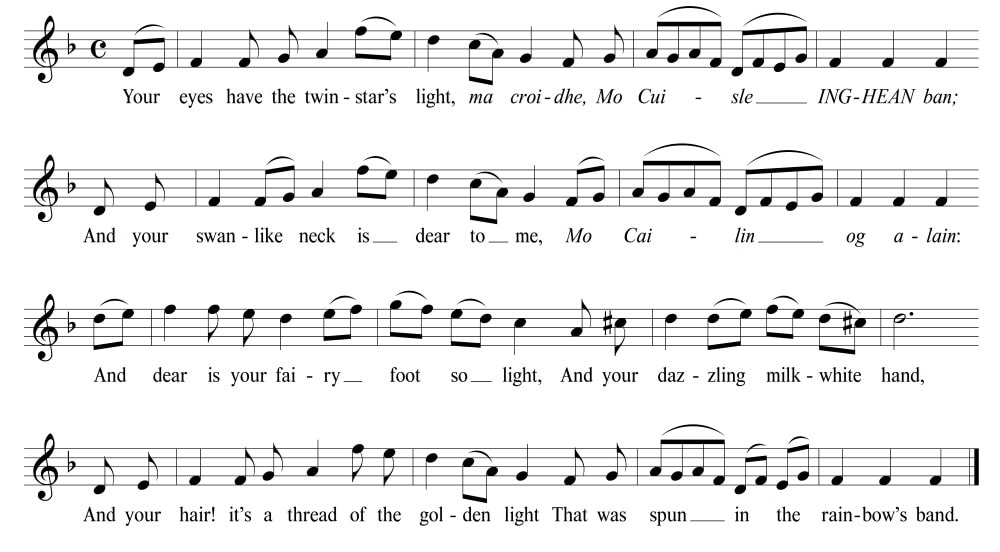
Synthesised sound file, Australharmony 2018
Sources:
"SONGS OF AN EXILE - (No. 5)", The Australian (12 January 1839), 4
http://nla.gov.au/nla.news-article36862585
SONGS OF AN EXILE. - (No. 5.)
THE IRISH MOTHER.
Air, "the foggy-dew."
Your eyes have the twin-star's light, ma croidhe,
Mo Cuisle INGHEAN ban;
And your swan-like neck is dear to me,
Mo Cailin og alain:
And dear is your fairy foot so light,
And your dazzling milk-white hand,
And your hair! it's a thread of the golden light
That was spun in the rainbow's band.
"Oh! green be the fields" of my native shore,
Where you bloom, like a young rose-tree;
Mo VARIA astore - we meet no more!
But the pulse of my heart's with thee.
No more may your voice with its silver sound,
Come, like music in a dream!
Or your heart's sweet laugh, ring merrily round,
Like the gush of the summer's stream.
Oh! Mo VARIA, the stately halls are high
Where ERIN's splendors shine!
Yet their hearts shall swell to the wailing cry
That my heart sends forth to thine.
For an Exile's heart is fountain deep,
Far hid from the gladsome sun -
Where the bosom's yearning ne'er may sleep:
Mo thruaidh! Mo chreach! Och on!
E. H. D. November 30, 1838.
The last line is the Irish-ery of a broken heart, of which there can be no adequate translation. The name Varia, is MARY. The other Irish words are expressions of fondness for which the English tongue offers no sounds half so tender.
The vase ("The Irish nurse, to a foster child - Air 'The foggy dew'")
http://digital.sl.nsw.gov.au/delivery/DeliveryManagerServlet?dps_pid=FL9674356 (DIGITISED)
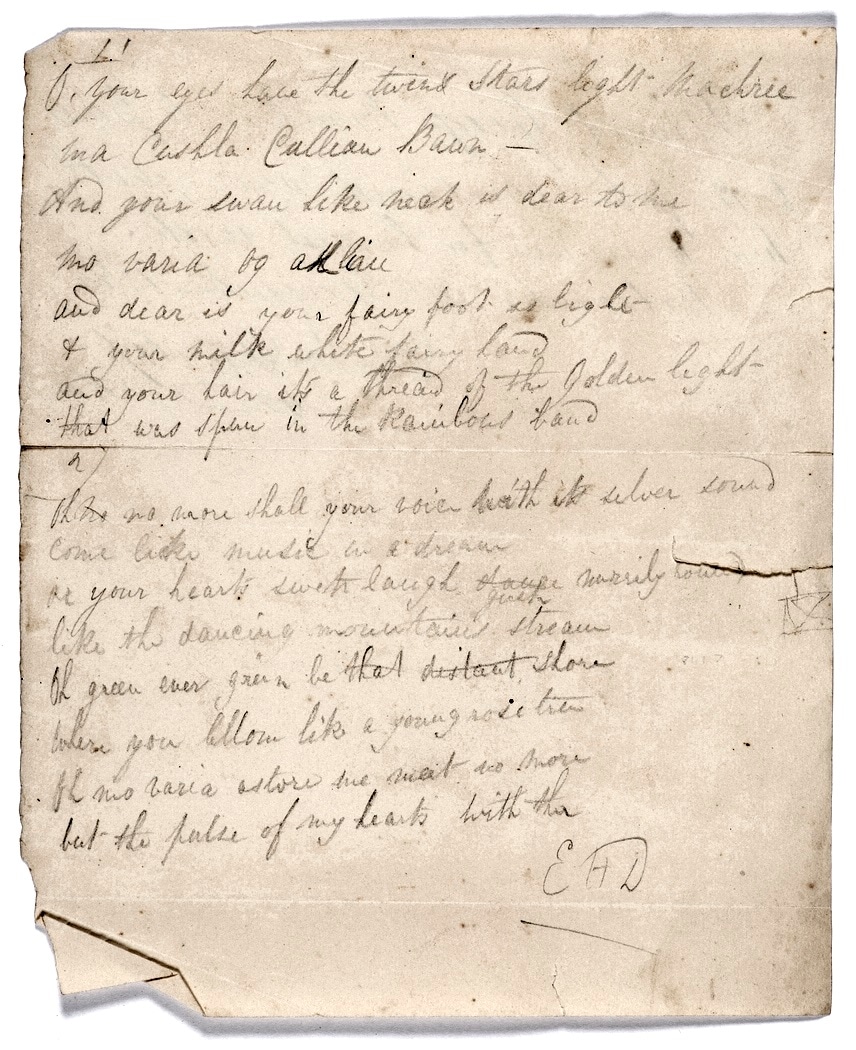
See also draft (? revision draft), among David Dunlop correspondence &c., Milsom papers, State Library of New South Wales
http://digital.sl.nsw.gov.au/delivery/DeliveryManagerServlet?dps_pid=FL4385971 (DIGITISED)
Charles Gavan Duffy (ed.), The ballad poetry of Ireland (Dublin: James Duffy, 1869), 78-79
https://archive.org/details/irelandpoetry00duffrich/page/78 (DIGITISED)
THE EMIGRANT MOTHER [sic]
[I found this touching little ballad in an Australian newspaper, long before I contemplated visiting that country, and was charmed with its fresh feeling and grace. I have not been able to discover the writer's name. 1866.]
YOUR eyes have the twin stars' light, ma croidhe
Mo cuisle Inghean ban; [My pulse, my white daughter]
And your swan-like neck is dear to me,
Mo caillin og alain:
And dear is your fairy foot so light,
And your dazzling milk-white hand,
And your hair! it's a thread of the golden light
That was spun in the rainbow's band.
Oh! green be the fields of my native shore,
Where you bloom like a young rose-tree;
Mo varia astore - we meet no more!
But the pulse of my heart's with thee.
No more may your voice with its silver sound,
Come like music in a dream!
Or your heart's sweet laugh ring merrily round,
Like the gush of the summer's stream.
Oh! mo varia, the stately halls are high
Where Erin's splendours shine!
Yet their hearts shall swell to the wailing cry
That my heart sends forth to thine.
For an exile's heart is fountain deep,
Far hid from the gladsome sun -
Where the bosom's yearning ne'er may sleep;
Mo thruaidh! mo chreach! och on! [My pity! my plunder! och on!]
Music concordances:
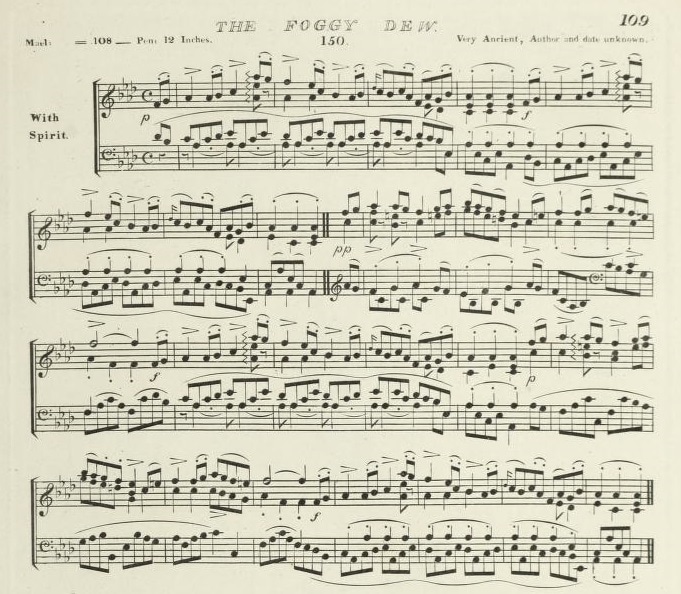
Bunting 3-1840, 109
https://archive.org/stream/ancientmusicofir00bunt#page/109/mode/1up
The foggy dew (major key version, Bunting); eitiltdireach (2012)
https://www.youtube.com/watch?v=WXJdv1Ekle0
References:
- - -
1839 - Song lyric in Stories of an exile (The ford of Emu Plains) - . . . The castle of Richmond stands fair on the hill . . . [Walter Scott] (Tune: Allen-a-dale)
Commentary:
The national music of Scotland also clearly formed a part of Dunlop's self-identification. This derived partly from the Scottish heritage of both the Hamiltons and Dunlops, and, more widely, of the (especially northern) Irish protestant community. In the early colonial context, English, Irish and Scottish settlers shared national songs not only to signify heritage, but also as instruments of community harmony. Upper class men did so in the careful rotation of representative national tunes as toast songs at public men's dinners. As for song-sharing among rural workers, Dunlop's short piece of prose-fiction, "The ford of the Emu Plains" (1839), is probably not far from actual experience of early colonial song, in its portrayal of a pair of ethnic stock characters, Scottish Sandy bringing up his team of bullocks singing a verse of Walter Scott's "Allen-a-dale", to the tearful approbation of his mate, Irish Olney:
. . . This; as the second team came forward, gave place to the mellow notes of Sandy's clear voice, in one of Scott's sweet Ballads -
"The castle of Richmond stands fair on the hill,
My Hall" quoth bold Allan "shows gallanter still;
'Tis the blue vault of heaven with it's crescent so pale,
And with all its bright spangles!" said Allan-a-dale.
'Troth an Sandy comrade I dunna, but that song purty as it is, makes my heart come into my eyes . . .
The first appearance of Scott's lyric "Allen-a-Dale has no fagot for burning" in Rokeby (1813) was almost instantly furnished with composed settings by, among others, John Clarke, John Parry, William Russell, and, most famously, Joseph Mazzinghi, whose melody - from a whole set of Rokeby settings - was that most widely disseminated.
Sources:
"Stories of an Exile. No 1", The Sydney Monitor and Commercial Advertiser (29 May 1839), 4
http://nla.gov.au/nla.news-article32164282
THE FORD OF THE EMU PLAINS . . .
. . . This; as the second team came forward, gave place to the mellow notes of Sandy's clear voice, in one of Scott's sweet Ballads--
'The castle of Richmond stands fair on the hill,
My Hall 'quoth bold Allan' shows gallanter still;
'Tis the blue vault of heaven with it's crescent so pale,
And with all its bright spangles!' said Allan-a-dale.
'Troth an Sandy comrade I dunna, but that song purty as it is, makes my heart come into my eyes . . .
See also conclusion, "Stories of an Exile" [2], The Sydney Monitor and Commercial Advertiser (31 May 1839), 3
http://nla.gov.au/nla.news-article32164301
Music concordances:
Allen-a-dale; words from Rokeby (1813) by Walter Scott (1771-1832); music by Joseph Mazzinghi (1765-1844)
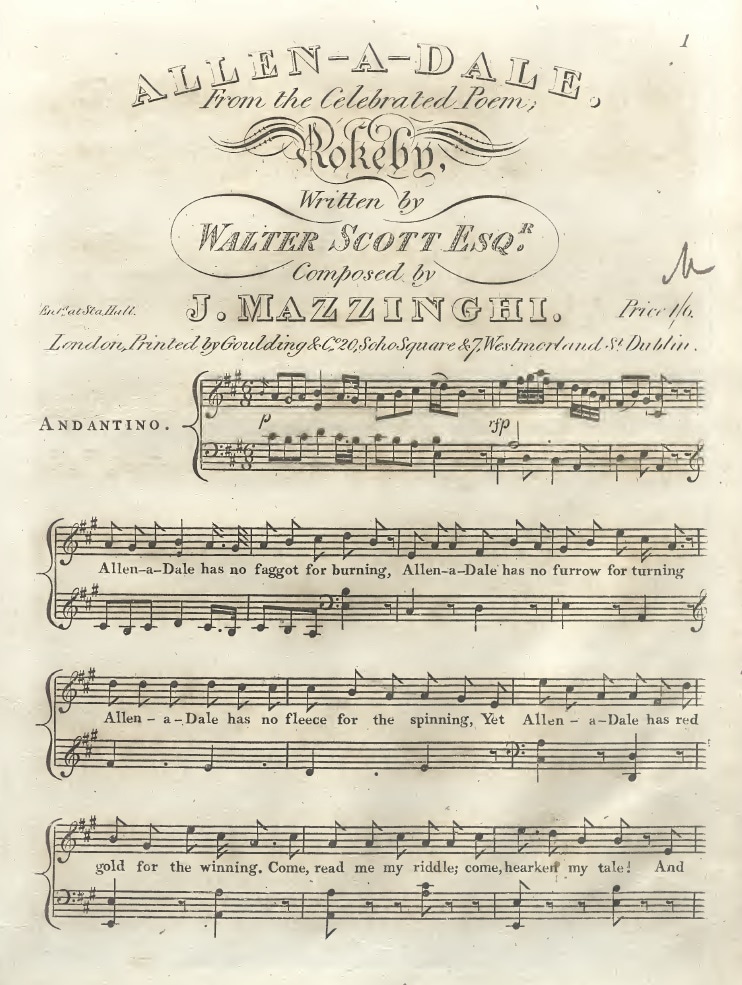
Allen-a-Dale, from the celebrated poem Rokeby, written by Walter Scott esq., composed by J. Mazzinghi (London: Goulding & Co., [1813])
https://archive.org/details/hartley00535537/page/n165 (DIGITISED)
https://imslp.org/wiki/Special:ReverseLookup/421062 (DIGITISED)
References:
Walter Scott, Rokeby, a poem (Edinburgh: John Ballantyne & Co., 1813), 146-48
https://books.google.com.au/books?id=N004AAAAIAAJ&pg=PA146 (DIGITISED)
https://archive.org/details/rokebypoem00scotrich/page/146 (DIGITISED)
Louisa M. Middleton, "Mazzinghi, Joseph", Dictionary of national biography (1885-1900), volume 37, 177-78
https://en.wikisource.org/wiki/Mazzinghi,_Joseph_(DNB00) (DIGITISED)
De Salis 1967, 68
1840 - Songs of an exile no. 7 - Oh! the limpid streams of my own green land ("for music")
Commentary:
The seventh of her published Songs of an exile series was one of the few lyrics that Dunlop specifically designated as "stanzas for music". Whether this was because she was actively canvassing the interest of the colony's song composers (in April 1840, there were hardly any), or because she herself had so far been unable to find a pre-existing tune to suit it, we can't know for sure. But, in either case, imagining a strophic tune to fit her words was not a straightforward task. The odd repeat of the first line, and the irregular scansion (the feet variably two, three or four syllables) would probably have been enough to put off some composers, had there been any available (like William Vincent Wallace a few years earlier, or Isaac Nathan and Stephen Hale Marsh a year or so later). So too, perhaps, the gist of her argument. An exile's nostalgia for lost homelands was, of itself, an acceptable, even normal, colonial proposition. But what was such a song's likely audience to make of a local production so wary of the colony's merits and advantages?
Like much of Dunlop's published work, some other songs included, this lyric's immediate appeal was probably more to readers in private, than singers in public. Nevertheless, there were Irish tunes to which a persevering singer might have fitted these lyrics at a pinch.
For instance: The brown maid, Bunting 1-1796, no. 32, page 18
https://archive.org/details/generalcollectio00bunt/page/18 (DIGITISED)
And Oh let me hush (Carolan), Owenson 1805, 20
https://books.google.com.au/books?id=VuvZ714xkNcC&pg=PA20 (DIGITISED)
Sources:
"SONGS OF AN EXILE - (No. 7)", The Australian (11 April 1840), 4
http://nla.gov.au/nla.news-article36862149
SONGS OF AN EXILE - (No. 7.)
BY E. H. D. (FOR MUSIC).
Oh! the limpid streams of my own green land!
Oh! the limpid streams of my own green land!
Wo! wo, the Exile's cheek, and the Exile's parched hand
As she calls upon the rivers of her far off land.
There is fever in the pulse - a deep and restless eye -
A cold and pallid brow - but the cheek is flushed so dry.
She reclines in citron groves, by the south's soft breathings fanned,
Yet sighs o'er all the parted, in her own green land.
Away! these clustering grapes and olives ripening round,
For the cloudless sky is brass, and she treads on iron ground;
The bright Azelia blushes on its bed of burning sand,
But, oh ! the brook that gushes, in her own green land.
Proud aloes top her home, with their many branching flowers,
And birds of loveliest plumage are flitting o'er her bowers,
But the viper-fang is piercing - where no human eye hath scanned,
And the Exile's heart must wither - from her own green land.
Government House, Emu-plains,
New South Wales, 17 March, 1840.
"SONG OF AN EXILE", Empire (24 December1862), 4
http://nla.gov.au/nla.news-article60520671
The vase ("My own green land")
http://digital.sl.nsw.gov.au/delivery/DeliveryManagerServlet?dps_pid=FL9674297 (DIGITISED)
Documentation:
Letter draft, Eliza Hamilton Dunlop, Wollombi, NSW, undated (before October 1841) to Isaac Nathan, Sydney; unidentified original, transcribed in De Salis papers (also incomplete ed. in De Salis 1967, Two early colonials, 101-02)
"I bless thy shores my native land" and "Oh the limpid streams" [+]
[+] Were intended to be introduced in a Drama (the Cousins of Aledo) which I have arranged for the stage from Mary Mitford's "Blanch", and which as it has not been seen by any individual with the exception of Lady Gipps, I will if you give permission submit for your opinion.
References:
- - -
1840 - Songs of an exile no. 8 - I bless thy shores, my native land (Tune: Peggy Ban [ Barn / Bawn ])
Commentary:
Dunlop nominated two tunes anthologised by Bunting for lyrics in her first colonial series, Songs of an exile.
In no. 8, I bless thy shores, my native land (1840), the new lyrics are a stylish, if doleful, fit for Peggy ban (also barn/bawn) as Bunting gave it in 1809, probably anyway the only Irish printed iteration of the tune that Dunlop is likely to either have had in mind, or in a copy before her at Emu Plains.
Words and melody edition (first verse only underlaid):
"I bless thy shores, my native land" (Dunlop 1840); tune: Peggy Ban (Bunting 2-1809)
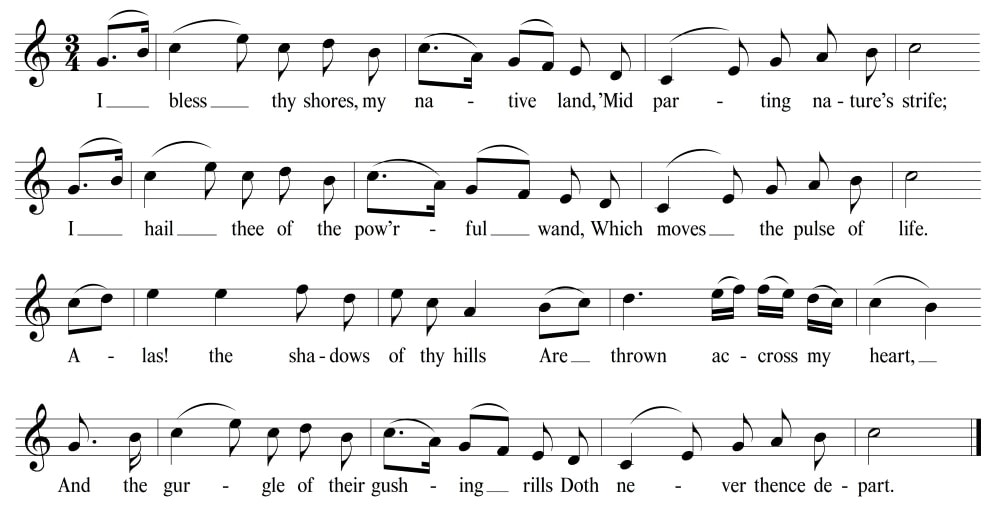
Synthesised sound file, Australharmony 2018
Sources:
"SONGS OF AN EXILE - No. 8", The Australian (7 May 1840), 2
http://nla.gov.au/nla.news-article36862754
SONGS OF AN EXILE. - No. 8.
Air - "PEGGY BARN."
I bless thy shores, my native land,
'Mid parting nature's strife;
I hail thee of the powerful wand,
Which moves the pulse of life.
Alas! the shadows of thy hills
Are thrown across my heart,
And the gurgle of their gushing rills
Doth never thence depart.
I know my household hearths are cold,
That my kindred's graves are green;
I know - I know the Church-yard mould
Tells where my race have been.
But organ peals are sounding there,
And Choral anthems swell
Where the holy voice of Christian prayer
Ascends with Sabbath-bell.
Oh! birthrights of my Island home,
What dreary lot is mine !
Unblest 'mid Austral wilds to roam,
A slave at Mammon's shrine!
What weary doom to count each link,
Whose rust is in my soul.
Thus woe life's phantoms; but to sink
Untimely at the goal.
Government House, Emu Plains, New South Wales.
The vase
http://digital.sl.nsw.gov.au/delivery/DeliveryManagerServlet?dps_pid=FL9674293 (DIGITISED)
Documentation:
Letter draft, Eliza Hamilton Dunlop, Wollombi, NSW, undated (before October 1841) to Isaac Nathan, Sydney; unidentified original, transcribed in De Salis papers (also incomplete ed. in De Salis 1967, Two early colonials, 101-02)
"I bless thy shores my native land" and "Oh the limpid streams" [+]
[+] Were intended to be introduced in a Drama (the Cousins of Aledo) which I have arranged for the stage from Mary Mitford's "Blanch", and which as it has not been seen by any individual with the exception of Lady Gipps, I will if you give permission submit for your opinion.
Music concordances:
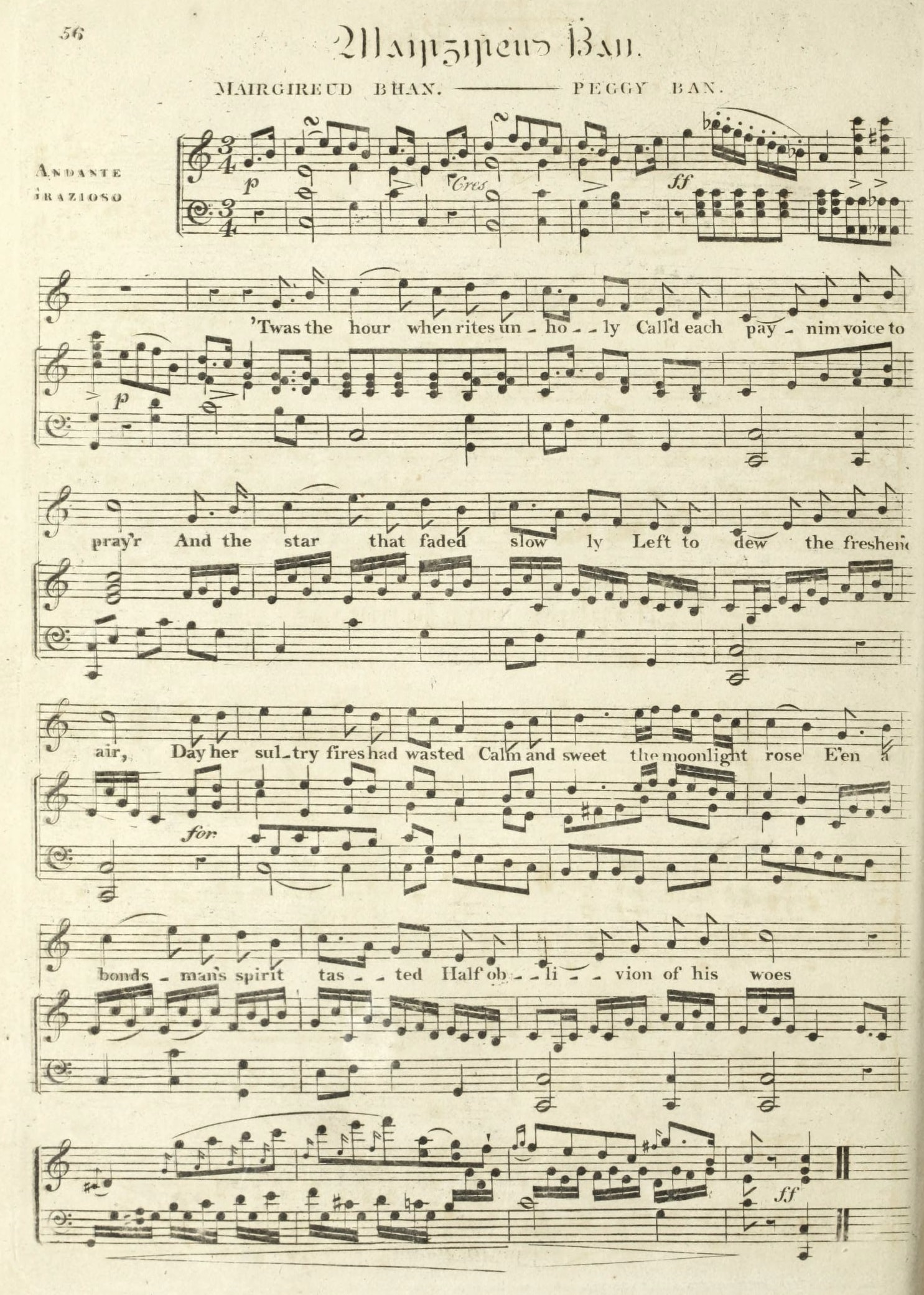
Bunting 2-1809, 56
https://archive.org/stream/generalcollectio00bunt_0#page/56/mode/2up (DIGITISED)
References:
"Peggy Bawn", Tune Archive
https://tunearch.org/wiki/Peggy_Bawn
https://tunearch.org/wiki/Annotation:Peggy_Bawn
c.1841 - Song lyrics in The cousins of Aledo
Commentary:
Dunlop's short historical verse drama, The cousins of Aledo, is preserved in a mid 20th-century typsecript copy in the State Library of New South Wales. It is a close reworking of the verse narrative Blanch, a poem in four cantos, first published in 1813, by Mary Russell Mitford (see plot summary of the Mitford from Saglia 1998 in references below).
The text as preserved includes two songs lyrics, both (as dramatised) with the singer accompanying him/herself on the guitar, and in both cases naming the tune to which they were to be sung.
Dunlop nominated "the Juaracha" as melody for the first song, probably, correctly the well-known "guaracha", or "Spanish dance", widely known from the arrangement in J. B. Cramer's piano method.
The tune of the second song is The birks of Invermay, previously popularised as adapted by the Thomas Linleys (senior and junior) for the song lyric How oft Louisa hast thou said in the ballad opera, The duenna (1775), by their respective son-, and brother-in-law Richard Brinsley Sheridan.
Possibly reflecting an earlier state of the treatment, Dunlop mentioned in her 1841 letter of introduction to Isaac Nathan, that I bless thy shores my native land and Oh the limpid streams, both published during 1840 in the Exile series, were also intended for The cousins of Aledo.
Source:
Typescript of The cousins of Aledo by E. H. Dunlop; Milson family - newscuttings and other miscellaneous material, 1880-1955; State Library of New South Wales, MLMSS 6011/4/2
http://archival.sl.nsw.gov.au/Details/archive/110060708 (DIGITISED)
The cousins of Aledo, dramatized from the poem of Miss M. Russell Mitford (copy) . . .
Song 1 (act 1 scene 2) Oh star of my hope in thy beauty appear (tune - The guaracha [sic])
Words and melody edition:
Oh Star of my hope, song in The cousins of Aledo (Dunlop); tune: The guaracha (Cramer, 1812)
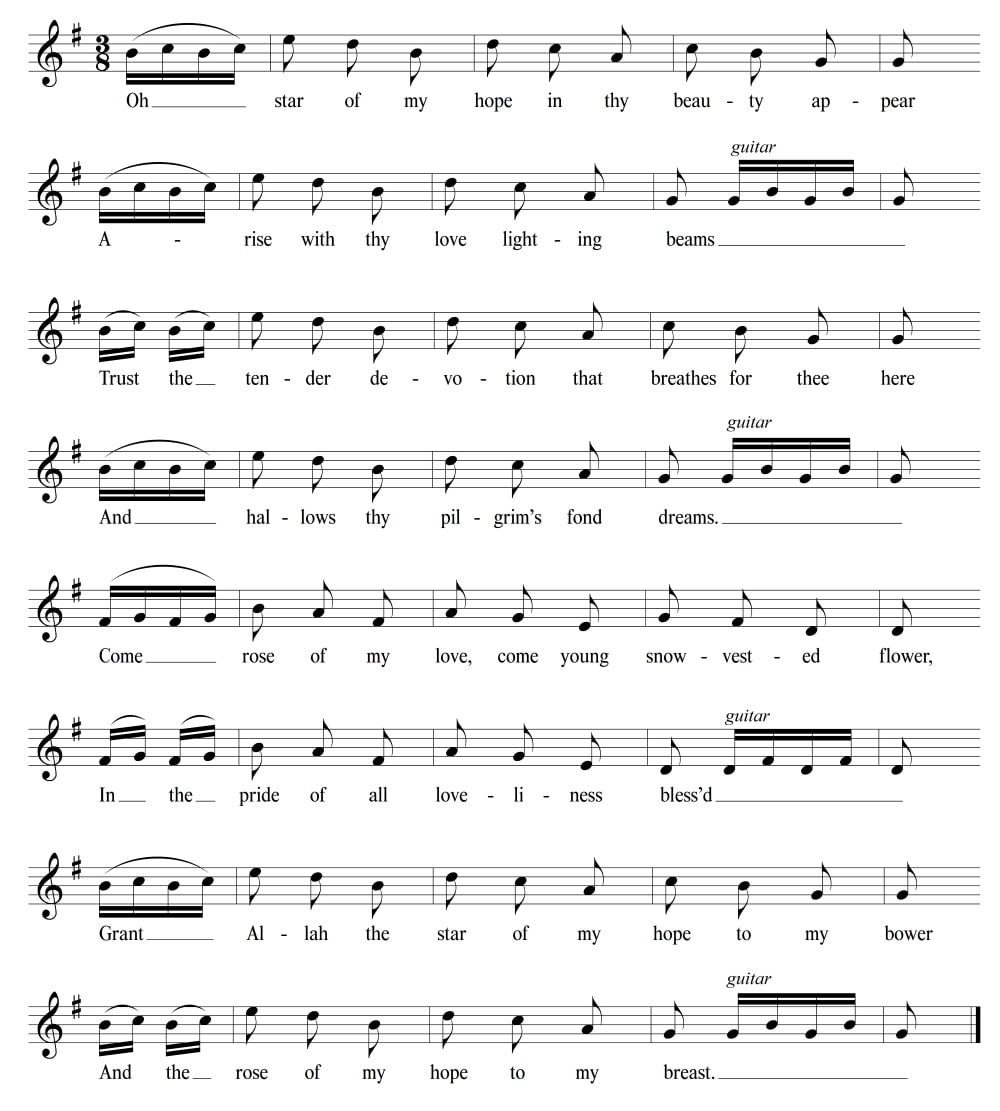
Synthesised sound file, Australharmony 2019
The cousins of Aledo, 5
http://digital.sl.nsw.gov.au/delivery/DeliveryManagerServlet?dps_pid=FL8980873 (DIGITISED)
Almanzor . . . (Takes Guitar and Sings) Song - air (The Juaracha)
Oh star of my hope in thy beauty appears [sic] -
Arise with thy love lighting beams,
Trust the tender devotion that breathes for thee here
And hallow thy pilgrim's fond dreams.
Come rose of my love, come young snow-vested flower,
In the pride of all loveliness bless'd -
Grant Allah the star of my hope to my bower
And the rose of my hope to my breast.
Documentation:
Letter draft, Eliza Hamilton Dunlop, Wollombi, NSW, undated (before October 1841) to Isaac Nathan, Sydney; unidentified original, transcribed in De Salis papers (also incomplete ed. in De Salis 1967, Two early colonials, 101-02)
"I bless thy shores my native land" and "Oh the limpid streams" [+]
[+] Were intended to be introduced in a Drama (the Cousins of Aledo) which I have arranged for the stage from Mary Mitford's "Blanch", and which as it has not been seen by any individual with the exception of Lady Gipps, I will if you give permission submit for your opinion.
Music concordances:
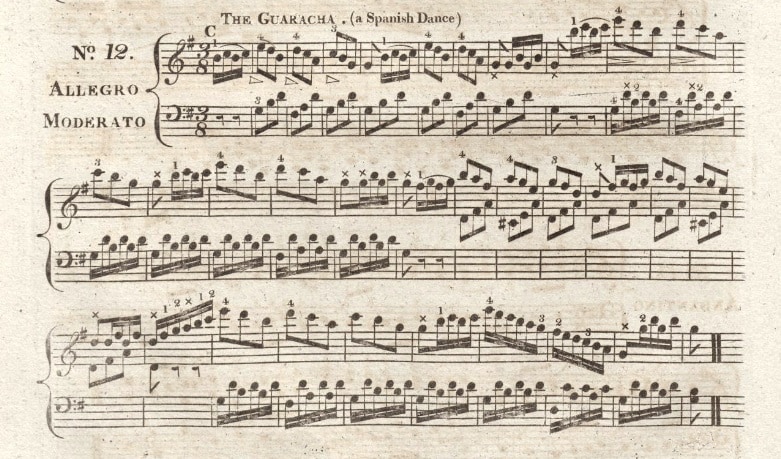
"The guaracha (a Spanish dance)", in J. B. Cramer's instructions for the piano forte . . . (London: Chappell, 1812), 24
https://digital.staatsbibliothek-berlin.de/werkansicht?PPN=PPN84855101X&PHYSID=PHYS_0032&DMDID=DMDLOG_0001 (DIGITISED)
Alternatively, see "The guaracha", from Auber's Masaniello, as in The guaracha, from Auber's Masaniello, arranged as a duet concertante for the piano forte 7amp; guitar . . . by J. J. Graille (London: Johanning & Whatmore, [n.d.])
Song 2 (act 4 scene 2) I would not tell a heart so dear (tune: How oft Louisa hast thou said [The birks of Invermay])
Words and melody edition:
I would not tell a heart so dear, song in The cousins of Aledo (Dunlop); tune: How oft Louisa [The birks of Invermay] (Linley, 1776)
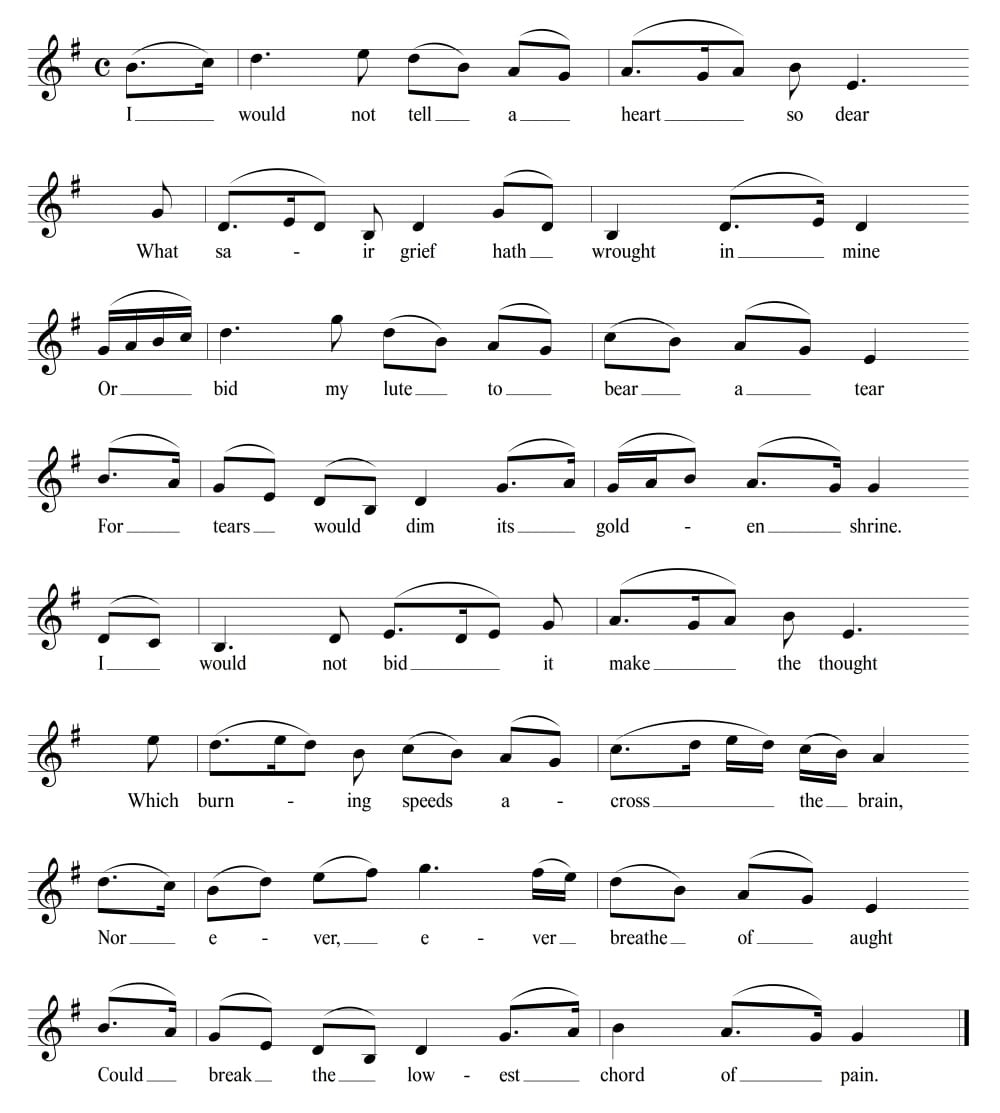
Synthesised sound file, Australharmony 2019
The cousins of Aledo, 20
http://digital.sl.nsw.gov.au/delivery/DeliveryManagerServlet?dps_pid=FL8980888 (DIGITISED)
. . . Blanch: My voice is turned to sorrow's notes alone -
(takes the Guitar) Yet at such bidding grief might cease its plaint.
Song - air - "How oft Louisa hast thou said"
I would not tell a heart so dear
What sair grief hath wrought in mine -
Or bid my lute to bear a tear
For tears would dim its golden shrine.
I would not bid it make the thought
Which burning speeds across the brain,
Nor ever, ever, breathe of aught
Could break the lowest chord of pain.
Music concordances:
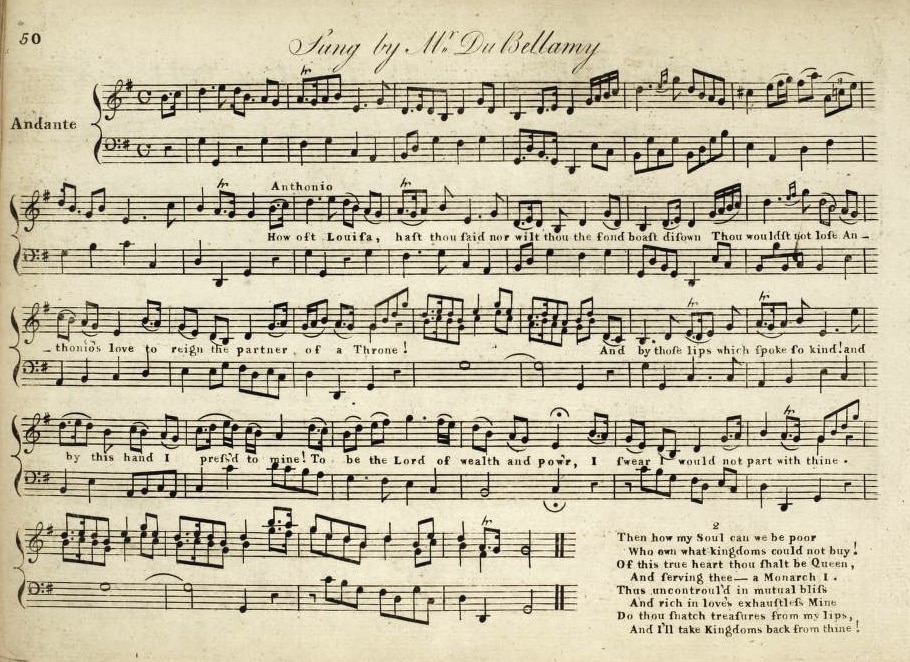
"How oft Louisa . . . Sung by Mr. Du Bellamy" (act 3), in The duenna; or, The double elopement, a comic opera as performed at the Theatre Royal in Covent Garden for the voice, harpsichord, or violin (London: Printed for C. and C. Thompson, [1776]), 50
https://archive.org/details/duennaordoubleel00linl/page/50 (DIGITISED)
Compare "The birks of Invermay", in The Scots musical museum, dedicated to the Catch Club instituted at Edin'r, June 1771, by James Johnson, vol. 1 (Edinburgh: Johnson & Co, [1787]), 73
https://archive.org/details/scotsmusicalmuse01rugg/page/73 (DIGITISED)
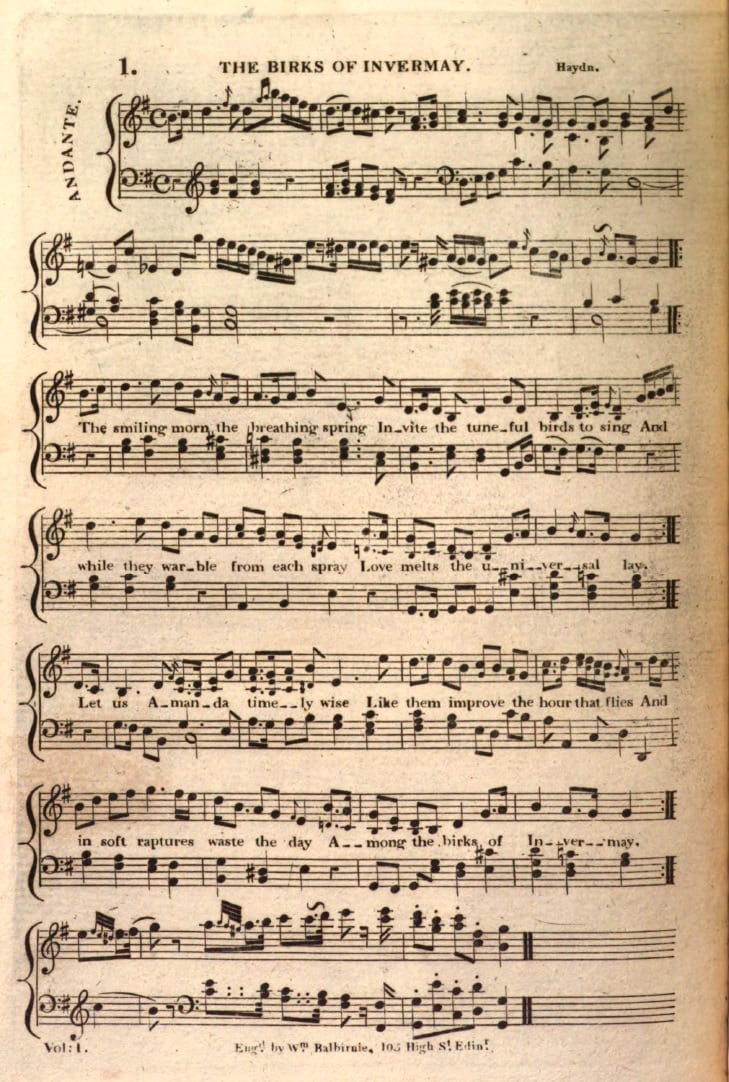
"The birks of Invermay", The select melodies of Scotland, interspersed with those of Ireland and Wales, united to the songs of Robert Burns, Walter Scott Bart . . . with symphonies & accompaniments for the pianoforte by H. Pleyel, Kozeluch, Haydn & Beethoven, the whole composed for & collected by George Thomson, F.A.S.E, in five volumes . . . vol. 1 (London: Preston; Edinburgh; G. Thomson, [1822])
https://reader.digitale-sammlungen.de/de/fs1/object/goToPage/bsb11139458.html?pageNo=32 (DIGITISED)
https://books.google.com.au/books?id=xcBcAAAAcAAJ&pg=RA1-PA1#v=twopage&q&f=false (DIGITISED)
"The birks of Invermay", in A collection of Scottish airs, harmonized for the voice & piano forte with introductory & concluding symphonies an accompaniments for a violin & violoncello by Joseph Haydn, Mus. Doc., vol. 1 (London: Printed by Goulding, D'Almain, Pott, & Co., [ ]),
https://books.google.com.au/books?id=4rBWbcy2atwC&pg=PA1#v=twopage&q&f=false (DIGITISED)
"How oft, Louisa, hast thou said, sung in the Duenna" [Sheridan], in The melodist, comprising a selection of the most favourite English, Scotch, and Irish songs, arranged for the voice, flute, or violin (New York: George Singleton, 1820), 21-22
https://books.google.com.au/books?id=Oq4CAAAAYAAJ&pg=PA21 (DIGITISED)
References:
The duenna; or, The double elopement, a comic opera, as it is performed at the Theatre-Royal in Covent-Garden (Dublin: [n.p.], 1787), 33
https://books.google.com.au/books?id=GnFbAAAAQAAJ&pg=PA33 (DIGITISED)
Diego Saglia, "Public and private in women's romantic poetry: spaces, gender, genre in Mary Russell mitford's Blanch", Women's writing 5/3 (1998), 405-22
https://doi.org/10.1080/09699089800200047 (PAYWALL)
. . . Set in Spain during the age of chivalry, the poem narrates the misfortunes of Princess Blanch of Aledo, cousin of Alfonzo, king of Murcia. Rightful heiress to the throne, Blanch has given up her position in favour of her cousin to avoid the burden of public life. Because of a plotting courtier whose suit she has rejected, the princess is accused of having killed the young heir to Alfonzo. She is then exiled and, believed dead, starts to roam the kingdom in disguise. Her wanderings take her to a secluded cottage, where a woman lives with her little daughter, a convent where she takes the veil, and the capital of Moorish Spain, Granada. Her peregrinations end when she is obliged to return to Murcia in order to clear the queen's reputation of suspicions about her honour, and die a sainted martyr to injustice . . .
1841 - The Aboriginal mother - Oh! hush thee - hush my baby [2] (music: Nathan)
Shareable link to all Trove items tagged The Aboriginal mother (Dunlop-Nathan)
https://trove.nla.gov.au/search?l-publictag=The+Aboriginal+mother+(Dunlop-Nathan) (TROVE tagged by Australharmony)
For main entry in checklist:
Sources and documentation:
Earlier edition:
"SONGS OF AN EXILE (No. 4)", The Australian (13 December 1838), 4
http://nla.gov.au/nla.news-article36861275
THE ABORIGINAL MOTHER, (From Myall's Creek.)
Oh! hush thee - hush my baby,
I may not tend thee yet.
Our forest home is distant far,
And midnight's star is set.
Now, hush thee - or the pale-faced men
Will hear thy piercing wail,
And what would then thy mother's tears
Or feeble strength avail! . . .
"THE ABORIGINAL MOTHER", The Sydney Herald (15 October 1841), 2
http://nla.gov.au/nla.news-article12871688
THE ABORIGINAL MOTHER.
"Only one female and her child got away from us."
- Evidence before the Supreme Court.
Oh, hush thee, hush, my baby, I may not tend thee yet,
Our forest land is distant far, and midnight-star is set,
Now hush thee, or the pale-faced men will hear thy piercing wail,
And what would then thy mother's tears or feeble strength avail.
Ah, could thy little bosom that mother's anguish feel,
Or couldst thou know thy father lies struck down by English steel,
Thy tender form would wither, like the kniven on the sand,
And the spirit of my perish'd tribe would vanish from our land.
For thy young life, my precious, I fly the fields of blood,
Else I had, for my chieftain's sake, defied them where they stood;
But basely bound, my woman arm, no weapon might it wield,
I could but cling round him I loved, to make my heart his shield.
I saw my first-born treasure lie headless at my feet,
The gooroo on his mother's breast with his life's stream is wet;
And thou, I snatch'd thee from their sword, it harmless pass'd by thee,
But clave the binding cords, and gave the coward boon - to flee.
To flee, my babe! but whither, without our friend, our guide?
The blood that was our strength is shed - he is not by my side.
Thy sire! oh! never never can Toonboohra hear our cry,
My bold, my stately mountain bird! I thought not he could die.
Now, who will teach thee, dearest, to poise the shield and spear,
To wield the koopin, or to throw the boomerang void of fear,
To breast the river in its might, the mountain tracks to tread?
The echoes of my homeless heart reply, "the dead! the dead!"
For ever must their murmurs, like the ocean torrent, flow,
The parted voice comes never back to cheer our lonely woe;
E'en in the region of our tribe, beside our summer streams,
'Tis as a hollow symphony from the shadow-land of dreams.
Nay, hush thee, dear; for weary and faint I bear thee on,
His name is on thy gentle lips; my child, my child, he's gone!
Gone o'er the golden fields that lie beyond the rolling cloud,
To bring thy people's murder-cry before the Christian's God.
Yes, o'er the stars that guide us, he leads my slaughter'd boy,
To show their God how treacherously these stranger men destroy;
To tell of hands - the cruel hands - that piled the fatal pyre,
To show our blood on Myab's ridge, our bones on the stockman's fire.
The above lines are from the pen of Mrs. Dunlop of the Wollombi, who sent them to Mr. Nathan; they have been set to music by that gentlemen, and will be sung at his approaching concert by Miss Nathan with full orchestral accompaniment. The words are pathetic, and display much poetic feeling, but they ascribe to the aboriginal woman words that might have been used by a North American Indian, but which our very slight acquaintance with the natives of this colony would enable any one to say never issued from the mouth of the woman who escaped from the New England massacre for which, we may remark, seven men were executed in Sydney. The lines will no doubt be copied in England where they are almost sure to be popular.
"Select Poetry", Australasian Chronicle (16 October 1841), 2
http://nla.gov.au/nla.news-article31733155
Reprints text in full without comment
"The Aboriginal Mother", The Sydney Gazette and New South Wales Advertiser (19 October 1841), 2
http://nla.gov.au/nla.news-article2554757
Reprints text in full with the following editorial comment:
The above pretty lines were sent to Mr. Nathan, who has set them to music - they will be sung by Miss Nathan at the forthcoming grand concert on the 27th.
"THE ABORIGINAL MOTHER", The Sydney Monitor and Commercial Advertiser (27 October 1841), 2
http://nla.gov.au/nla.news-article32191166
Reprints text in full with the following editorial comment:
Note - The foregoing lines were written by Mrs. Dunlop, and having been set to music by Mr. Nathan, will be sung by Miss Nathan, at the grand Concert to be given this evening.
"THE ABORIGINAL MOTHER", Port Phillip Patriot and Melbourne Advertiser (29 October 1841), 2
http://nla.gov.au/nla.news-article226510582
Reprints text in full preceded by the following editorial comment:
The following lines are the production of a talented lady residing at the Wollombi, to the north of Sydney. They are descriptive of the escape of an aboriginal mother and her child from the massacre of her tribe, which, perhaps, was one of the most horrible transactions that ever stained the annals of any community. It occurred a few years since, and seven of the perpetrators of the outrage were afterwards tried and executed for their share in the transaction. From the evidence adduced at the time of their trial, it appeared that a tribe, between 20 and 30 in number, were domiciled on the station of a Mr. Dangar, in the New England district, and that, without their being guilty of any offensive act, a number of convict and freed servants attached to stations in the surrounding districts assembled together, procured a stout rope, and making each of the tribe fast to it, drove the party along in a string to a retired spot. When they had arrived at a place which the murderers considered fit for the deed, muskets and knives were put in requisition, and the whole of the harmless creatures remorselessly butchered, with the exception of the woman and the child alluded to, who succeeded in escaping. It has been said that the words as ascribed to an aboriginal woman are somewhat overdone, that they might be used by a Mingo or a Delaware, but that is taking by far a too matter-of-fact view of the question. The lines have been set to music by Mr. Nathan, the composer, and will be sung at his next concert by Miss Nathan, with full orchestral accompaniment.
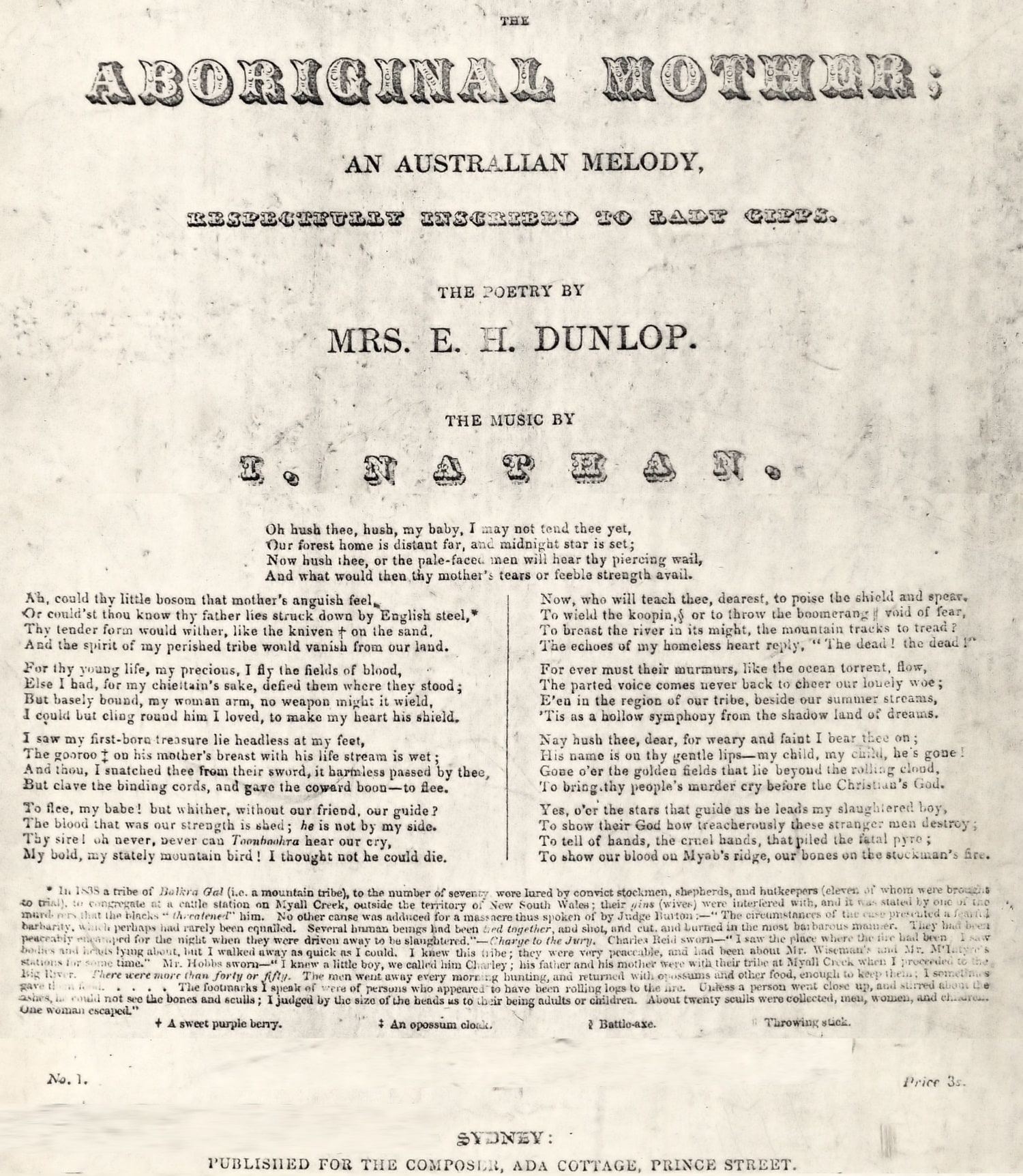
The Aboriginal mother, an Australian melody respectfully inscribed to lady Gipps, the poetry by Mrs. E. H. Dunlop, the music by I. Nathan . . . (Sydney: Published for the Composer, Ada Cottage, Prince Street, n.d. [1842])
https://trove.nla.gov.au/work/24305488
Copy at National Library of Australia (without cover) digitised
https://trove.nla.gov.au/version/29359391 (DIGITISED)
Copy at State Library of New South Wales (with cover), not digitised (but photocopy at NLA digitised)
https://trove.nla.gov.au/version/171071891 (DIGITISED)
Oh hush thee, hush, my baby, I may not tend thee yet,
Our forest land is distant far, and midnight-star is set;
Now hush thee, or the pale-faced men will hear thy piercing wail,
And what would then thy mother's tears or feeble strength avail.
Ah, could thy little bosom that mother's anguish feel,
Or could'st thou know thy father lies struck down by English steel, [1]
Thy tender form would wither, like the kniven [2] on the sand,
And the spirit of my perished tribe would vanish from our land.
For thy young life, my precious, I fly the fields of blood,
Else I had, for my chieftain's sake, defied them where they stood;
But basely bound, my woman arm, no weapon might it wield,
I could but cling round him I loved, to make my heart his shield.
I saw my first-born treasure lie headless at my feet,
The gooroo [3] on his mother's breast with his life's stream is wet;
And thou, I snatch'd thee from their sword, it harmless passed by thee,
But clave the binding cords, and gave the coward boon - to flee.
To flee, my babe! but whither, without our friend, our guide?
The blood that was our strength is shed; he is not by my side.
Thy sire! oh never, never can Toonboohra hear our cry,
My bold, my stately mountain bird! I thought not he could die.
Now, who will teach thee, dearest, to poise the shield and spear,
To wield the koopin [4], or to throw the boomerang [5] void of fear,
To breast the river in its might, the mountain tracks to tread?
The echoes of my homeless heart reply, "The dead! the dead!"
For ever must their murmurs, like the ocean torrent, flow,
The parted voice comes never back to cheer our lonely woe;
E'en in the region of our tribe, beside our summer streams,
'Tis as a hollow symphony from the shadow land of dreams.
Nay hush thee, dear; for weary and faint I bear thee on;
His name is on thy gentle lips - my child, my child, he's gone!
Gone o'er the golden fields that lie beyond the rolling cloud,
To bring thy people's murder-cry before the Christian's God.
Yes, o'er the stars that guide us he leads my slaughter'd boy,
To show their God how treacherously these stranger men destroy;
To tell of hands, the cruel hands, that piled the fatal pyre;
To show our blood on Myab's ridge, our bones on the stockman's fire.
[NOTE 1] In 1838 a tribe of Balka Gal (i.e. a mountain tribe), to the number of seventy, were lured by convict stockmen, shepherds, and hut keepers (eleven of whom were brought to trial), to congregate at a cattle station on Myall Creek, outside the territory of New South Wales; their gins (wives) were interfered with, and it was stated by one of the murderers that the blacks "threatened" him. No other cause was adduced for a massacre this spoken of by Judge Burton: - "The circumstances of the case presented a fearful barbarity, which perhaps had rarely been equalled. Several human beings had been tied together, and shot, and cut, and burned in the most barbarous manner. They had been peaceably encamped for the night when they were driven away to be slaughtered." - Charge to the Jury. Charles Reid sworn - "I saw the place where the fire had been. I saw bodies and heads lying about, but I walked away as quick as I could. I knew this tribe; they were very peaceable, and had been about Mr. Wiseman's and Mr. McIntyre's stations for some time." Mr. Hobbs sworn - "I knew a little boy, we called him Charley; his father and his mother were with their tribe at Myall Creek when I proceeded to the Big River. There were more than forty or fifty. The men went away every morning hunting, and returned with opossums and other food, enough to keep them; I sometimes gave them food . . . . The footmarks I speak of were of persons who appeared to have been rolling logs to the fire. Unless a person went close up, and stirred about the ashes, he could not see the bones and sculls [sic]; I judged by the size of the heads as to their being adults or children. About twenty sculls were collected, men, women, and children. One woman escaped."
[2] A sweet purple berry. [3] An oppossum cloak. [4] Battle-axe. [5] Throwing stick.
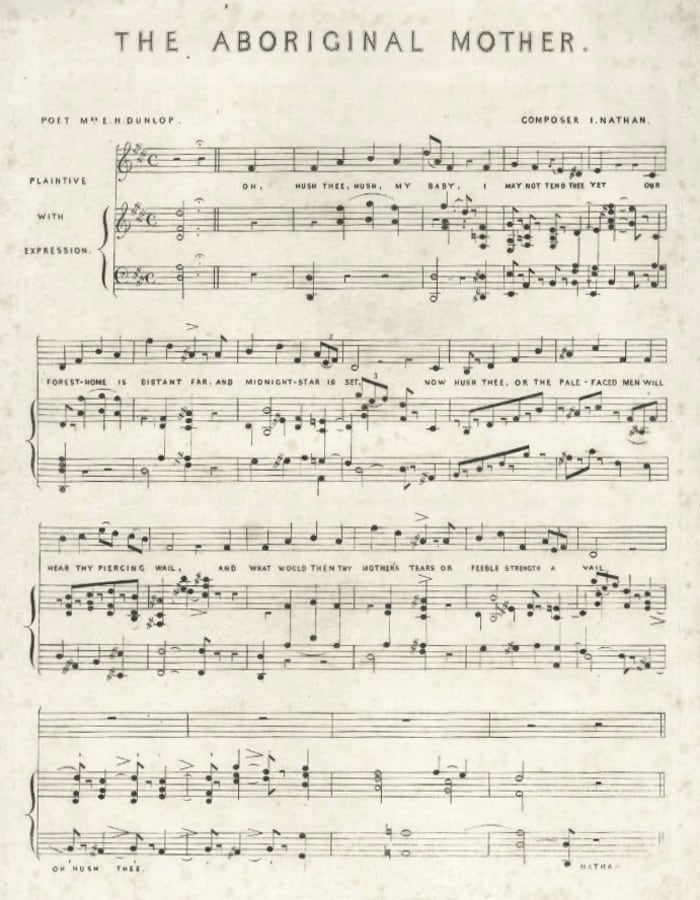
Synthesised sound file, Australharmony 2018
"AUSTRALIAN LAYS. THE ABORIGINAL MOTHER, BY MRS. DUNLOP", The Australian and New Zealand monthly magazine [London, England] 1/5 (May 1842), 296
https://www.nla.gov.au/ferguson/14605988/18420000/00010005/31-40.pdf
NOTE: This monthly was published in London by Henry Capper. This issue also included two other relevant articles:
"THE AUSTRAL-ASIAN PRESS", The Australian and New Zealand monthly magazine 1/5 (May 1842), 265-76
https://www.nla.gov.au/ferguson/14605988/18420000/00010005/1-10.pdf
https://www.nla.gov.au/ferguson/14605988/18420000/00010005/11-20.pdf
And, immediately preceding Dunlop's poem:
"THE ABORIGINES AND THEIR TREATMENT CONSIDERED"
https://www.nla.gov.au/ferguson/14605988/18420000/00010005/21-30.pdf
https://www.nla.gov.au/ferguson/14605988/18420000/00010005/31-40.pdf
The vase (with explanatory note)
http://digital.sl.nsw.gov.au/delivery/DeliveryManagerServlet?dps_pid=FL9674294 (DIGITISED)
. . . [Note] This lament is set to sweetly impressive music by Nathan the composer of Byron's Hebrew Melodies.
"Aboriginal mother's lament", Clarence and Richmond Examiner (14 February 1891), 2
http://nla.gov.au/nla.news-article61236615
This source consists of Dunlop's first stanza, a slightly variant version of lines 3 and 4 of her stanza 5, and stanzas 6 to 9, with no differences significant enough to suggest oral transmission, and so presumably redacted from a slightly damaged copy of a print source or manuscript copy. It is ascribed here to John Connell Laycock (1818-1897), son of Thomas Laycock (d.1823), grandson of colonial quartermaster Thomas Laycock (d.1809), and brought up after his parents' early death by his maternal grandfather John Connell (d.1849). Laycock briefly owned the Prince of Wales Theatre, Sydney, before it burnt down in 1860, and later settled in the Clarence district.
Documentation:
Letter draft, Eliza Hamilton Dunlop [Wollombi, NSW, undated (before October 1841)] to Isaac Nathan, Sydney; unidentified original, transcribed in De Salis papers (also incomplete ed. in De Salis 1967, Two early colonials, 101-02)
Isaac Nathan, Esq.
Ada Cottage, Prince Street
Sydney
It is not I feel assured that to a mind so gifted as Mr. Nathan's I need to make apologies that without formal introduction present myself to his notice - if my poetry lines have merit they will require no other usher, and I who am in the Forest far from human habitation of civilized beings, may well be forgiven the want of due observance in this matter, should my poetry be honored by your acceptance, pray do me the favor of a reply addressed Wollombi.
The Dark Lady of Doona, written by a relative, has a few of my songs published in it. A lady, a stranger in this land, but one to whom your eminent universal fame as an author and composer has long been known, thus begs permission to offer the accompanying poetry for your kind consideration. They are my favourites of a Collection which I hope to get published by Bentley of Broad St., but were I so honored as to find those few worthy of acceptance to go forth into the world, - [? with] the seal of your genius, it would be to me a source of pride and pleasure greater than I can say. I wrote
the Aboriginal Mother for the air, "When the seas were roaring".[*]
"I bless thy shores my native land" and "Oh the limpid streams" [+]
[*] The massacre it commemorates took place a short period after my arrival in the Colony.
[+] Were intended to be introduced in a Drama (the Cousins of Aledo) which I have arranged for the stage from Mary Mitford's "Blanch", and which as it has not been seen by any individual with the exception of Lady Gipps, I will if you give permission submit for your opinion.
My publications at home were confined to the magazines, but altered circumstances in this country where my husband has only £250 as Police Magistrate, induces my attempt to make my pen an aid for my numerous family, but more than this it would aid my way to future favor with the public. If my poetry be honoured by your acceptance pray do me the favor of a reply, addressed Wollombi.
I am sir respectfully
Eliza Hamilton Dunlop.
[W. A. Duncan], "NATHAN'S SUBSCRIPTION CONCERTS", Australasian Chronicle (25 September 1841), 3
http://nla.gov.au/nla.news-article31732969
The first of these concerts will be given about the middle of next month. We have seen a portion of the selection, which combines variety, novelty, and merit. Among the rest are an original glee, which embraces two distinct styles, and contains some modulations equally profound and natural - and an original song entitled the "Aboriginal Mother," the words of which are exceedingly beautiful. They relate to the too well known massacre of the aborigines, and are the composition of a lady of great talent, the wife of one of our police magistrates.
[Advertisement], The Sydney Herald (16 October 1841), 3
http://nla.gov.au/nla.news-article12871705
ROYAL VICTORIA THEATRE. Programme of MR NATHAN'S GRAND VOCAL and INSTRUMENTAL CONCERT (first of the series), to take place on WEDNESDAY, the 27th of October, 1841 . . . PART FIRST . . . Song - The Aboriginal Mother, a new Colonial composition, the words written by Mrs. Dunlop. - Nathan . . .
"NATHAN'S CONCERT", Australasian Chronicle (16 October 1841), 2
http://nla.gov.au/nla.news-article31733140
We are now enabled to lay the programme of this concert before our readers, which, for originality, variety and taste in the selection, offers to be the best musical treat we have yet had in the colony. Mr. Nathan has written complete orchestral parts for all the songs, which comprise some of the best works of Rossini, Paer, and Bishop, and in addition to these we have not less than three original compositions, one of which, "the Aboriginal Mother," we have carefully examined, and consider equal to any thing that Mr. Nathan has yet written.
"The Aboriginal Mother", The Sydney Gazette and New South Wales Advertiser (19 October 1841), 2
http://nla.gov.au/nla.news-article2554757
. . . The above pretty lines were sent to Mr. Nathan, who has set them to music - they will be sung by Miss Nathan at the forthcoming grand concert on the 27th.
[William Augustine Duncan], "NATHAN'S GRAND CONCERT", Australasian Chronicle (28 October 1841), 2
http://nla.gov.au/nla.news-article31733245
We shall briefly notice the leading features of this concert, which went off last evening with great eclat. The new glee, "Drink, drink," is decidedly good, and was well sung. Bishop's "Indian Drum," which followed, was given with Great skill and taste., and the orchestral accompaniments, which were composed by Mr. Nathan for the occasion, had a very good effect. Of the "Aboriginal Mother," given on this occasion for the first time, we have already expressed our opinion, and have only to add that it was sung by Miss Rosetta Nathan with great feeling. We shall he glad to hear it again; it will decidedly gain new favour by a better acquaintance . . .
"NATHAN'S GRAND CONCERT", The Sydney Herald (29 October 1841), 2
http://nla.gov.au/nla.news-article12871965
The Concert announced by Mr. Nathan in the programmes was performed on Wednesday evening, at the Victoria, to a respectable, though by no means a numerous audience. No doubt the pressure of the times operates disadvantageously for public amusements; yet we are not quite so bad in that respect as they were, some time ago, at New Orleans, where they were actually obliged to close the Theatres during the crisis of crashing banks and mercantile embarrassment . . . The thinness of the house was rather against the full effect of the vocalists; but several of the pieces were most creditably given. Miss R. Nathan, whose voice has improved wonderfully since we last heard her, was evidently frightened, and therefore did not produce half the effect which less timidity and more confidence would have insured . . .
There was no direct reference to The Aboriginal mother, in the main review, only in the correspondent's review, printed immediately below it:
"MR. NATHAN'S CONCERT (From a Correspondent)", The Sydney Herald (29 October 1841), 2
http://nla.gov.au/nla.news-article12871963
It is to be regretted, for the sake of public taste, that Nathan's treat on Wednesday evening was not attended as well as it ought to have been. It is not meant as to respectability but as to numbers. The defalcation lay in the absence of the "follow-my-leader clique" and the cabbage-tree oi polloi . . . Evidently the fair vocalists did their best and ample justice to the several pieces, in tune, pathos, and execution. But what, is the use? "Skippitty" and "Benedict" carried the clatter of the house - whilst the Aboriginal Mother, upon which all that a parent's art could do to perfect, and daughter's skill to accomplish, was scarcely noticed! Bad taste this. - Things are not so, at home.
Perhaps some excuse may be said for the song itself. And it will serve Mr. Nathan as a hint for the future, not to attempt putting into music what is unintelligible in verse: that, having no meaning in itself, not Handel himself could have made any thing of it. For music, after all, (as Nathan knows very well) is only another mode of expressing our thoughts. And, yet, so odd is it with the public, that had this been got up in the character of a black Gin with a ghastly, toad-like looking brat, gnawing a raw oppossum - the house would have been in a roar of applause, and no end of encore, - and, why? because the association of ideas would have been representative of the character, which no one could recognise in the song
There would have been one insurmountable difficulty attending this "cast," truly it is utterly impossible that out of "nature's own" the pretty Rosetta could have undertaken the part.
All that was sung was sweet, chaste, and true, and most scientifically accompanied by Nathan, who by the way ought to have given us one of his own solos . . .
"THE ABORIGINAL MOTHER", Port Phillip Patriot and Melbourne Advertiser (29 October 1841), 2
http://nla.gov.au/nla.news-article226510582
The following lines are the production of a talented lady residing at the Wollombi, to the north of Sydney. They are descriptive of the escape of an aboriginal mother and her child from the massacre of her tribe, which, perhaps, was one of the most horrible transactions that ever stained the annals of any community. It occurred a few years since, and seven of the perpetrators of the outrage were afterwards tried and executed for their share in the transaction. From the evidence adduced at the time of their trial, it appeared that a tribe, between 20 and 30 in number, were domiciled on the station of a Mr. Dangar, in the New England district, and that, without their being guilty of any offensive act, a number of convict and freed servants attached to stations in the surrounding districts assembled together, procured a stout rope, and making each of the tribe fast to it, drove the party along in a string to a retired spot. When they had arrived at a place which the murderers considered fit for the deed, muskets and knives were put in requisition, and the whole of the harmless creatures remorselessly butchered, with the exception of this woman and the child alluded to, who succeeded in escaping. It has been said that the words as ascribed to an aboriginal woman are somewhat overdone, although they might be used by a Mingo or a Delaware, but that is taking by far a too matter-of-fact view of the question. The lines have been set to music by Mr. Nathan, the composer, and will be sung at his next concert by Miss Nathan, with full orchestral accompaniment: - . . .
"CONCERT", The Australian (30 October 1841), 2
http://nla.gov.au/nla.news-article36849358
Mr. Nathan's Concert on Wednesday evening was, as we had anticipated, a highly interesting entertainment . . . Next in point of excellence was, Bid me discourse, The Aboriginal Mother, and the Australian Anthem, Long Live Victoria. The first was sweetly sung, and encored. Miss Rosetta, though evidently wanting a due share of confidence, imparted to the Aboriginal Mother a peculiar degree of pathos - indeed, her very tremulousness harmonised most happily with the subject . . .
"Mr. Nathan's Concert", The Sydney Gazette and New South Wales Advertiser (30 October 1841), 2
http://nla.gov.au/nla.news-article2554858
We had a rich musical treat on Wednesday evening; it had been in perspective for some time, and we have now but to acknowledge that our most sanguine anticipations were to the fullest extent realized. Mr. Nathan seemed to have spared no pains either in the selection, orchestral arrangements or drilling, for the concert; and the effect must have been highly gratifying to him, as it was to us, and the audience generally. We are afraid, however, that Mr. Nathan, like most men of genius, is an injudicious arranger, as regards pecuniary calculations; or he would never have chosen the time he did for his entertainment; the Governor, and many other persons of distinction being absent from Sydney, and our financial state miserably depressed; but notwithstanding these obvious disadvantages, the boxes were full, and we were glad to see the house generally, presenting a much better appearance than we could have anticipated. In fact, when chaste and superior entertainments like this, are provided, one may be sure, even in the worst of times, to find many patronizers. Mr. Nathan, as this concert demonstrated, has done much - very much, for music in this colony, and it is sincerely to he hoped that the Australians will appreciate and encourage his efforts. We were struck on entering the theatre with the formidable array of vocalists, seated on the stage, and knowing that many of these must have been of very recent education - and also being aware of the very great difficulty of training a number of individuals to sing in chorus, in time and tune, we must confess that we were seriously apprehensive for the fate of some of the choruses; but these fears were soon dissipated . . .
Next came Mr. Nathan's new song "The Aboriginal Mother." The poetry by Mrs. Dunlop. We had seen the verses in the public prints; we had also seen Gins, and from our acquaintance with the gyneocracy of Australia, we could but regret that these thrillingly touching lines should have been so misplaced. Disconnect them however, from their present black heroine - fancy her any one else, and a treat awaits you. By the time the few first bars of the symphony were played, we were totally absorbed in the composition. The song was sung by Miss R. Nathan with a simplicity, chastity, and pathos truly thrilling - never was poetry recited to greater advantage, the accompaniments were most appropriate - the melody touching and effective. We were in spite of ourselves affected even to tears, and most of our neighbours from a similar state, were prevented observing our weakness. Since Jeptha's Daughter, we have not had such a treat, and we shall conceive no concert complete for months to come without a repetition of the "Aboriginal Mother." In England the song must become a favorite . . .
"Original Correspondence. TO THE EDITOR", Sydney Free Press (30 October 1841), 2
http://nla.gov.au/nla.news-article226356914
Sir, - I just arrived in Sydney time enough to be present at Mr. Nathan's Concert on Wednesday night last; and, I must say, I was very much delighted with the "bill of fare," as, contrary to other concerts, there was only one foreign air - all the rest English, and that I could understand well, - every word of the singing was most distinct, and not drowned in accompaniment or smothered in flourishes. I have heard "Bid me discourse" by Miss Stephens, over and over again, and I must say it was most correctly, sung by Miss Nathan, but if anything rather too quick in the running passages. The "Aboriginal Mother" no doubt is very good music, but the young lady must have been timid at the first starting off, as I could easily see she could have sung it ten times as well at home; and the House, not much understanding these matters (only "tippity" ones), never encored her, so that they are in perfect ignorance what the song is after all! . . . I am yours, A BUSHMAN.
"MR. NATHAN'S CONCERT", Sydney Free Press (30 October 1841), 3
http://nla.gov.au/nla.news-article226356910
. . . The music of the new song, "The Aboriginal Mother," is a beautiful composition; it was sung by the youngest Miss Nathan with great simplicity and feeling, and was much applauded . . .
"ORIGINAL CORRESPONDENCE. SYDNEY EXTRAVAGANZAS - FELTON - NATHAN. To the editors", The Sydney Herald (3 November 1841), 2
http://nla.gov.au/nla.news-article12872050
. . . Then the Aboriginal Mother (proh pudor!) is a very - very indifferent song -
"another failure" in fact - is praised as equal to the sublime, superhuman pathos of Jephtha's Daughter.
How much farther than this could absurdity go?
"From the sublime to the ridiculous is but a step." I do sincerely wish Nathan every success . . .
Again, most warmly wishing all success to these over-praised and over-puffed meritorious
men, and others I could name,
I am, gentlemen, yours to command,
THOROUGH BASS.
[Mr. Thorough Bass is rather too hard on Nathan who is not to blame for the super-extra puffs which are bestowed upon him, and some of which we happen to know were written by persons who are good judges of music. - EDS.]
ASSOCIATIONS: Maurice Appleby Felton (artist, portrait painter)
Further correspondence:
"THE FINE ARTS AND THE PRESS. MR. EDITOR", Australasian Chronicle (4 November 1841), 2
http://nla.gov.au/nla.news-article31733302
"THOROUGH-BASS AND NATHAN. To the Editors", The Sydney Herald (5 November 1841), 2
http://nla.gov.au/nla.news-article12872091
Nathan's reply
"MR. NATHAN'S CONCERT", The Colonial Observer (4 November 1841), 6
http://nla.gov.au/nla.news-article226359780
. . . In particular, we must notice "The Aboriginal Mother," the poetry by an Australian lady, Mrs. Dunlop, of the Wollombi; the music, we understand, by Mr. Nathan. This beautiful piece, the subject and the language of which are so rich in poetic feeling, was sung by the youngest Miss Nathan with great simplicity and feeling, and called down the plaudits of the assembly . . .
"THE MUSE OF AUSTRALIA", Port Phillip Patriot and Melbourne Advertiser (11 November 1841), 3
http://nla.gov.au/nla.news-article226512155
From a critique in the Sydney Gazette on a recent concert given by Mr. Nathan, the composer, we select the following comments on those talented lines, "The Aboriginal Mother," which, our readers will doubtless remember, were published in this journal a few numbers back: - "Next came Mr. Nathan's new song 'The Aboriginal Mother,' . . . and we shall conceive no concert complete for months to come without a repetition of the 'Aboriginal Mother.'"
[Eliza Hamilton Dunlop], "ORIGINAL CORRESPONDENCE. THE ABORIGINAL MOTHER", The Sydney Herald (29 November 1841), 2
http://nla.gov.au/nla.news-article12872517
THE ABORIGINAL MOTHER.
Prejudicta opini obruit justicium.
The author of the "Aboriginal Mother" takes leave to notice the favor bestowed on that poem, by the learned correspondent of the Sydney Herald, and to return acknowledgments for the candid review, and graphic delineation of how such a matter should have been represented, to meet as well, "the color of the times" as his conceptions of a New South Wales audience. Admitting his critical acumen in discerning that the Aboriginal Mother was not calculated for the meridian of Sydney, it is added that it was not intended for any of the high southern latitudes, but however much the idea is to be deprecated by Supers and Stock-men - had its origin in the hope of awaking the sympathies of the English nation for a people whom it is averred, are rendered desperate and revengeful by continued acts of outrage. Painfully sensible of great literary demerit; of a deficiency in poetical imagery - but above all in having such mal-a-propos taste as to select so inexpedient a subject - still the sarcasm of "Thorough-bass" cannot render that song worthless, which a hand long used to bestow, and to reap laurels, has now stamped with extrinsic value.
The erudite reviewer decides, as an anomalism, the idea of attributing the sweetest emotions of the heart - the feelings of mother and wife to an untutored savage - or moral courage to a wild denizen of nature's solitudes! Yet, the error rests not with the poet. The pool of Bethesda lay deep and pure, although the impotent man lingered in the porch; so do the clear well-springs of love and kindred ties, bestow their healing influences, even now, for the children of the desert; albeit, either "cohesively or repulsively" the "grave" tones of Thorough-bass, devoid all "harmonics of the string," send their "lateral vibration" through the Balaam-box of the Sydney Herald.
True, those deep tones will be reflected, aye, and multiplied, by far-off echoes of old hands licensed to cry havock beyond the boundaries. But the author of the Aboriginal Mother did hope, that, even in Australia, the time was past, when the public press would lend its countenance to debase the native character, or support an attempt to shade with ridicule, ties stronger than death, which bind the heart of woman, be she Christian or savage.
Extract from the papers of an officer employed on the Government Survey of New South Wales, published by a Committee of the Society for promoting Christian Knowledge:
I had proceeded about a quarter of a mile, when my attention was attracted by sounds of human voices wailing in wild and melancholy strains, I soon perceived before me three native women sitting by a grave, their heads were depressed and nearly touching each other, they were striking their heads with a tomahawk and blood ran down on the back of the neck and ears - I called to them in vain, I went nearer and pulled one by her possum skin cloak, and succeeded in making her look up; but when she did, I may safely assert, it would be impossible to behold a more wretched creature. She was the picture of utter anguish and despair, tears were falling in fast succession down her checks; the same was the case with the others; she muttered something and then dropped her head again, wailing as before in all the bitterness of agonising grief; whether she invoked the dead as able to hear beyond the grave, or wounded her head to soothe the parted spirit of a relative is yet a mystery. It is, however, a custom of the Aboriginal females thus to mourn over the tombs of their dead; and it is evident such excessive weeping can only arise from natural affection.
[Mrs. Dunlop is under a mistake in supposing that "deficiency in poetical imagery" is an offence with which she is chargeable. We complained of her having by means of poetical talent, of no mean order, given an entirely false idea of the native character; and that opinion we see no cause to alter. EDS.]
Letter, Isaac Nathan, Sydney, NSW, 3 December 1841, to Eliza Hamilton Dunlop; unidentified original, transcribed in De Salis papers (also incomplete ed. in De Salis, Two early colonials (1967), 104-05)
Sydney, Ada Cottage
3rd Dec'br 1841
I fear my dear Madam my long silence will not place me at no. 1 in your estimation. The truth therefore must out. The same day that I did myself the honour to forward you the music of your beautiful aboriginal mother, I gave a copy to an engraver here, that I might testify by its immediate publication the delight I really felt in connecting my humble music with the words, & it was my intention to surprise you with a copy - unfortunately the engraver (who is infected I imagine with the gross air of Sydney), has not yet done his work, & puts me off from day to day, & I fear will do so for some months to come.
I now take leave to hand to your notice a simple French air which I should like to have sung at my next concert, to English words, so that it may be published - if you can spare the time & will write on any subject you please, I shall feel highly flattered; do not confine yourself to French words - I would rather make it an aboriginal subject, an Australian subject connected with native dance or festival. My object is to publish all I can in England as well as in Sydney and you may be certain that I shall not set a line of my music to any words of the Sydney writers whilst I may calculate on receiving productions from your powerful pen.
I have not forgotten your wish to have set to music
[blank]
but I have been much harassed with an approaching law suit - & other worldly affairs so that I have had no musical sounds to command. You may however depend on my setting the words to music the first moment that I can command for melody.
I will lose no time in forwarding your "aboriginal mother" as soon as the engraver brings her home.
Dear Madam,
Yours respectfully & obliged,
I. Nathan.
Private I suppose you know that [illegible - ? Professor Rennie] [and] "Thorough Bass" to be one & the same - I have no doubt on the subject.
ASSOCIATIONS: James Rennie
[Advertisement], Australasian Chronicle (20 January 1842), 3
http://nla.gov.au/nla.news-article31734793
NEW MUSIC. This day is published, price 3s., by the Composer, Ada Cottage, Prince-street, THE ABORIGINAL MOTHER: poet, Mrs. Dunlop; composer, I. Nathan.
"NEW MUSIC", Australasian Chronicle (22 January 1842), 2
http://nla.gov.au/nla.news-article31734813
The Aboriginal Mother: inscribed to Lady Gipps. Words by Mrs. Dunlop; music by I. Nathan. Our readers are already acquainted with the words of this beautiful melody, which we are happy to announce is now published with the music. The air is simple and pathetic, and the harmony learned and skilful. It ought to be on the pianoforte of every lady in the colony.
"NEW MUSIC", The Sydney Herald (22 January 1842), 2
http://nla.gov.au/nla.news-article12873433
Mr. Nathan has published the song of the "Aboriginal Mother," the music of which we spoke so highly of, when it was sung by Miss R. Nathan. Those who were not at the Concert, but who have had an opportunity of seeing the song in print, confirm the opinion we expressed, that it is a melody of great beauty - worthy the composer's high name in the musical world. We can only regret that the words are not more worthy of the music.
[Advertisement], Morning Post [London] (29 April 1842), 8
THE AUSTRALIAN and NEW ZEALAND MAGAZINE for MAY. Price Two Shillings. Contents: - l. The Australasian Press - 2. On Wool-growing in Australia - 3. The Exotic World capable of being successfully implanted and cultivated in Australasia, No. 3 on the Olive Tree - 4. The Aborigines and their treatment - 5. Australian Lays, No. 1. The Aboriginal Mother - Australasian Intelligence, with some important information from South Australia - Arrivals and Departure of Ships, and a List of those laid on for the Colonies. Published by Smith, Elder, and Co., 65, Cornhill; Bell and Bradfute, Edinburgh; D. Robertson, Glasgow; M. Cumming, Dublin; and sold by all Booksellers.
[Advertisement], The Sydney Herald (8 July 1842), 1
http://nla.gov.au/nla.news-article12876054
THE SPACIOUS HALL, SYDNEY COLLEGE.
MR. NATHAN'S FIRST ANNUAL BENEFIT CONCERT Of Vocal and Instrumental Music,
in aid of the Funds exclusively for the Benevolent Asylum, will take place, under the
sanction of the Committee, at the spacious Hall, Sydney College,
THIS EVENING, the 8th of July, 1842
The following gentlemen have kindly offered their services to act as Stewards on this occasion:
Honorable E. Deas Thomson, M. E. C.
His Honor Mr. Justice Stephen
Roger Therry, Esq., Attorney-General
James Donnithorne Esq.
Robert Lynd, Esq., Barrack Master
T. H. Braim, Esq., A. M.
Oeorge Cooper Turner, Esq., Crown Solicitor
Edye Manning, Esq., J. P.
H. T. Crozier, Esq , J. P.
William Dawes, Esq., J. P.
Dr. Bland
M. Metcalfe, Esq., &c. &c.
Leader - Mr. Deane.
Conductor - Mr. Nathan, who will preside at the pianoforte.
THE BAND OF THE 80th REGIMENT will attend, by the kind permission of Colonel Baker.
PROGRAMME . . .
PART SECOND . . .
"The Aboriginal Mother" - An Australian Melody, inscribed to Lady Gipps - Nathan . . .
Words and melody edition (first verse only underlaid):
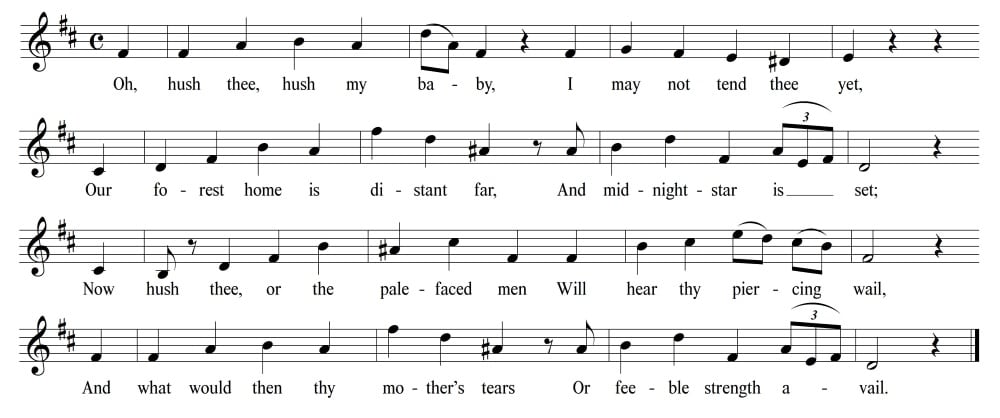
- - -
Synthesised sound file, Australharmony 2018
Commentary:
- - -
References:
"To the Editor", The Sydney Gazette and New South Wales Advertiser (3 July 1841), 3
http://nla.gov.au/nla.news-article2553789
"To the Editor", The Sydney Gazette and New South Wales Advertiser (17 July 1841), 3
http://nla.gov.au/nla.news-article2553921
Sir,
At a period when the financial embarrassments of a hitherto progressing country have attained a climax,
that time and frugality alone can promise restoring to an equilibrium, it will be permitted to every reflecting citizen,
to exert whatever wisdom and energy he is possessed of,
in averting the introduction of a new calamity,
that is accompanied by insult, to that land which choice has made his adoption.
The appropriation of so large a portion of our territorial land revenues, as fifteen percent,
to an object that various experience has demonstrated to be as unaccomplishable as to "change the Ethiopians skin or the leopards spots"
- the civilization of the aboriginal natives of New Holland -
has long since engrossed the consideration of an extensive community,
and has now passed the ordeal of every just man's reprobation . . .
The native inhabitant of our forests must no longer be depicted as that ideal being,
whom the vain imagination of man has created for the exercise of some supposed genius;
or perhaps the more lucrative object of ensuring the possession of a good governorship,
neither shall he portray him as Pope's
- Poor Indian of untutored mind,
Sees God in clouds, and hears him in the wind.
for no solitary attribute or manifestation of the Deity's existence has ever illumined the dreary intellect of an Australian savage.
In dispassionately contemplating him, whether the animal conformation or sensibility most engrosses the enquiry,
the conclusion however involuntarily, but too frequently establishes the suspicion that his attributes are too circumscribed,
and that he has few to dignify him with the appellation of our specie's - homo . . .
. . . I apprehend this philanthropic vision, sir, will realize the fable of the raven,
which the fostering hand of attachment, pampered from an unfledged state to that of all apparent domestication,
till the approach of Valentine sped its flight to the chimney top to nestle, and thence to the regions of primitive nature.
I am, Sir,
Your obedient
AGRICOLA
Wollombi, July 10.
1842 - The eagle chief - Hark to the sound! along the green hill side (Setting: Nathan)
Shareable link to all TROVE items tagged The eagle chief (Dunlop-Nathan)
https://trove.nla.gov.au/search?l-publictag=The+eagle+chief+(Dunlop-Nathan) (TROVE tagged by Australharmony)
For main entry in checklist:
https://sydney.edu.au/paradisec/australharmony/checklist1841-1845.php#1842-02-05-nathan-eagle-chief
Sources:
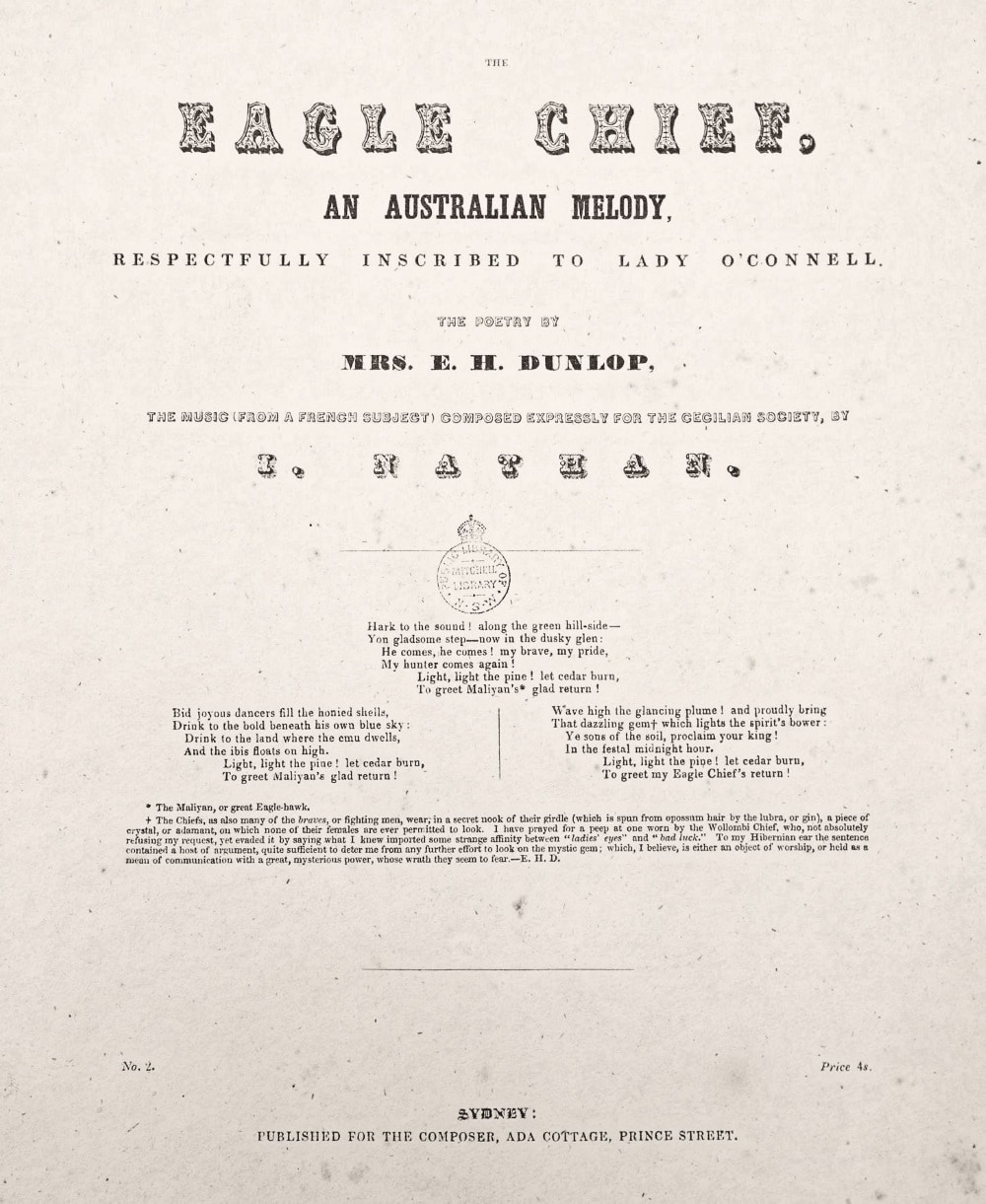
The eagle chief, an Australian melody, respectfully inscribed to lady O'Connell, the poetry by Mrs. E. H. Dunlop, the music (from a French subject) composed expressly for the Cecilian Society, by I. Nathan (Sydney: Published for the Composer, Ada Cottage, Prince Street [1842])
Copy at the National Library of Australia (without cover)
https://trove.nla.gov.au/version/29359459 (DIGITISED)
Copy at the State Library of New South Wales (with cover, not digitised)
http://archival.sl.nsw.gov.au/Details/archive/110050810
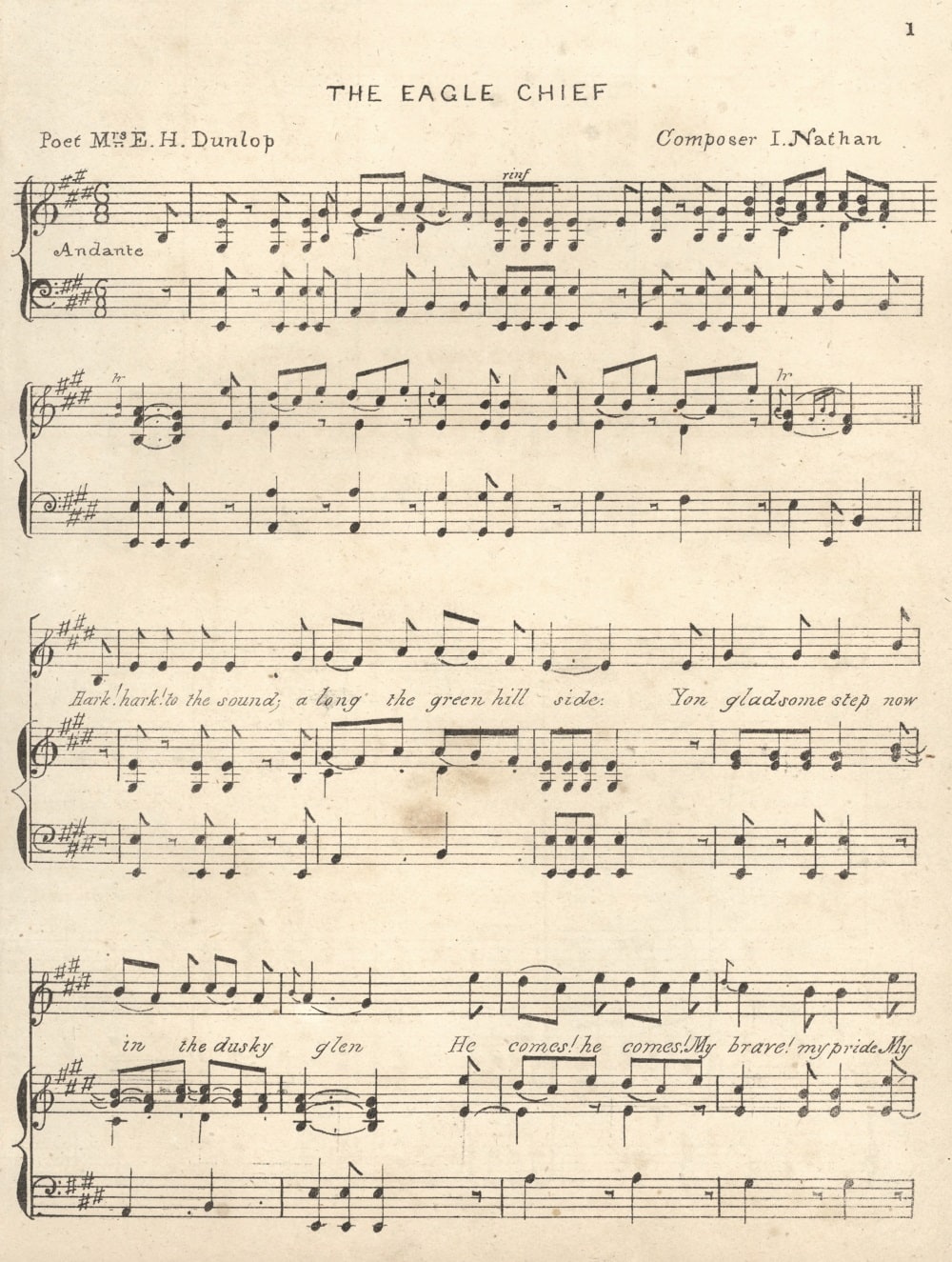
Synthesised sound file, Australharmony 2018
"Original Poetry", The Sydney Gazette and New South Wales Advertiser (21 April 1842), 3
http://nla.gov.au/nla.news-article2556288
The vase (with explanatory notes)
http://digital.sl.nsw.gov.au/delivery/DeliveryManagerServlet?dps_pid=FL9674343 (DIGITISED)
Documentation:
[Advertisement], Australasian Chronicle (5 February 1842), 3
http://nla.gov.au/nla.news-article31734935
NEW MUSIC. This day is published, price, 3s., for the composer, Ada Cottage, Prince-street, THE ABORIGINAL MOTHER. In a few days will appear, THE EAGLE CHIEF: Poet, Mrs. Dunlop; composer, J. Nathan.
"MUSIC", The Sydney Herald (15 April 1842), 3
http://nla.gov.au/nla.news-article28651792
Mr. Nathan has just published a piece of Music called the Eagle Chief, upon which we shall take an early opportunity of making a few critical remarks.
"NEW MUSIC", Australasian Chronicle (16 April 1842), 2
http://nla.gov.au/nla.news-article31735630
Mr. Nathan has just published a very pretty song and chorus, entitled "The Eagle Chief". The words are by Mrs. Dunlop, and the work is dedicated to Lady O'Connell. The subject (partly from a popular French air) is light and pleasing, and the harmony is very skilfully distributed in the vocal score.
"NEW MUSIC", The Sydney Gazette and New South Wales Advertiser (16 April 1842), 3
http://nla.gov.au/nla.news-article2556255
Mr. Nathan has published No. 2 of his Australian melodies, entitled the "Eagle Chief." The poetry by Mrs. E. H. Dunlop, is far superior to that usually written for song, and is what an Australian melody should be, characteristic of the aborigines, it is therefore free from the objections we made against No. 1 of these Australian melodies - the "Aboriginal Mother." Mr. Nathan's music is strictly in keeping with the subject, and combines the rare desiderata of beauty - simplicity, and learning, especially in the quartette. We hope that our fair and gifted poet will continue her labours, and that Mr. Nathan will give us a set of Australian Melodies not unworthy the composer of the Hebrew Melodies, but we must also hope, that they will be perpetuated in better type and printing, than those before us. Every musical person should procure a copy of the "Eagle Chief."
"NEW MUSIC", The Sydney Herald (18 April 1842), 2
http://nla.gov.au/nla.news-article12874750
The publication of new music is now no novelty in Sydney. Two new compositions have come under our notice within the last fortnight, and we have now before us another, "The Eagle Chief," being No. 2, of Mr. Nathan's Australian Melodies, the poetry by Mrs. Dunlop. It is arranged as a treble solo, and quartette for two trebles, tenor and bass. The melody is simple, pretty, and appropriate, but it is the harmonics that have most engaged our attention; these are rich and classical, and in every respect worthy the composer.
Having spoken thus of the music, we regret we cannot say anything favourable of Mrs. Dunlop's poetry; it is entirely out of character, and instead of giving any idea of the habits of the black natives of this Colony, it is calculated to mislead, indeed did we not know that Mrs. Dunlop resides at the Wollombi, where she has every opportunity of studying the habits and characters of the natives, we should imagine from her poetry that she was a cockney, and that her only knowledge of the aboriginal natives, was acquired by reading the Last of the Mohicans. The song is supposed to be sung by a black gin, who is waiting the return of her husband, and upon hearing his "gladsome step," bids her attendants
Light, light the pine! let cedar burn,
To greet Maliyan's glad return.
Maliyan, we are told in a note, means the "great Eagle Hawk." The singer then bids the assembled parties drink the "bold" and then,
Drink to the land where the emu dwells
And the ibis floats on high.
Now, with all deference to Mrs. Dunlop, we positively assert that there is no custom analogous to the stupid practice of toast-drinking known among the natives, and if there were, we should imagine that Mrs. Maliyan would have known very little about the ibis. If Mr. Nathan's excellent music should cause a demand for a second edition, we would suggest that the name of the Egyptian bird should be left out, and "eagle" substituted, which, as the Eagle Chief is the subject of the song, would be more appropriate. In the next verse Mrs. Maliyan bids them,
Wave high the glancing plume, and proudly bring
That dazzling gem which lights the spirit's bower.
Passing by the nonsense about the plume, we come to Mrs. Maliyan's injunctions to bring the "dazzling gem," which is the most surprising mistake Mrs. Dunlop has made: for so far from the black gins having the care of the "secret stone," carried by the principal men among the blacks, any black woman who was even to look at it accidentally would be surely murdered. This secret stone has puzzled all the writers who have described the customs of the natives of this colony, for the particular virtues which the natives ascribe to it have never been satisfactorily discovered. About twelve years ago we were in the bush, to the northward, when the nature of this stone became the subject of conversation; and one of the blacks, who were encamped a short distance from the house, named Wicki, (which signifies bread), was sent for, and questioned about it. It was with great reluctance that he alluded to it at all, being evidently frightened lest some supernatural influence should be exercised over him; all our entreaties for a sight of it he for a long time resisted, but yielded to a bribe of enough flour for a cake, a fig of tobacco, and the promise of the loan of a gun and some powder and shot the next day. He then carefully examined the house to see that there were no black gins in it - and shut and locked the doors, lest any white woman should accidentally come in; he next untied his hair, and from the centre of it took out a small native net, containing a parcel made of tea-tree bark, (which is as soft as paper), and after unfastening several wrappers, he at length came to what Mrs. Dunlop makes Mrs. Maliyan call the "dazzling gem," which was a bit of crystal, of an irregular shape, about the size of a die. While we were examining it, he was evidently in a state of great alarm, and begged that the black gins might not be told about the stones, as it would be the death of them. What power these stones were supposed to possess we could not get Wicki to say, his only reply on this head being, "baal pialla" which means, do not talk about or mention it: he was also anxious that the white women on the farm should not know that these stones had been seen, fearing that some evil would befall them if they did. When, therefore, Mrs. Dunlop makes a black gin tell some other blacks to bring the "dazzling gem," she displays an ignorance of their customs, which is remarkable, as we learn from a note, that she herself had often "prayed for a peep at one worn by the Wollombi chief," in vain.
We should not have taken the trouble to show the folly of this second attempt of Mrs. Dunlop's to make the blacks appear a different race of people from what they really are, were it to be circulated in this Colony only, but Mr. Nathan's music is likely to make it known in England, and therefore we thought it a duty to shew the real character of the verse.
Mrs. Dunlop appears to have a poetic turn of mind, and we should be glad to see her attempting some subject unconnected with the blacks.
"THE EAGLE CHIEF; AN AUSTRALIAN MELODY, BY I. NATHAN", The Australian (19 April 1842), 2
http://nla.gov.au/nla.news-article37113741
This composition is the first concerted musical production of Australia, set to a beautiful poem written expressly for the composer by Mrs. Dunlop. We scarcely know which to admire most, the music or the poetry. The melody, which is simple and pleasing, is perfectly descriptive of the poet's ideas, and is arranged as a solo and quartetto, not with common mamby-pamby harmony of thirds and their inverted sixes, but by rich and well chosen chords, such as 3-4-7, judiciously prepared 9ths, &c, which may be observed on the two accented parts of the second bar, - at the commencement of the quartetto, page 2. The accented note of the second bar of the air, page 1, is accompanied with a 7th prepared in the unaccented part of the preceding bar, which elegantly resolves on the 6th, with the suspension of the major third, to the holding note A in the bass. This chord, with all its inversions and positions, is treated ingeniously, in a masterly style, throughout the composition. In the fifth bar we have the same chord, with the addition of a well prepared 9th. The 9th is again effectively given on the second accent of the same bar, and carried on occasionally with much discretion in various parts of the composition. The dischord of 3-4-5, which in ninety-nine instances out of a hundred would be grating to the ear, is most effectively given on the last unaccented note of the 6th bar, page 6. In fact, the whole composition abounds in well-selected chords, scientifically dispersed, which must at all times tend to relieve the ear from monotony, animate and enrich a composition, and give force and expression to the words. Of this Mr. Nathan seems perfectly aware, by the production of his Eagle Chief.
We have already said that we admire the words as a beautiful specimen of poetry - we cannot do otherwise; but we agree with our cotemporary [sic], the Herald, that Mrs. Dunlop, in giving free scope to her poetical imagination, outstrips, in some measure, the bounds of nature in making the Aborigines drink bumper after bumper to each other. How far the history of the "dazzling gem" may be correct, we will not say, our cotemporary having already given a fair critique on the subject; but for the satisfaction of our readers, we subjoin Mrs. Dunlop's well written and interesting note, as published on the title-page of the "Eagle Chief": -
"The Chiefs, as also many of the braves, or fighting men, wear, in a secret nook of their girdle (which is spun from opossum hair by the lubra, or gin,) a piece of crystal, or adamant, on which none of their females are ever permitted to look. I have prayed for a peep at one worn by the Wollombi Chief, who, not absolutely refusing my request, yet evaded it by saying what I know imported some strange affinity between 'ladies' eyes' and 'bad luck.' To my Hibernian ear, the sentence contained a host of argument, quite sufficient to deter me from any further effort to look on the mystic gem; which, I believe, is either an object of worship, or held as a means of communication with a great mysterious power, whose wrath they seem to fear." - E. H. D.
"NEW MUSIC", The New South Wales Examiner (20 April 1842), 3
http://nla.gov.au/nla.news-article228247845
The Eagle Chief, an Australian melody, respectfully inscribed to. Lady O'Connell, the poetry by Mrs. E. H. Dunlop - the music by J. Nathan.
If music be rarely "married to immortal verse," it is certain that verse is as rarely married to immortal music - a rule to which this piece is by no means an exception, so that Poet and Composer may view their performance with an equal degree of complacent satisfaction. The air is arranged for the Piano-forte, with a chorus for four voices, and on the whole is a very tolerable composition, and is as good as the generality of such productions, but we think it might have keen written by any single individual out of the thousand and one who manufacture music, just as well as by Mr. NATHAN - of whose powers such a trifle as this can give us no very exalted notion. We cannot compliment the publisher on the style in which it is got up - the impression, upon indifferent paper, being a very inferior one, apparently from Zinc - and presenting a striking contrast to the chaste typography of Adoro te devote - recently published under the superintendence of Mr. W. A. DUNCAN.
With respect to the Poetry, as by a very allowable courtesy the words are termed, the verses are very pretty - very pretty indeed - such verses, in short, as a lady may write without damage to her reputation, and a composer set to music without any very favourable accession to his own. Looking upon it however as an Australian melody, it is as great a misnomer as that of the so-called Legends of Australia, and the reasoning which applies in the one case, applies - mutatis mutandis - in the other. The Irish melodies, as all the world knows, are a series of songs, written by one THOMAS MOORE and adapted to airs which had existed in the country for a long time anterior to the birth and reputation of the Irish poet. But in the present case, Mrs. DUNLOP writes some very pretty verses - which are without a single local association - and Mr. NATHAN makes a tune for them, and forthwith they are exalted, under distinguished patronage, into the style and title of Australian Melodies! The Public have had quite enough of this sort of pretension and quackery, and we say reform it altogether.
[Advertisement], The Sydney Herald (27 May 1842), 1
http://nla.gov.au/nla.news-article12875418
The Spacious Hall, Sydney College, A GRAND SELECTION OF VOCAL & INSTRUMENTAL MUSIC, WILL be performed THIS EVENING, the 27th May, 1842. The Overtures and the whole of the Music, expressly arranged for full orchestra (which, by the politeness of Colonel French, will include the Band of the 28th Regiment) by Mr. Nathan . . .
PROGRAMME. PART I.
OVERTURE - Paer.
Song and chorus, THE EAGLE CHIEF (a new Australian Melody, by Mrs. Dunlop, inscribed to Lady O'Connell,") a Young Lady - Nathan . . .
"MR. NATHAN'S CONCERT", The Sydney Herald (30 May 1842), 2
http://nla.gov.au/nla.news-article12875453
. . . We were much delighted with some of Mr. Nathan's new Australian Melodies, which we had on this occasion an opportunity of hearing performed under his own direction. The first of these, the Eagle Chief, we have spoken of in a former publication, - it was sweetly sung by "a young lady," and the effect of the chorus and accompaniments was very rich, but the most striking of these is Koorinda Braia, a solo, quartette, and chorus . . .
"CONCERT. To the Editor", The Australian (31 May 1842), 2
http://nla.gov.au/nla.news-article37115169
Sir, - I am induced to trouble you with a letter, for the purpose of congratulating the inhabitants of Sydney on the very good Concert which was given last evening in the Hall of the College, by Mr. Nathan and his talented family; and for myself, who am devotedly fond of music, I hope it is only the first of a series of entertainments of the same kind, the more particularly as the state of the room, which was quite full, and hononred by the presence of the Governor and his Lady, amply testified that they would be appreciated, and afford a proper remuneration for the trouble of their arrangement.
The Concert commenced with an Overture, (Paer.) in which the band of the 28th regiment assisted, and contributed greatly to the effect of the various pieces during the remainder or the evening. A new Australian Melody by Mrs. Dunlop followed, which was very well sung by a Young Lady, and as it would seem, her first appearance in public. Without a book of the words, much of a song is lost, and the "Eagle Chief" might have been an excellent subject, but without this concomitant, it was not to be discovered; the melody was pretty, but reminded us of certain symphonies in Macbeth . . .
NOTE: Though customarily attributed to Matthew Locke, the well-known setting of the witches music, so-called "Locke's music in Macbeth", referred to here, was actually composed by Richard Leveridge (1670/71-1758); the "symphony" (instrumental movement) in question is that the "introductory symphony"; see The introductory symphony, airs, recitatives, dance, and choruses in the tragedy of Macbeth . . . (London: Goulding and D'Almaine, [1828]), 2-4
https://archive.org/details/lockesmacbethand00addi/page/n11 (DIGITISED)
Words and melody edition (first verse only underlaid):
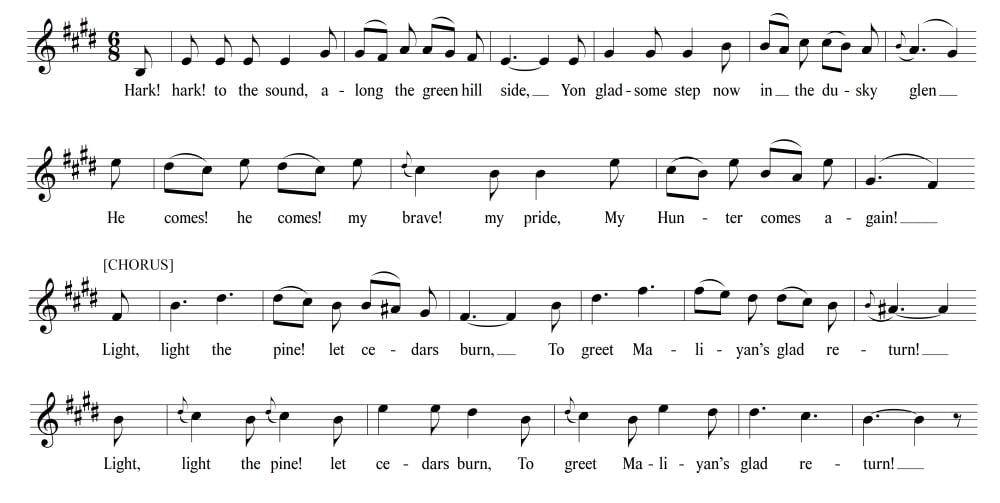
-
Synthesised sound file, Australharmony 2018
1842 - Mable Macmahon - Your eyes have the blackberry's lustre (music: Nathan)
Shareable link to all Trove items tagged Mable Macmahon (Dunlop-Nathan)
https://trove.nla.gov.au/search?l-publictag=Mable+Macmahon+(Dunlop-Nathan) (TROVE tagged by Australharmony)
For main entry in checklist:
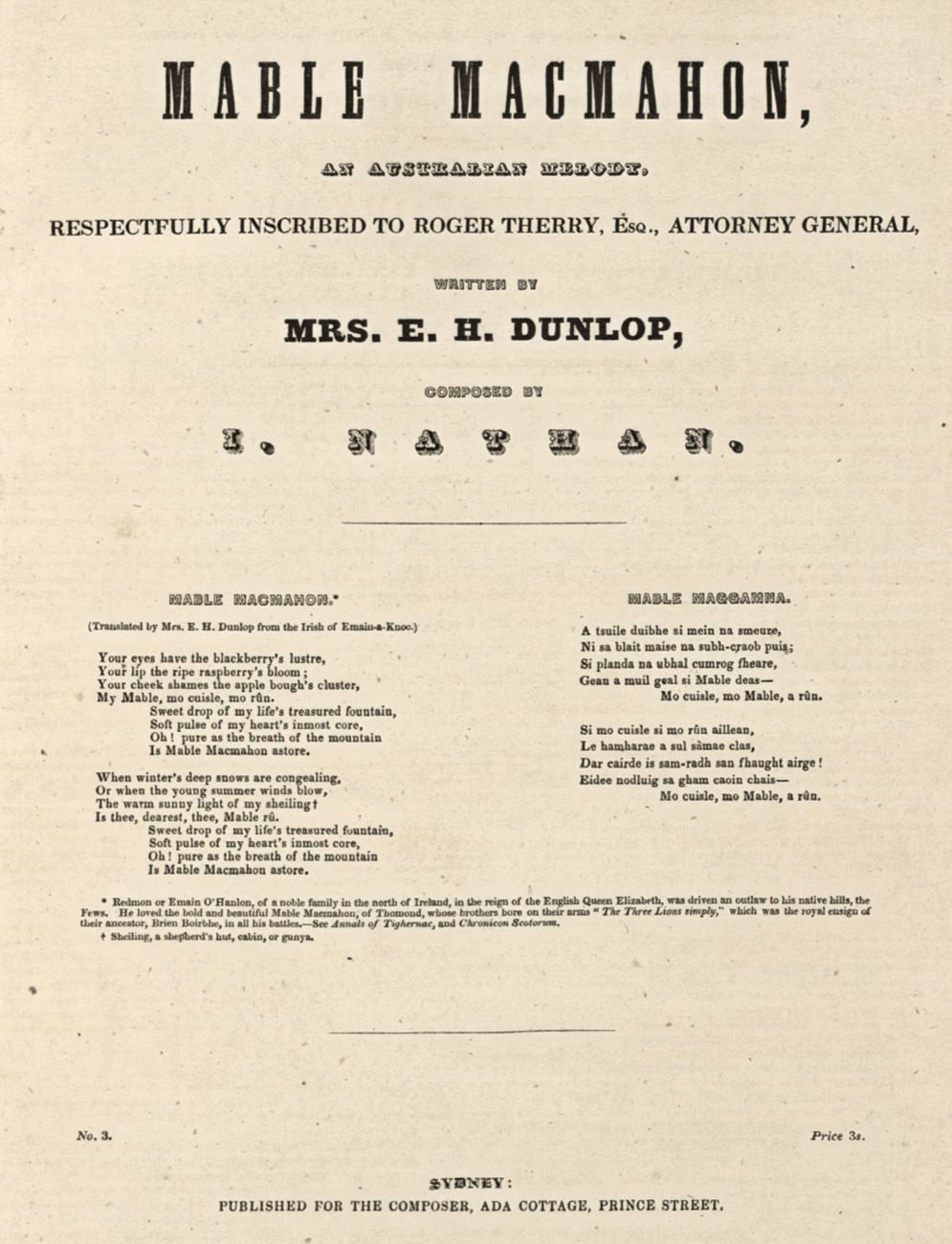
Sources:
Mable Macmahon, an Australian melody, respectfully dedicated to Roger Therry, Esq., attorney general, written by Mrs. E. H. Dunlop, composed by I. Nathan (Sydney: Published for the composer, Ada Cottage, Prince Street, n.d. [1842])
https://trove.nla.gov.au/work/16497075 (DIGITISED)
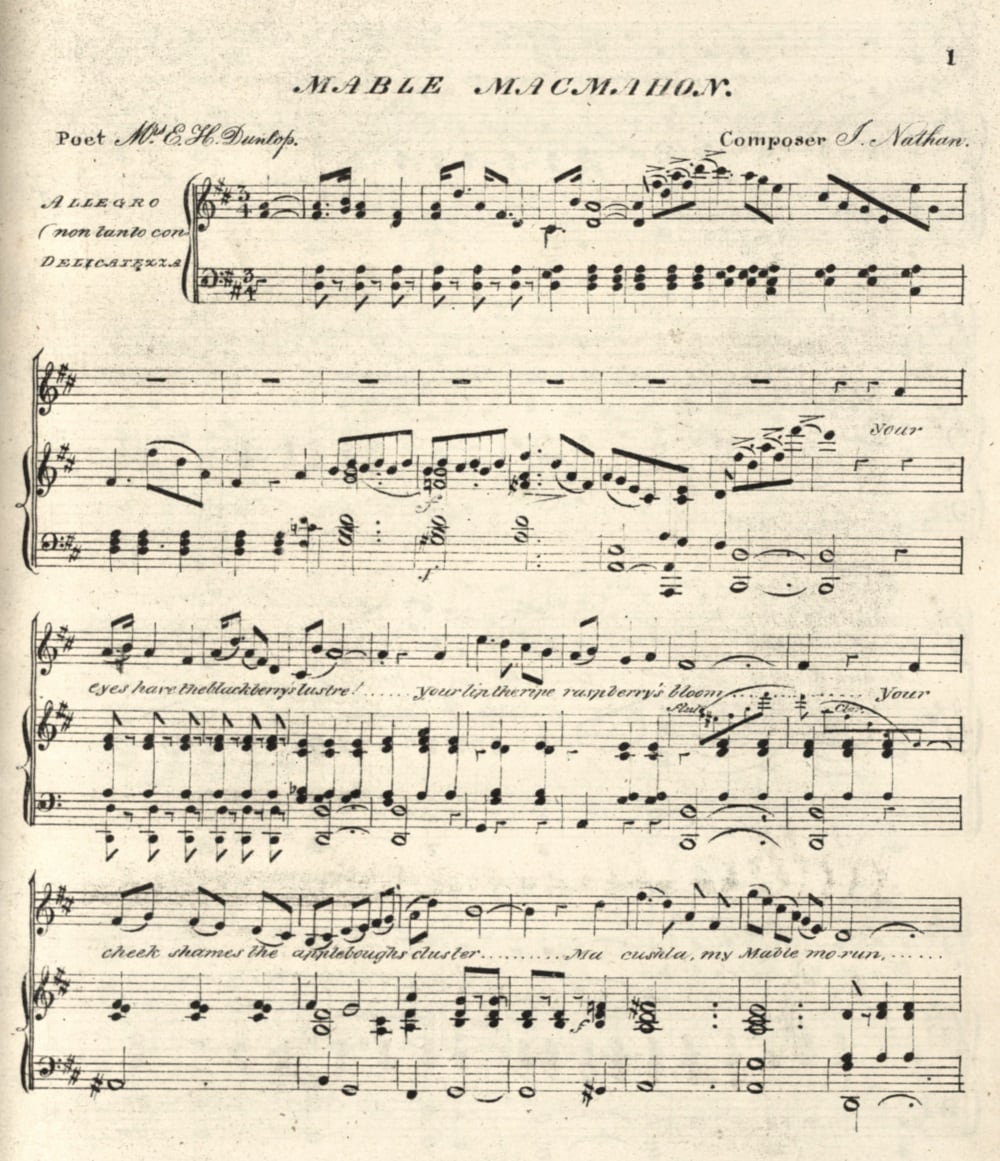
Synthesised sound file, Australharmony 2018
MABLE MACMAHON. *
(Translated by Mrs. E. H. Dunlop from the Irish of Emain-a-Knoc.)
Your eyes have the blackberry's lustre,
Your lip the ripe raspberry's bloom;
Your cheek shames the apple bough's cluster,
My Mable, mo cuisle, mo rûn.
Sweet drop of my life's treasured fountain,
Soft pulse of my heart's inmost core,
Oh! pure as the breath of the mountain
Is Mable Macmahon astore.
When winter's deep snows are congealing,
Or when the young summer winds blow,
The warm sunny light of my sheiling +
Is thee, dearest, thee, Mable rû.
Sweet drop of my life's treasured fountain,
Soft pulse of my heart's inmost core,
Oh! pure as the breath of the mountain
Is Mable Macmahon astore.
* Redmon or Emain O'Hanlon, of a noble family in the north of Ireland, in the reign of Queen Elizabeth, was driven an outlaw to his native hills, the Fews. He loved the bold and beautiful Mable Macmahon, of Thomond, whose brothers bore on their arms "The Three Lions simply," which was the royal ensign of their ancestor, Brien Boirbhe, in all his battles. - See Annals of Tighernac, and Chronicon Scotorum.
+ Sheiling, a shepherd's hut, cabin, or gunya.
MABLE MAGGAMNA.
A tsuile duibhe si mein na smeure,
Ni sa blait maise na subh-craob puis;
Si planda na ubhal cumrog fheare,
Gean a muil geal si Mable deas -
Mo cuisle, mo Mable, a rûn.
Si mo cuisle si mo rûn aillean,
Le hamharae a sul samae clas,
Dar cairde is sam radh san fhaught airge!
Eidee nodluig sa gham caoin chais -
Mo cuisle, mo Mable, a rûn.
The vase (with explanatory notes)
http://digital.sl.nsw.gov.au/delivery/DeliveryManagerServlet?dps_pid=FL9674370 (DIGITISED)
[note 81] . . . Nathan, with good taste dedicated the above to one of the most worthy and most esteemed Irishmen in Australia: the then, Attorney General, his honor Judge Therry . . .
Documentation:
[Advertisement], The Sydney Herald (27 May 1842), 1
http://nla.gov.au/nla.news-article12875418
The Spacious Hall, Sydney College, A GRAND SELECTION OF VOCAL & INSTRUMENTAL MUSIC, WILL be performed THIS EVENING, the 27th May, 1842. The Overtures and the whole of the Music, expressly arranged for full orchestra (which, by the politeness of Colonel French, will include the Band of the 28th Regiment) by Mr. Nathan . . .
PROGRAMME . . . PART II . . . MABLE MACMAHON. - Song. (A new Australian Melody, by Mrs. Dunlop, inscribed to Roger Therry, Esq., the Attorney-General,) - a Young Lady - Nathan . . .
"ORIGINAL CORRESPONDENCE. CONCERT. To the editor", The Australian (31 May 1842), 2
http://nla.gov.au/nla.news-article37115169
. . . A second new Australian melody by Mrs. Dunlop was sung by a young lady . . .
[Advertisement], The Sydney Herald (8 July 1842), 1
http://nla.gov.au/nla.news-article12876054
THE SPACIOUS HALL, SYDNEY COLLEGE. MR. NATHAN'S FIRST ANNUAL BENEFIT CONCERT Of Vocal and Instrumental Music, in aid of the Funds exclusively for the Benevolent Asylum, will take place, under the sanction of the Committee, at the spacious Hall, Sydney College, THIS EVENING, the 8th of July, 1842 . . .
PROGRAMME. PART SECOND . . . Mable Macmahon - An Australian Melody - Nathan . . .
"NEW MUSIC", Australasian Chronicle (21 July 1842), 2
http://nla.gov.au/nla.news-article31736598
Mable Macmahon: words by Mrs. Dunlop, music by I. Nathan. Inscribed to R. Therry, Esq., Attorney General. Sydney, 1842.
This is No. 3 of the Australian Melodies, and, so far as respects the melody itself, is perhaps the best of the series. It is in the key of D major, three fourth time, and has a very full pianoforte accompaniment, in which the composer, as usual, gives a richness to his harmony by preserving the fifth in the left hand and dropping it in the right. At the end of each phrase of the melody there is an ad libitum passage for a flute and clarionet, which, soaring above the full, deep, common chords of the tonic, relative minor, and dominant, have a very elegant effect.
The words are translated by Mrs. Dunlop from an old Irish song, which, as some of our readers are conversant with that language, we give, together with Mrs. Dunlop's elegant version. The story relates to a young Irish noble named Redmon or Emain O'Hanlon, who, in the reign of Queen Elizabeth, was driven an outlaw to his native hills, the Fews. He loved the bold and beautiful Mable Macmahon, who is the heroine of the song.
MABLE MAGGAMNA.
A tsuile duibhe si mein na smeure,
Ni sa blait maise na subh-craob puis;
Si planda na ubhal cumrog fheare,
Gean a muil geal si Mable deas -
Mo cuisle, mo Mable, a rûn.
Si mo cuisle si mo rûn aillean,
Le hamharae a sul samae clas,
Dar cairde is sam radh san fhaught airge!
Eidee nodluig sa gham caoin chais -
Mo cuisle, mo Mable, a rûn.
MABLE MACMAHON.
(Translated by Mrs. E. H. Dunlop from the Irish of Emain-a-Knoc.)
Your eyes have the blackberry's lustre,
Your lip the ripe raspberry's bloom;
Your cheek shames the apple bough's cluster,
My Mable, mo cuisle, mo rûn.
Sweet drop of my life's treasured fountain,
Soft pulse of my heart's inmost core,
Oh! pure as the breath of the mountain
Is Mable Macmahon astore.
When winter's deep snows are congealing,
Or when the young summer winds blow,
The warm sunny light of my sheiling
Is thee, dearest, thee, Mable rû.
Sweet drop of my life's treasured fountain,
Soft pulse of my heart's inmost core,
Oh! pure as the breath of the mountain
Is Mable Macmahon astore.
"MR. NATHAN AND HIS AIRS IN AUSTRALIA", The Sydney Gazette and New South Wales Advertiser (18 August 1842), 3
http://nla.gov.au/nla.news-article2557151
To any one at all conversant with the sublime science of music, it must appear that the land we love promises as fair as ever did Italia; and there may be found, yet, some day, a feminine admirer of the divinity of sounds equal to the celebrated, but unfortunate, Mary Queen of Scots, and a performer as Sardanapalian as the equally unfortunate Rizzio. Mr. Nathan, since his arrival amongst us, has earned "golden opinions of all sorts of men," and his endeavours to set to music the poetry of the highly gifted Mrs. Dunlop, adds another laurel to the crown won by his meritorious adaptation of Byron's Hebrew melodies. Still, "Koorinda Braia" strikes us, with all its nativeness, as a hoax on that science which is a kin to mathematics; and if any one more gifted than another with the rudiments of Apollo's school can descry a refinement of harmony in the aforesaid "Koorinda Braia," we lay our judgment on the shelf. "Star of the South," and "Mable Macmahon" have but an ordinary standing, in our opinion, to a good judge; still are there beauties of composition in the music, as well as the poetry, which deserved much admiration, and we would fondly hope that the fair authoress of the poetry, and the renowned composer of the music will long live to establish the fame of Australia. -
[We insert the above facetious paragraph which has been written for our columns by an itinerant musician.
Mr. N. cannot take offence at the jealousy of the poor unfortunate whose pocket and elbows bear a great similitude, being both - out.
- ED. SYD. GAZ.]
Words and melody edition (first verse only underlaid):

Synthesised sound file, Australharmony 2018
Commentary:
- - -
References:
- - -
1842 - Star of the south - Hail star of the south, Australasia advance (music: Nathan)
Shareable link to all Trove items tagged Star of the south (Dunlop-Nathan)
https://trove.nla.gov.au/search?l-publictag=Star+of+the+south+(Dunlop-Nathan) (TROVE tagged by Australharmony)
For main entry in checklist:
Sources:
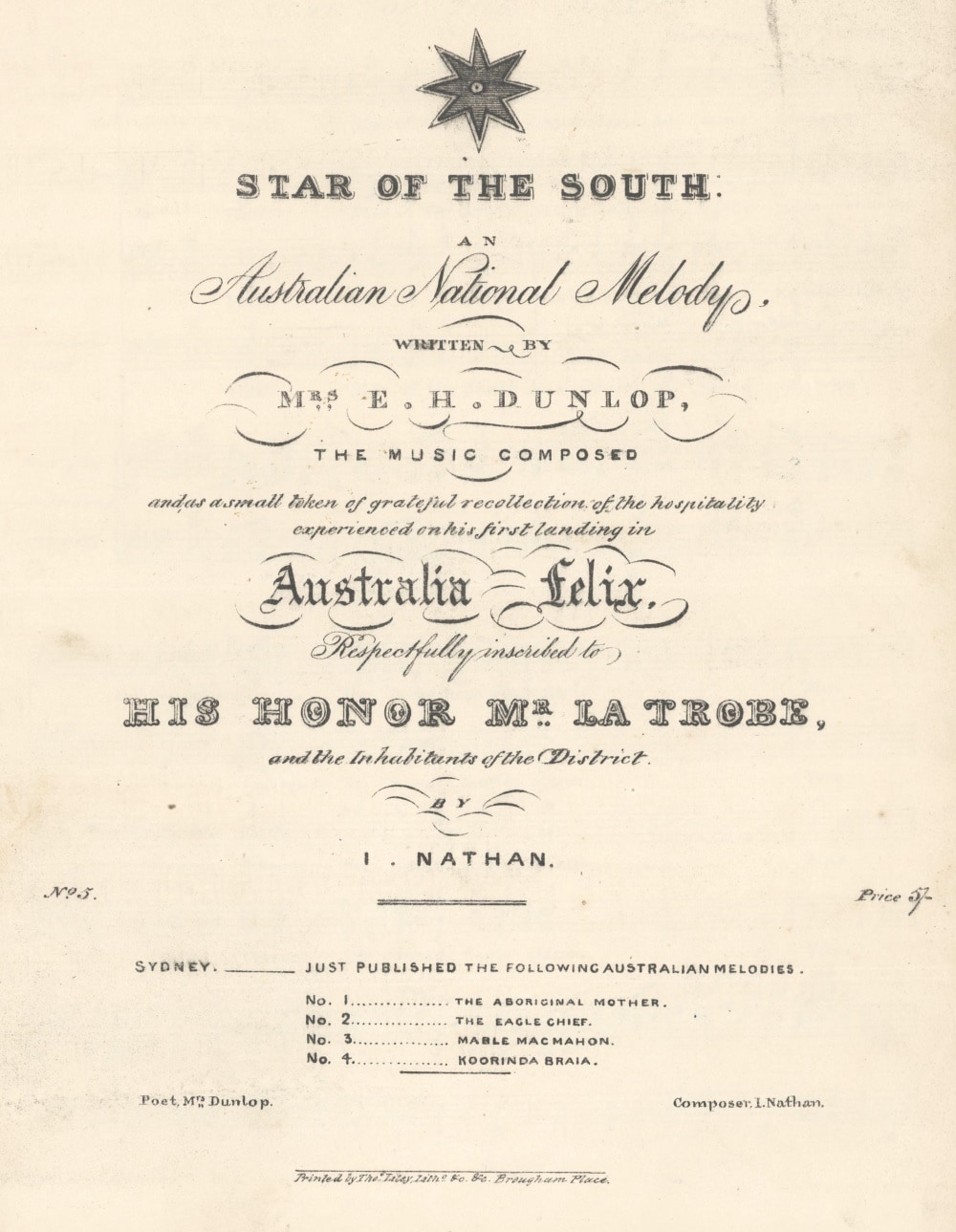
Star of the south, an Australian national melody, written by Mrs. E. H. Dunlop, the music composed and as a small token of grateful recollection of the hospitality experienced on his first landing in Australia Felix, respectfully inscribed to his honor Mr. La Trobe, and the inhabitants of the district, by I. Nathan (Sydney: Printed by Thos. Liley, Litho. &c. &c., Brougham Place, n.d. [1842])
https://trove.nla.gov.au/work/15080814 (DIGITISED)
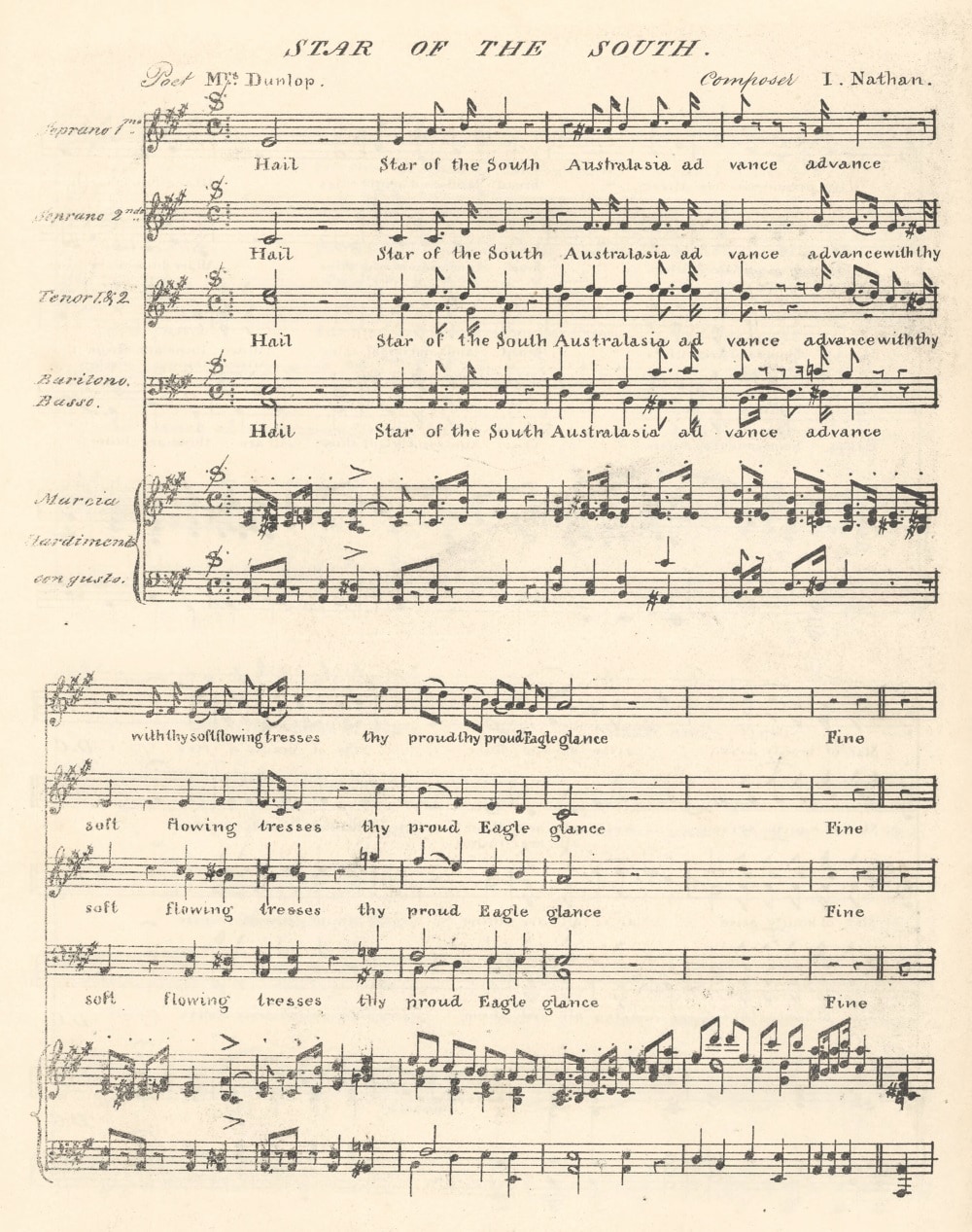
Synthesised sound file, Australharmony 2018
The vase (note: "published in Nathan's Australian Melodies")
http://digital.sl.nsw.gov.au/delivery/DeliveryManagerServlet?dps_pid=FL9674322 (DIGITISED)
Documentation:
"NEW MUSIC", The Sydney Morning Herald (9 August 1842), 3
http://nla.gov.au/nla.news-article12419051
Mr. Nathan, with most laudable industry, seems resolved upon establishing for us a music of our own. We have now before us his fifth Australian composition "Star of the South," an "Australian National melody;" the composition pleases us much, and we allow it to possess no small amount of beauty and merit in pronouncing it to be one of Mr. Nathan's best. The air is what a national air should be - Majestic, but it is at the same time flowing and pleasing, and is enriched throughout with most effective communications, whether we listen as an idler, or scrutinize the harmonies with more critical industry, we have nought but delight, as far as the composer is concerned. We wish, for gallantry sake, that we could speak of the poetry in the same terms, but we cannot, even in our most allegorical mood, imagine what the "Star of the South" has to do with either "Soft flowing tresses," or "Proud eagle glance." It is not polite of us, but we do wish that the new "National Melody" had been set to better words.
"NEW MUSIC", Australasian Chronicle (11 August 1842), 3
http://nla.gov.au/nla.news-article31736838
Star of the South, an Australian National Melody. Words by Mrs. E. H. Dunlop; music composed and dedicated to his Honor M. Latrobe and the inhabitants of Australia Felix by I. Nathan.
Mr. Nathan has been guilty of a misnomer in calling this a melody, for it is rather a bundle of melodies, bound together and progressing in six vocal parts, two sopranos, two tenors, a baritone, and a bass; the piano accompaniment being also for the most part a distinct composition, as it is indeed in nearly all Mr. Nathan's works. This arrangement, while it enriches the general effect, takes away the "glee" character from the composition, and the present work must be considered chiefly as a grand sestett and chorus. It commences in the key of A major, in the Maestoso style, the instrumental part being throughout a march, on which the voice parts are engrafted with a degree of skill and ingenuity which recalls some of Mr. Nathan's earlier and more successful efforts. This movement is repeated as a chorus at the end of every couplet. We give the words -
CHORUS - in six parts.
Hail, star of the south! Australasia, advance, With thy soft flowing tresses, thy proud eagle glance.
SESTETT.
Happy homes and free altars, broad lands and bright skies -
All are thine - star of beauty, arise!
Chorus: Hail, star, &c.
Advance! for the Sybil hath written thy name,
And futurity opens the volume of fame:
Wit, valour, and virtue, the heart's treasured ties,
All are thine - Australasia, arise!
Chorus: Hail, star, &c.
TRIO - tenore, baritone, and bass.
Advance! let the right hand of fellowship join,
Bid faith be the plummet and truth be the line;
There are rights we could die for and blessings we prize
They are thine - Australasia, arise!
Chorus: Hail, star, &c.
In the trio the key changes to D 2-4 time, and the bass takes the principal melody, something after the style of Corelli, afterwards it returns to the original key, when the sopranos come in, introducing a chord which has a singular effect, but which we have been yet unable sufficiently to comprehend, except as a licence, namely, the 7-4-2 with a diminished 6. This movement concludes like the preceding, on the dominant of the key with the chord the 7, and the whole finishes with the first grand chorus. It is of course impossible to judge of the full effect of this elaborate piece without hearing the parts simultaneously, but this we venture to say, that it will, if we are not entirely mistaken, obtain a hearty encore on whatever occasion it shall be well performed.
"MR. NATHAN AND HIS AIRS IN AUSTRALIA", The Sydney Gazette and New South Wales Advertiser (18 August 1842), 3
http://nla.gov.au/nla.news-article2557151
To any one at all conversant with the sublime science of music, it must appear that the land we love promises as fair as ever did Italia; and there may be found, yet, some day, a feminine admirer of the divinity of sounds equal to the celebrated, but unfortunate, Mary Queen of Scots, and a performer as Sardanapalian as the equally unfortunate Rizzio. Mr. Nathan, since his arrival amongst us, has earned "golden opinions of all sorts of men," and his endeavours to set to music the poetry of the highly gifted Mrs. Dunlop, adds another laurel to the crown won by his meritorious adaptation of Byron's Hebrew melodies. Still, "Koorinda Braia" strikes us, with all its nativeness, as a hoax on that science which is a kin to mathematics; and if any one more gifted than another with the rudiments of Apollo's school can descry a refinement of harmony in the aforesaid "Koorinda Braia," we lay our judgment on the shelf. "Star of the South," and "Mable Macmahon" have but an ordinary standing, in our opinion, to a good judge; still are there beauties of composition in the music, as well as the poetry, which deserved much admiration, and we would fondly hope that the fair authoress of the poetry, and the renowned composer of the music will long live to establish the fame of Australia. -
[We insert the above facetious paragraph which has been written for our columns by an itinerant musician.
Mr. N. cannot take offence at the jealousy of the poor unfortunate whose pocket and elbows bear a great similitude, being both - out.
- ED. SYD. GAZ.]
"SEMI-WEEKLY ABSTRACT", Port Phillip Gazette (27 August 1842), 2
http://nla.gov.au/nla.news-article225010020
A series of Songs, under the appropriate designation of "Australian Melodies," composed by the poets and poetesses of the colony, and set to music by the celebrated composer Nathan, have been lately published in Sydney. No. 5 (a copy which we have just received) is from the pen of Mrs. E. H. Dunlop, and entitled "The Star of the South;" it is dedicated with a peculiar and fine reeling of gratitude, by the composer, to "His Honor Mr. La Trobe and the Inhabitants of the District, as a small token of grateful recollection of the hospitality experienced on his first landing in "Australia Felix." The words are - . . .
The letter-press of the composition - the music and poetry - is lithographed by T. Liley, of Brougham-place, Sydney, and presents a fair specimen of colonial art. These melodies - national in their feelings and origin - we trust to hear breathed in the silver voices, and familiar to the legend tongues, of the mothers and daughters of our adopted land.
"THE STAR OF THE SOUTH. To the Editors", The Sydney Morning Herald (30 August 1842), 3
http://nla.gov.au/nla.news-article12426027
GENTLEMEN, - In noticing the publication of the national melody, Star of the South, in The Sydney Morning Herald, that paper has not, in my belief, faithfully discharged its duty to the reading public or to its numerous patrons. The song, an offering to the people of New South Wales, should have been published by the Critic to enable the many to form their own judgment of its fitness for the period when we can for the first time be truly designated A PEOPLE; of the simpleness and truth of those sentiments which it embodied; and of its merit or demerit as English poetry. To have given that poetry to your readers unslurred by prejudicial remark, would have been no more than justice to a pen, not a paid one, but proud of contributing its quota to the original literature of the colony. But has not the author added to a former offence, against a formidable clique, by saying that Australia possesses "happy homes and altars free?" and, by ascribing the moral bulwarks of a nation to this young country, offended by declaring, in the name of the People, that we value the blessings we possess, and that the advancement or ascent of Australasia in the scale of the nations of the earth should, in full fellowship of feeling with the sons and daughters of the land, be the honest desire of all those who have found a refuge and a rest within it?
If in all this the author has offended, be it so; "what is written, is written," and neither to be suppressed or amended by the flippant remarks, or vulgarly familiar style of criticism assumed by a "self constituted judge of poesy," who, in his haste to condemn, appears to have forgotten this truth--
In Poets, if true genius is but rare,
True taste, as seldom, is the Critic's share.
For the taste of choosing allegory, or rather the licentia-poetica of personifying this, the home of dear household deities, as a "Star of the South," "A young eyed Majesty," - the author, quoting Pope, has "at least a precedent to plead," and maintains in all its bearings, that Australasia, the fair "Queen of the South" may be called on by orator or poet, as a "Star of beauty," a Star having many glorious attributes - not alone "broad lands and bright skies," but that, which none who have looked upon the women of the land can disallow, peculiar loveliness and native grace; nor are the soft flowing tresses and proud eagle glances confined to a grade, but found equally under the gilded cornices in Sydney as in the weather-boarded cottages of the "Wollombi and Macdonald river;" but the second Jeffrey affirms that the stars have nothing to do with soft tresses or proud glances. MILTON says,--
The planets, in their stations list'ning stand -
further
Now, the bright morning star, harbinger,
Comes dancing from the east.
And, who, among our modern Dominies dare essay to break a lance with him who has written that
The parting banners of the king of light,
Gleam round the temples of each living star,
Aye, or sneer at LEYDEN, who, quoting from the Arabic, thus - "Dost sleep, while wakes yon star's refulgent eyes?" It cannot be, that amid "the untrodden ways" of the Wollombi, or by the lagoons of Wattagan Creek, an humble hut should furnish the writer with such precious stores of rule and precedent, as may be hourly drawn in the City from a master's library; but the inherited and inheritable mind, long as it hath been worn in the world's rude setting, may even yet retain the lustre of the original gem; and, with all the memories of a prouder day, may like her who "dwelt among her own people," say in words long ago used by the loving and beloved,--
I care not for the praise, love, so sweet to minstrel's ear,
For the laurel or the bays, love, the critic or his sneer;
But promise me to sing love, my songs in after years,
When the quiet eve shall bring, love, the hour for blissful tears.
E. H. D.
Wollombi, 19th Aug., 1842.
[As Mrs. Dunlop appears to wish that her song should have a place in the columns of the Herald, we have not the slightest objection to oblige her, as we have no doubt most of our readers will concur in the judgment we passed on its merits when it was first published. We admire, as much as Mrs. Dunlop can possibly do, "happy homes and free altars," but it does not follow that we should admire bad poetry written in their praise.--EDS.]
Hail, star of the south! Australasia . . .
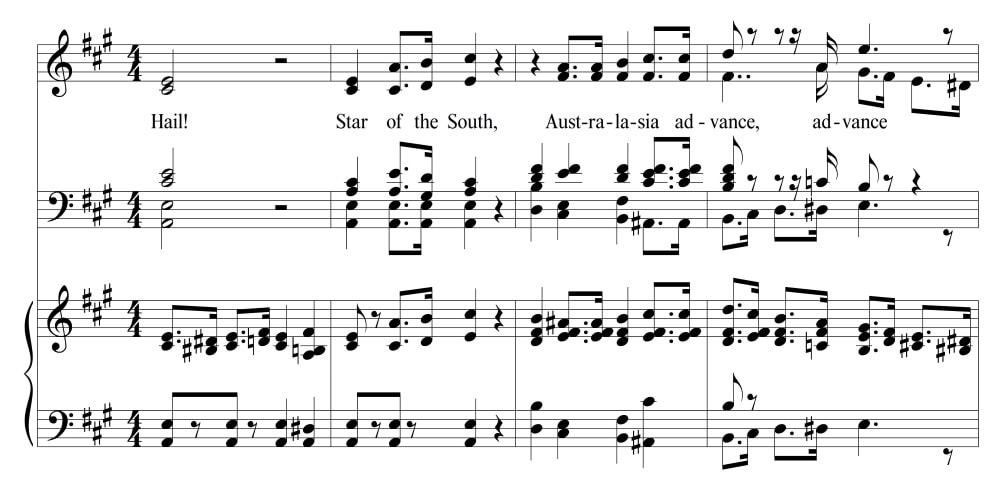
Opening, voices on upper pair of staves, instrumental accompaniment on lower pair
Commentary:
- - -
References:
- - -
1843- The Aboriginal father - The shadow on thy brow, my child (Tune: Indigenous, after Lhotsky 1834; arr. Nathan)
Shareable link to all TROVE items tagged The Aboriginal father (Dunlop-Nathan)
https://trove.nla.gov.au/search?l-publictag=The+Aboriginal+father+(Dunlop-Nathan) (TROVE tagged by Australharmony)
For complete documentation see main entry in checklist:
https://sydney.edu.au/paradisec/australharmony/checklist-indigenous-music-1.php#008
And in indigenous song checklist:
Sources:
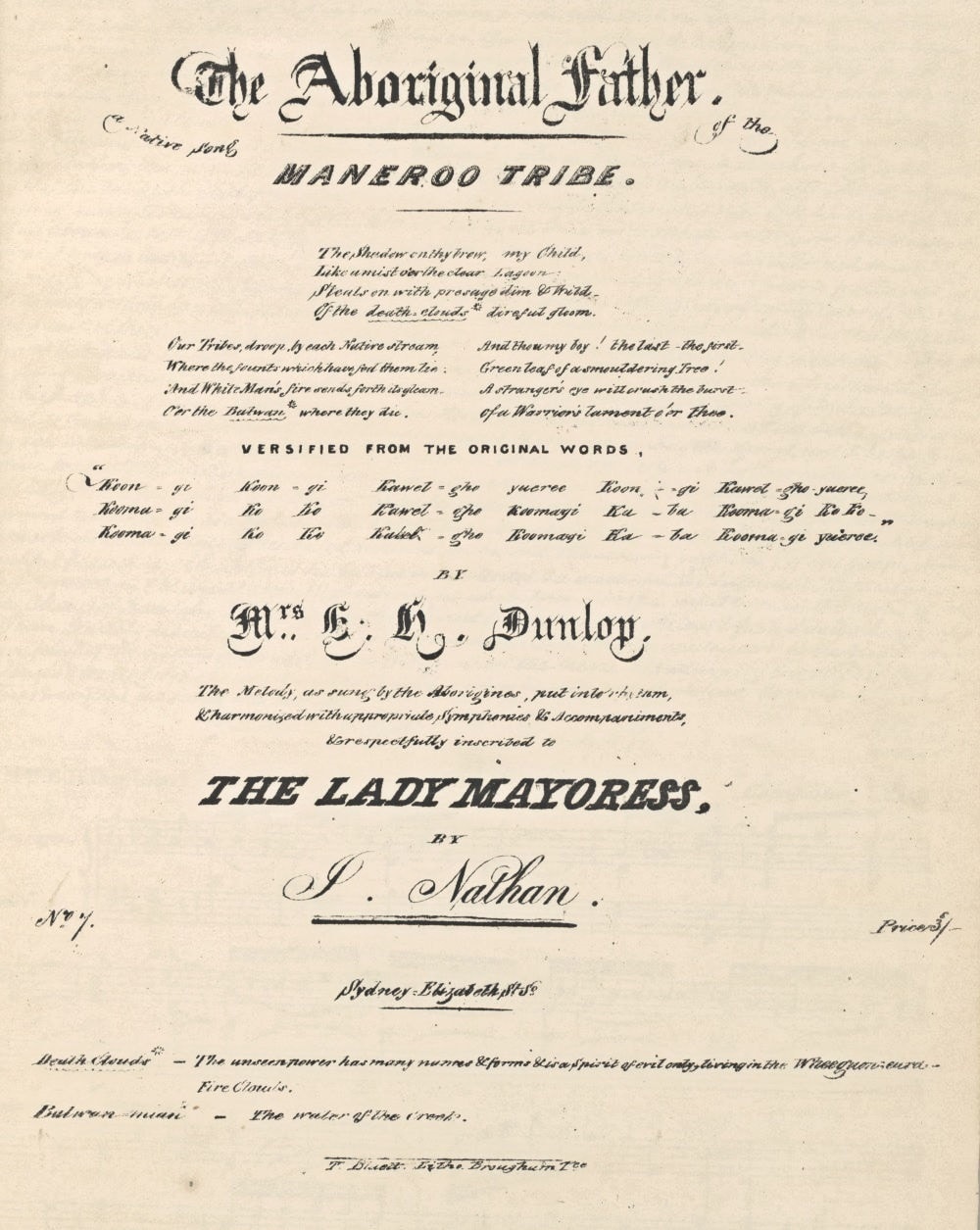
The Aboriginal father, a native song of the Maneroo Tribe . . . versified from the original words . . . by Mrs. E. H. Dunlop, the melody, as sung by the Aborigines, put into rhythm & harmonized with appropriate Symphonies & accompaniments, respectfully inscribed to the lady mayoress, by I. Nathan (Sydney: [I Nathan], Elizabeth Street; T. Bluett, Litho[grapher], Brougham Place, n.d. [1843])
https://trove.nla.gov.au/work/16497064
http://nla.gov.au/nla.obj-165998456 (DIGITISED)
ASSOCIATIONS: Martha Hosking (dedicatee)
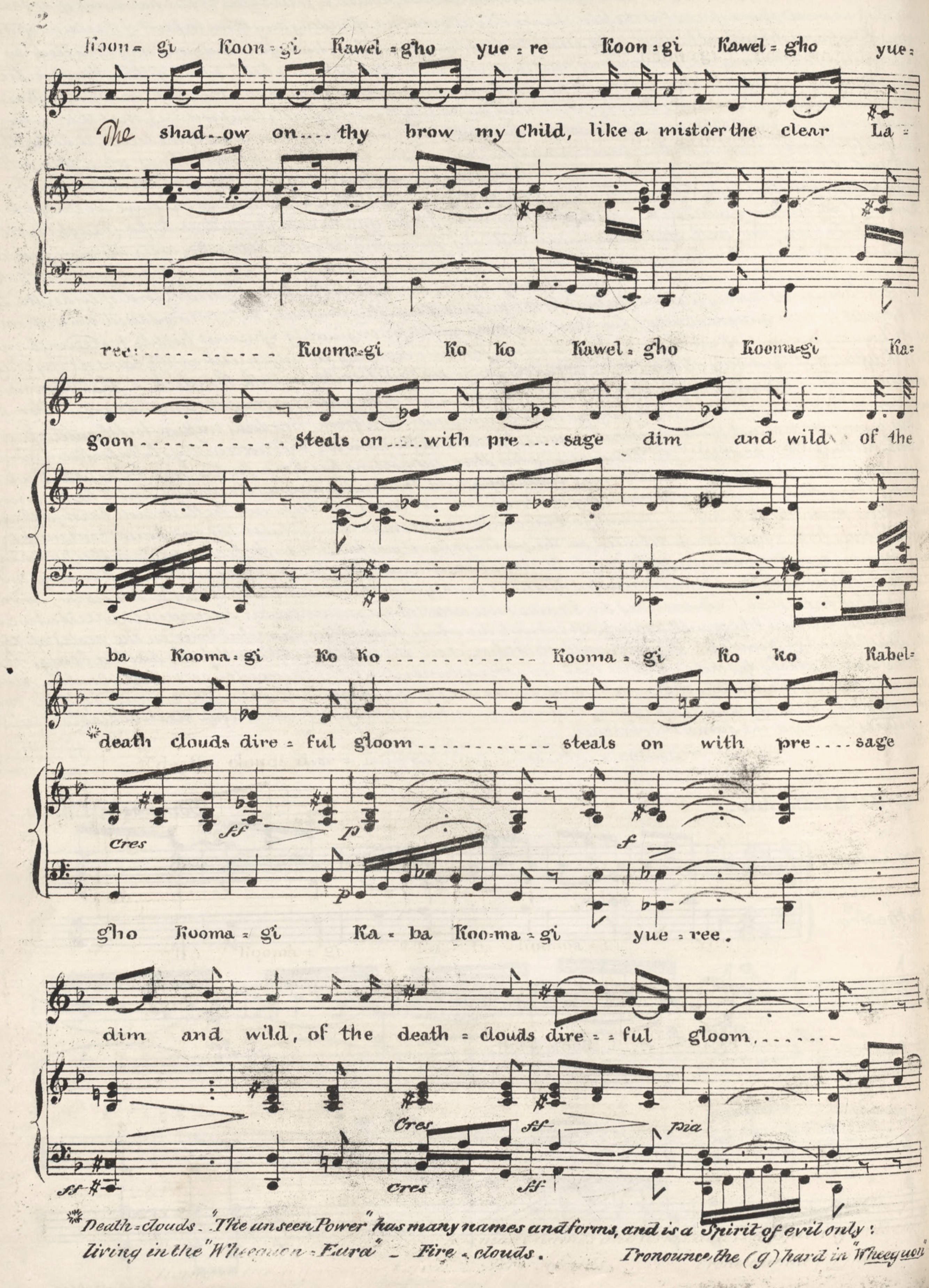
Synthesised sound file, Australharmony 2018
The Aboriginal Father, a Native Song of the Maneroo Tribe.
The Shadow on thy brow, my child,
Like a mist o'er the clear Lagoon,
Steals on with presage dim & wild
Of the death clouds' [1] direful gloom.
Our Tribes droop by each Native stream
Where the founts which have fed them lie;
And White Man's fire sends forth its gleam,
O'er the Batwan [2] where they die.
And thou my boy! the last - the first
Green leaf of a smouldering Tree!
A stranger's eye will crush the burst
Of a Warrior's lament o'er thee.
VERSIFIED FROM THE ORIGINAL WORDS,
"Koon-gi Koon-gi Kawel-gho yueree Koon-gi Kawel-gho-yueree,
Kooma-gi Ko Ko Kawel-gho Koomagi Ka-ba Kooma-gi Ko Ko
Kooma-gi Ko Ko Kawel-gho Koomagi Ka-ba Kooma-gi yueree."
By Mrs. E. H. Dunlop.
1. Death clouds. The unseen power has many names & forms & is a Spirit of evil only, living in the Wheeguon-eura
2. Batwan-mian. The water of the creek.
The vase
http://digital.sl.nsw.gov.au/delivery/DeliveryManagerServlet?dps_pid=FL9674355 (DIGITISED)
Documentation:
Letter, Isaac Nathan, Sydney, 10 January 1843, to Eliza Dunlop; unseen original, noted in De Salis papers
Another letter from I. Nathan is dated Jan'y 10th, 1843.
De Salis merely noted the letter's existence, but did not transcribe or describe it contents
"NEW MUSIC", The Sydney Morning Herald (19 January 1843), 2
http://nla.gov.au/nla.news-article12411279
"The Aboriginal Father, a Native Song of The Maneroo Tribe," put into rhythm and harmonised by J. Nathan, versified from the original words by Mrs. E. H. Dunlop, dedicated by Mr. Nathan to the Mayoress.
Among the many compositions with which Mr. Nathan has favoured us during his residence in Australia, none has pleased us more than the above song: it is in every respect worthy of the composer of the Hebrew Melodies. The melody (in D minor) is very beautiful, and capable of great effects from harmonization. Mr. Nathan has realised all these in the most judicious and scientific style. The air was taken by Mr. Nathan from one of the Maneroo tribe, but it certainly savours strongly of the compositions of Handel and Neukomm. Mr. Nathan is struck by this, and to save his black vocalists from the charge of plagiarism, enters into an amusing effusion by way of preface. It appears that we may yet discover much reason to be proud of our aboriginal composers, as the first four bars of this their own melody, is identical with four bars composed by the greatest musician that ever lived - and that, long before any white man came to live in these parts. But if this native melody is worthy of Handel, the arrangement by Mr. Nathan is no less so, - and we feel confident that it will be admired long after we of the present age have done with these matters. Many persons labour under the error that good music is necessarily complicated and difficult: the above song of Mr. Nathan's may undeceive them. It is replete with scientific progressions and combinations, and may be performed by any player who can count three in a bar. There are others who fancy that scientific harmonization is only to be appreciated by the musical theorist, - let them compare this song by Mr. Nathan with a former arrangement of the same air by another composer. We hope to see the "Aboriginal Father" an universal favourite, as the study of music of this sort must beget a correct taste for the science.
"NEW PUBLICATION", Australasian Chronicle (19 January 1843), 2
http://nla.gov.au/nla.news-article31738598
The Aboriginal Father, a Native Australian Song; translated by Mrs. Dunlop. The music put into rythm [sic] and harmonised by I. Nathan.
THE publication in quick succession of these Australian melodies (this is No. 7 of the series), and their steady improvement in character as they proceed, would seem to falsify the opinion that genius is fostered by patronage. We do not mean to say that each of these melodies is without the name of a patron or patroness on the title page, but if we are not misinformed, the author has in most cases found it "a name and nothing more." Be this as it may, we shall not fail in our duty of drawing the notice of our readers to the present song, which, simple as it looks, if it were to appear in London or Vienna as the first work of a young composer, would at once place that composer in the ranks of the great harmonists of the age. The songs that preceded it, under the title of "Australian Melodies," had all some [sic] marks of science and skill, but this is truly a harmonic gem, which Handel himself might have been proud to own. The melody is not here published for the first time. It was given to the world some years ago by Dr. Lhotsky, but in a very unattractive state, from the absurd harmonies with which it was accompanied. Those who have seen it before will barely recognise it now, and they will be very agreeably surprised at the metamorphosis it has undergone. The English words added by Mrs. Dunlop are pretty, and relate but "o'er true a tale."
The shadow on the brow, my child,
Like a mist o'er the clear lagoon,
Steals on with presage dim and wild,
Of the death cloud's direful gloom.
Our tribes droop by each native stream,
Where the forests which have fed them lie,
And white man's fire sends forth its gleam,
O'er the batwan where they die.
And thou my boy the last - the first
Green leaf of a smould'ring tree,
A stranger's eye will crush the burst,
Of a warrior's lament o'er thee.
[Advertisement], The Sydney Morning Herald (21 January 1843), 3
http://nla.gov.au/nla.news-article12417181
THIS DAY is published for the composer, Elizabeth-street South,
THE ABORIGINAL FATHER, A NATIVE MELODY; Inscribed to the MAYORESS.
Poetess, Mrs, Dunlop. Composer, J. Nathan.
ALSO, AUSTRALIA the WIDE and the FREE, A NATIONAL MELODY; Inscribed to JOHN HOSKINS, Esq., the Right Worshipful Mayor of Sydney.
Poet. W.A. Duncan, Esq. Composer, J. Nathan.
"THE ABORIGINAL FATHER", The Australian (27 January 1843), 3
http://nla.gov.au/nla.news-article37116848
Mr. Nathan has forwarded us a copy, of "The Aboriginal Father." We must postpone our remarks relative to the melody, but the note prefixed to the song being so peculiar, we deem it advisable to transfer it to our columns. Competent judges speak in high terms of the composer's merits.
On my arrival in Australia, I felt anxious for the honor, pride and glory of musical tradition, to make myself acquainted with the characteristic peculiarities of the native Aboriginal airs. I was favored with a lithographic copy of this beautiful pathetic melody, so deformed and mutilated by false rhyme [sic], so disguised in complete masquerade, by false basses and false harmony, that I cast it from me with no small share of regret at the poor chance thus afforded me of adding any thing in favor of the claim of the Aborigines to the pages of musical history. My astonishment, however, a short time afterwards, was only equalled by the delight I experienced at hearing the same melody sung in all its genuine purity and simplicity, by one of the Maneroo tribe. I at once discovered the key to its latent rhyme and excellent scope for good basses and rich transitions and progressions of harmony.
There is in the first four bars of this melody, so striking an affinity to one of Handel's compositions, that those who are acquainted with the works of that great master might find difficulty in divesting themselves of the belief, that the Aborigines had been guilty of piracy: sceptics on that point however may remove all doubt from their minds, when they reflect on the little probability of any one of these sable-faced gentlemen ever having graced Drury Lane or Covent Garden, by the sunshine of their polished countenances, to witness the performance of Handel's Oratorios. I have in early life read of a gruntling (in company with its accomplished mamma) who, unlike Selwyn in search of a daughter, or Japhet in search of a father, flow, with all the epicurean taste of a gourmand, across the Atlantic, after the more fascinating allurements of the calipash and calipee; and we have all been made acquainted with full particulars of Mohawne's journey to heaven on his ass (Al. Borak); but as we have no authenticated record of either the Loobrus or Gins of the Aborigines taking flight to England for the purpose of engaging composers, and of selecting sacred music from the works of Handel for their antipodal words, we must give them credit for originality, and prevent hostile proceedings in the Court of Chancery against them, by way of injunction for their seeming infringement on the laws of copy-right.
As to the affinity of the four bars alluded to, to Handel's song, we must exclaim with Bowdick [recte Bowdich], that there can be no stronger proof of the musical powers of these beings, nor of the nature of Handel's compositions. For the satisfaction of the curious I take leave to subjoin the following quotation from Bowdick's mission to Ashantee, page 451.
After giving an account of the musical powers of a white negro from the interior country of Imbeekee, describing his person, his harp, &c., he says, "The negro sat on a low stool, supporting his harp on his knee and shoulder, when he proceeded to time it to great nicety: his hands appeared to wander among the strings until he performed a running accompaniment to extra-ordinary vociferations. At times one deep and hollow note burst forth and became broken; presently he looked up, pursuing all the actions of a maniac, whilst the one hand continued playing, he rung forth a peal which vibrated on the ear long after it was produced; he became silent, the running accompaniment revived again, as a prelude to loud recitative, uttered with the greatest volubility, and ending with one word, on which he ascended and descended divisions far beyond the extent (in pitch) of his harp, with the most beautiful precision. Sometimes be became more collected, and a mournful air succeeded the recitative without the least connexion, and he would again burst out with the whole force of his powerful voice in the notes of the Hallelujah Chorus of Handel. To meet with this chorus in the wilds of Africa and from such a being, had such an effect I can scarcely describe; I was lost in astonishment at the coincidence: there could not be a stronger proof of the nature of Handel nor of the powers of the negro. I naturally enquired if this man was in his senses, and the reply was, he was always rational but when he played, at which time he invariably used the same gestures and evinced the same incoherency.
"MUSIC", The New South Wales magazine 1/2 (February 1843), (85), 86
https://www.nla.gov.au/ferguson/13295438/18430000/00010002/31-40.pdf
[85] In our last notice of this subject, we felt it necessary to descant in a strain which some may have considered lugubrious upon our present status as regards Musical taste, and Musical performances . . .
[86] . . . If it be true, as has been said by an eminent English writer, that the character of a nation is influenced in no small degree by its Amusements, and that, in the present age, Music ranks next to literature itself, amongst the National pursuits; viewing it also, as occupying so prominent a feature amongst the pleasures of domestic life, we cannot surely be accused of its decadence amongst ourselves, or of attaching too much importance to a subject in which all who value our improvement in an elegant science, must feel a deep interest.
Although there may be some who will demur to the truth of the position set forth in our first paper, that music has retrograded within the last two years, we think, few will assert that it has advanced. It is manifested in the number or quality of our public concerts, the prevalence of musical reunions in private life, the excellence of the choirs in our places of worship, the publication of original compositions, or in fact by any of those usual indications of "a healthy state" as regards either science or taste? To be sure a Nathan may throw a halo over our gloom, by a secretion from his versatile brain in honor of a Mayor or Mayoress, to be hiccuped at a Civic Banquet. He may dress an Aboriginal melody, in harmonies as meretricious and appropriate as the costume which Sir George Gipps, or Messrs. Pite and Preston, have designed to grace the court of Queen Pomare, still there is no indication of musical science, still less of advancement in musical taste - it is not worthy of the fame which claims a Byron, as his Lyrist, nor of a genius that can do better things . . .
ASSOCIATIONS: Thomas Henry Braim (editor, author)
[News], South Australian Register (25 February 1843), 4
http://nla.gov.au/nla.news-article2744404
A Poem, entitled the "Aboriginal Father," has been published in Sydney, by Mrs. Dunlop. In a note prefixed to the song, the author says: "On my arrival in Australia . . .
. . . rest selectively quoted from The Australian (27 January 1843) above
[Isaac Nathan], The southern Euphrosyne and Australian miscellany, containing . . . an historical sketch with examples of the native aboriginal melodies put into modern rhythm and harmonized as solos, quartettes &c. . . . arranged to a piano-forte accompaniment by the editor and sole proprietor I. Nathan (Sydney: [Nathan]; London: Whittaker & Co., [1848-49]), 104-05 (106-07)
Copy at National Library of Australia
https://nla.gov.au/nla.obj-166023361/view?partId=nla.obj-166035807#page/n113/mode/2up (DIGITISED)
Copy at Bodleian Library, Oxford
https://books.google.com.au/books?id=ziwieom4lBQC&pg=PA105 (DIGITISED)
[104] KOON-GI KAWEI GHO. On our arrival in Australia, we felt anxious for the honor, pride and glory of musical tradition, to make ourselves acquainted with the characteristic peculiarities of the native aboriginal airs. We were favored with a lithographic copy of this beautifully pathetic melody, so deformed and mutilated by false rhythm, so disguised in complete masquerade, by false basses and false harmony, that we cast it from us with no small share of regret at the poor chance thus afforded of adding any thing in favor of the claim of the aborigines, to the pages of musical history. Our astonishment however, a short time afterwards was only equalled, by the delight we experienced at hearing the same melody sung in all its genuine purity and simplicity, by one of the Maneroo tribe: we thus at once discovered the key to its latent rhythm, and excellent scope for good basses, rich transitions, and progressions of harmony . . . [as above]
[105] . . . The plaintive wild aboriginal melody before mentioned, was sung by the Maneroo tribe to the following native words:
"Koon-gi koon-gi kawel-gho yueree, koon-gi kawel-gho yueree,
Kooma-gi ko ko kawel-gho koomagi ka-ba kooma-gi ko ko -
Kooma-gi ko ko kawel-gho koomagi ka-ba kooma-gi yue-ree."
Which we forwarded to Mrs. Dunlop, the talented writer of several elegant poems. This Lady kindly favoured us with the subjoined characteristic stanzas - versified from the original words.
THE ABORIGINAL FATHER.
The shadow on thy brow, my child,
Like a mist o'er the clear Lagoon:
Steals on with presage dim and wild -
Of the death-clouds* direful gloom.
Our tribes, droop by each native stream,
Where the founts that have fed them lie;
And white man's fire sends forth its gleam,
O'er the Batwan+ where they die.
And thou my boy! the last - the first
Green leaf of a smouldering tree!
A stranger's eye will crush the burst
Of a Warrior's lament o'er thee.
[Footnotes]: Death clouds* - The unseen power has many names and forms; and is a spirit of evil only,
living in the Wheeguon-cura [CHECK SPELLING] - Fire Clouds.
Batwan-mian+ - The water of the Creek.
We regret that our Euphrosyne's appearance cannot now be delayed for a new edition of this melody, which we published a few years ago, but we look forward to the time - when, if it should please the great geometrician of the universe to permit us to visit some land of civilization, where science and literature may hold a small portion of conversation in the drawing room, as well as lambs wool and mutton fat, to re-publish this beautiful native air, with several other extraordinary musical relics - which, but for our timely arrival in this Colony, might for ever have sunk into oblivion . . .
Original source:
A song of the women of the Menero Tribe arranged with the assistance of several musical gentlemen for the voice and pianoforte, most humbly inscribed as the first specimen of Australian music, to her most gracious majesty Adelaide, queen of Great Britain & Hanover, by Dr. J. Lhotsky, colonist N. S. Wales (Sydney: Sold by John Innes, [1834])
Copy at the State Library of New South Wales
http://digital.sl.nsw.gov.au/delivery/DeliveryManagerServlet?embedded=true&toolbar=false&dps_pid=IE3727874 (DIGITISED)
https://trove.nla.gov.au/work/33504891 (TROVE)
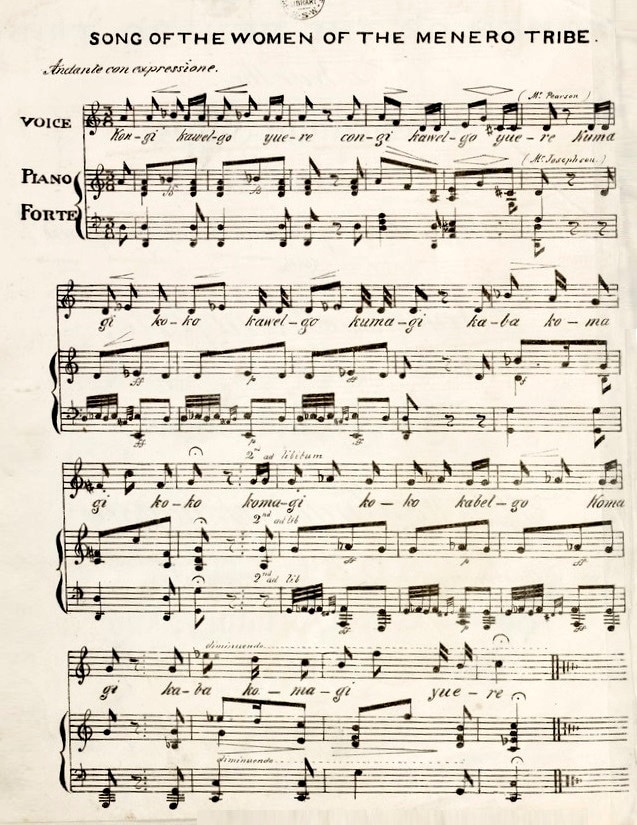
Synthesised sound file, Australharmony 2016
[page 2] SONG OF THE WOMEN OF THE MENERO TRIBE
Kongi kawelgo yuere congi kawelgo yuere Kuma
gi koko kawelgo kumagi kaba koma
gi koko komagi koko kabelgo koma
gi kaba komagi yuere
Words and melody edition (first stanza only):
Lhotsky 1834 original (grey, upper staff); Nathan 1843 (lower staff)
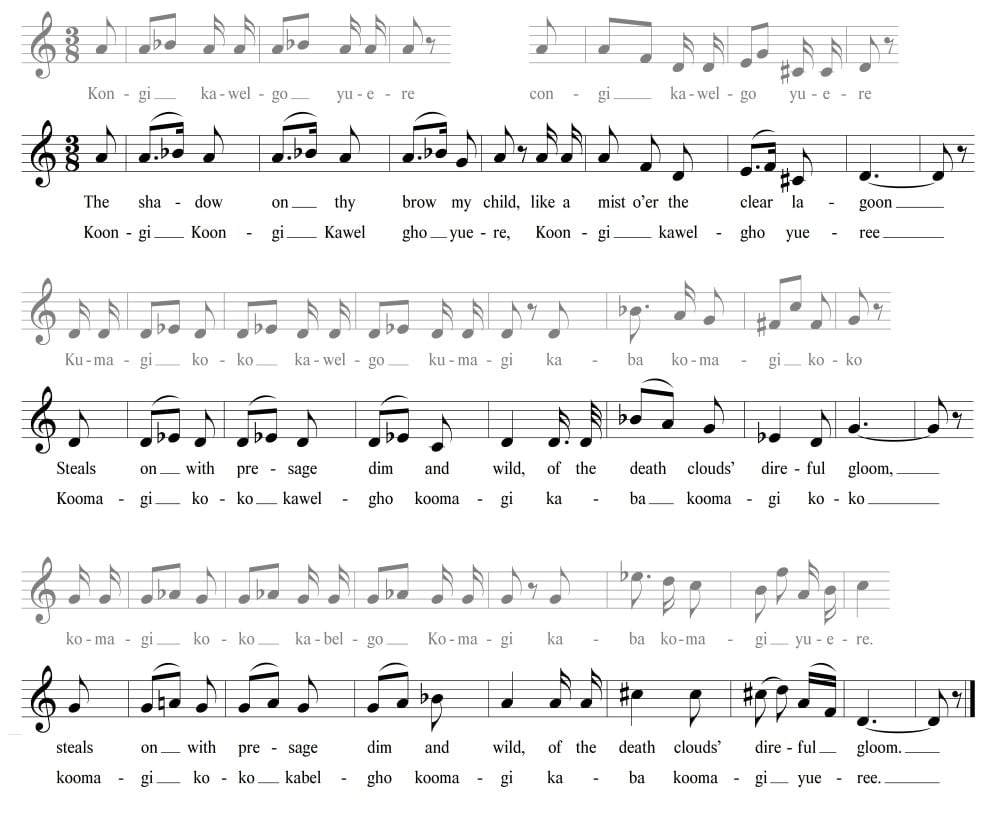
Synthesised sound file (Nathan 1843 only), Australharmony 2018
Commentary:
- - -
ASSOCIATIONS: John Lhotsky (collector, transcriber); James Pearson (arranger, melody); Joshua Frey Josephson (arranger, piano accompaniment)
References:
Nathan's quote from Bowdich:
Edward Bowdich, Mission from Cape Coast to Ashantee, with a statistical account of that kingdom, and geographical notices of other parts of the interior of Africa (London: John Murray, 1819), 450-51, see also music examples page facing 449
https://archive.org/stream/missionfromcapec00bowd#page/450/mode/2up (DIGITISED)
Nathan's immediate source was his own Musurgia vocalis (1836), 39, where he had earlier quoted this same passage:
https://books.google.com.au/books?id=g2dFAQAAMAAJ&pg=PA39 (DIGITISED)
1843 - The Irish volunteers - For the golden harp on field of green (Tune: The irish volunteers)
Commentary:
Dunlop used an Irish melody for her only known solo venture into sheet-music publication:
The Irish volunteers, dedicated to captain M. C. O'Connell, H. M. 28th Regt., the poetry by Mrs. E. H. Dunlop; the music composed by a professor in Dublin, in 1780.
It was published in Sydney in April 1843, and dedicated to Maurice O'Connell (1768-1848), the Irish-born commander of the colonial troops, and although no copy of the print itself has yet been identified (nor the name or names of the engraver and printer), Dunlop's words and the original march tune (by Elfort, published in Dublin in 1782) both survive separately, allowing a fairly reliable reconstruction to be made.
Elfort (not "Ellard", as mis-transcribed by Flood) was later composer of a popular harpsichord sonata, The Bastile; several works by him published in London and by Lee of Dublin, are now in the National Library of Ireland (search Elfort).
See also main entry in checklist:
https://sydney.edu.au/paradisec/australharmony/checklist1841-1845.php
Words and melody edition (first verse only underlaid):
The Irish volunteers (Dunlop 1843); March of the Irish volunteers (Elfort 1782, after Mooney 1853)
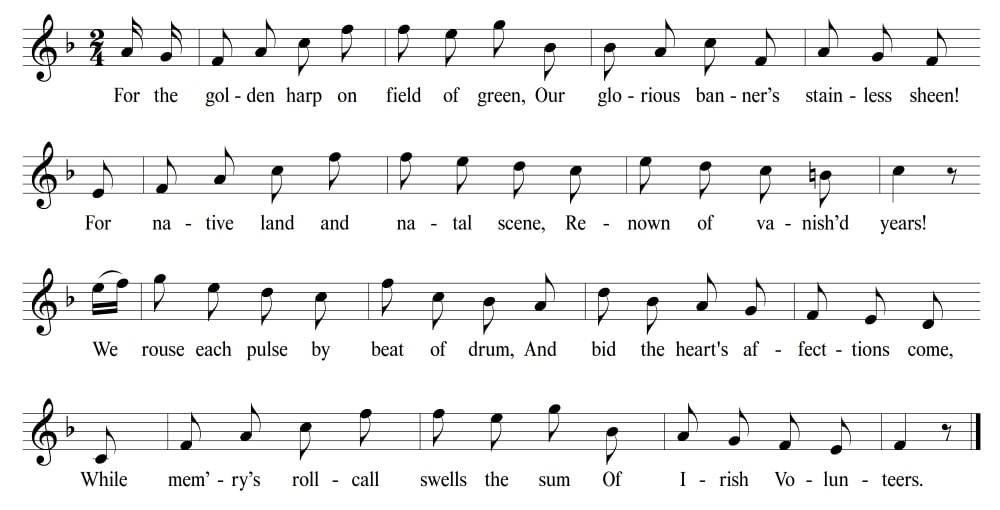
Synthesised sound file, Australharmony 2018
Sources and documentation:
The Irish volunteers, dedicated to captain M. C. O'Connell, H. M. 28th Regt., the poetry by Mrs. E. H. Dunlop; the music composed by a professor in Dublin, in 1780 ([? Sydney: ?, 1843])
NO COPY IDENTIFIED; words survive separately (see below)
[Review], The Australian (10 April 1843), 2
http://nla.gov.au/nla.news-article37115124
The copy of a pleasing song, composed by Mrs. Dunlop, and set to the original air of the "Irish Volunteers," has been politely handed to us. The following account of the air is interesting:
This simple noted air is rendered singularly interesting to the historian, by its having been composed for, and adopted by, the most extraordinary military body over organised in any country, the Irish Volunteers, a force 150,000 strong, self-constituted, self-supported, and effectively disciplined, comprising in its members nearly all the rank, influence, and wealth of a Kingdom. When 300 of these nobles and gentlemen, in the full dress uniforms of their respective Corps, were escorted in splendid procession through Dublin, as Delegates, on the 30th November, 1782, to the first sitting of the Grand National Convention of Ireland, this was the March played by the bands of the different Regiments, and the National Standard of Ireland was borne before them by a Captain of the Barristers' Grenadiers."
The poetry is simple and expressive. Indeed, its quality ought to be good, since there is but little of it.
"NEW MUSIC - AN IRISH MELODY", Australasian Chronicle (13 April 1843), 2
http://nla.gov.au/nla.news-article31739492
We have been favored with a copy of that soul stirring national air, The Irish Volunteers, dedicated to Captain M. C. O'Connell, H.M. 28th Regt. The poetry by Mrs. E. H. Dunlop; the music composed by a professor in Dublin, in 1780.
THE IRISH VOLUNTEERS.
For the golden harp on field of green,
Our glorious banner's stainless sheen!
For native land and natal scene,
Renown of vanish'd years!
We rouse each pulse by beat of drum,
And bid the heart's affections come,
While mem'ry's roll-call swells the sum
Of Irish Volunteers.
As the names of Caulfield, Grattan, Flood, -
Proud pillars of the past - have stood
Enshrin'd by Erin's gratitude,
Embalm'd by Erin's tears:
Thus lov'd like their's, a name we prize,
Engirt by fame's triumphal dyes,
A ruling star of southern skies,
And Irish Volunteers!
We have no doubt but it will be well received, and meet with such encouragement as will be satisfactory to every friend of Old Erin.
"MUSIC", The New South Wales magazine 1/5 (May 1843), 232
https://www.nla.gov.au/ferguson/13295438/18430000/00010005/31-40.pdf
We have received a copy of a simple but pretty new song, entitled "The Irish Volunteers;" dedicated to Captain M. C. O'Connell, H. M. 28th Regt.; the words of which, by Mrs. E. H. Dunlop, have been happily adapted to an air "composed for, and adopted by, the most extraordinary military body ever organised in any country - The Irish Volunteers, a force of 150,000 strong; self-constituted, self-supported, and effectively disciplined, comprising in its members nearly all the rank, influence, and wealth of a kingdom."
The vase (with explanatory note)
http://digital.sl.nsw.gov.au/delivery/DeliveryManagerServlet?dps_pid=FL9674382 (DIGITISED)
Music concordances:
Lord Charlemont's march, composed for the Volunteer's concert, and most humbly inscribed to his excellency the earl of Charlemont by Elfort (Dublin: John Lee, n.d.)
Copy in the National Library of Ireland (Joly collection)
http://catalogue.nli.ie/Record/vtls000375181
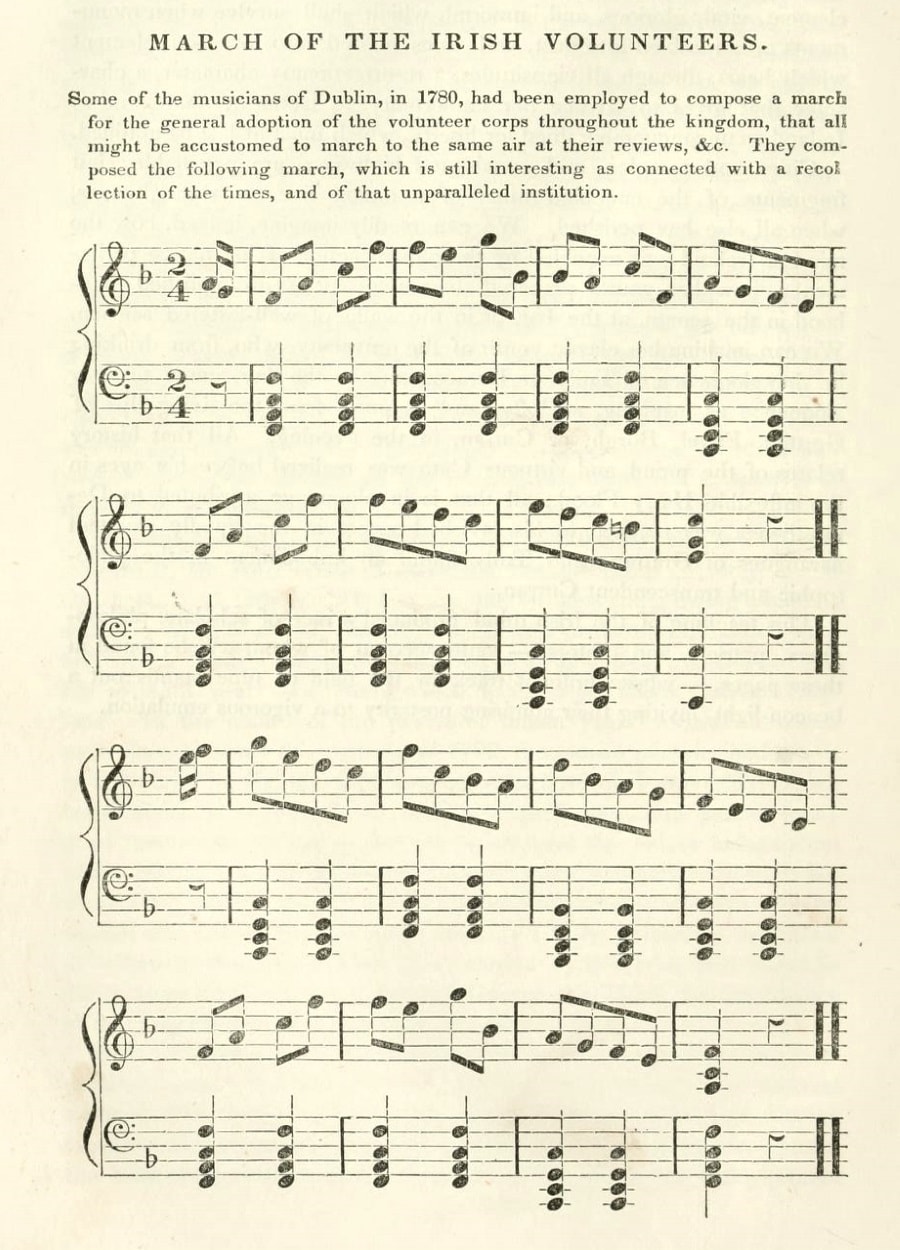
Thomas Mooney, A history of Ireland, from its first settlement to the present time . . . including a particular account of its literature, music, architecture, and natural resources . . . volume 2 (Boston: Published by the author, 1853), 852
https://archive.org/stream/historyofireland02moon#page/852/mode/1up
References:
D. J. Donoghue, Catalogue of the musical loan exhibition held in the National Library, Dublin (Dublin: Feis Ceoil, 1899), 8 (no. 35)
https://archive.org/stream/feisceoilcatalo00dongoog#page/n14/mode/2up (DIGITISED)
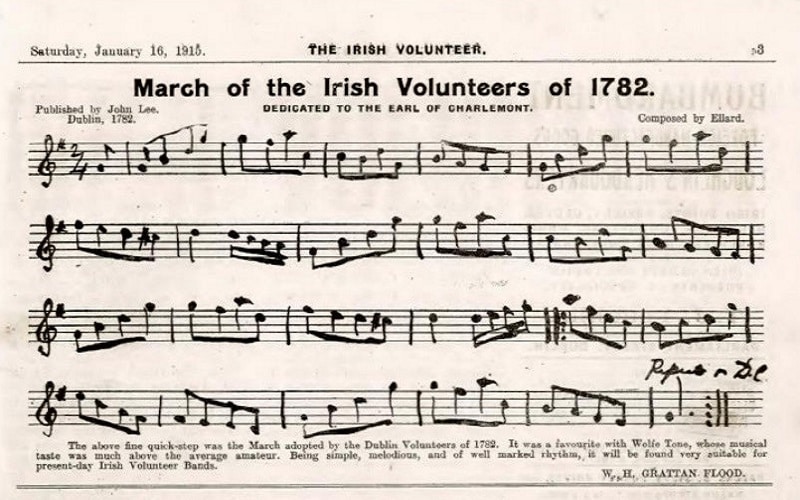
W. H. Grattan Flood, "The march of the Irish volunteers of 1782", The Irish volunteer (16 January 1916), 3
https://issuu.com/anphoblacht/docs/irish-vol-2-07-med (DIGITISED)
The March of the Irish Volunteers of 1782, composed by Ellard [recte Elfort], published by John Lee, Dublin, 1782. The above fine quickstep was the March adopted by the Dublin Volunteers of 1782. It was a favourite with Wolfe Tone, whose musical taste was much above the average amateur. Being simple, melodious, and of well marked rhythm, it will be found very suitable for present-day Irish Volunteer Bands.
1843 - Rosetta Nathan's dirge - Way for my grief - give way
Commentary:
- - -
Sources:
"ROSETTA NATHAN'S DIRGE", The Sydney Morning Herald (25 April 1843), 2
http://nla.gov.au/nla.news-article12417841
Way for my grief - give way -
Shroud not that beauteous form,
I would but kiss the brow which yesterday
With life's young pulse was warm,
And now - oh God! 'tis clay!
Those lips unclose no more,
Even tho' I name her name!
Oh broken heart, hath thy rich tide ebb'd o'er!
And I yet live the same?
Come back sweet voice of yore!
Back to me, from the dead,
Doth voice of love dwell there?
None - none, I am bereaved! see from my head
I rend the waving hair;
Go! leave me with my dead.
Give way, to my despair!
E. H. D.
Wollombi, April 18.
The vase
http://digital.sl.nsw.gov.au/delivery/DeliveryManagerServlet?dps_pid=FL9674341 (DIGITISED)
References:
"DEATHS", The Sydney Morning Herald (3 April 1843), 3
http://nla.gov.au/nla.news-article12413592
On Saturday morning, at the residence of her father, Elizabeth-street, in the sixteenth year of her age, Rosetta Nathan, daughter of J. Nathan, Esq. This highly accomplished, amiable, and virtuous young lady, who was but a few hours ago the pride and delight of her family and friends, calmly slept in death after two short days' illness, leaving her afflicted family inconsolable for her sudden but irreparable loss.
"STANZAS", The Sydney Morning Herald (4 April 1843), 3
http://nla.gov.au/nla.news-article12412062
LAMENT ON THE UNITMELY DEATH OF A YOUNG, BEAUTIFUL, AND ACCOMPLISHED GIRL", Australasian Chronicle (4 April 1843), 2
http://nla.gov.au/nla.news-article31739378
"ORIGINAL POETRY. ROSETTE, BY H. H.", The Sydney Morning Herald (5 April 1843), 4
http://nla.gov.au/nla.news-article12419641
"Original Poetry", Australasian Chronicle (6 April 1843), 2
http://nla.gov.au/nla.news-article31739410
"ORIGINAL POETRY. LINES ON HEARING OF THE UNTIMELY DEATH Of MISS R. NATHAN", The Australian (7 April 1843), 4
http://nla.gov.au/nla.news-article37118078
1845 (original 1835) - Morning on Rostrevor mountain - 'Tis morning! from their heather bed (no tune nominated)
Commentary:
If Dunlop had recourse once to Bunting's 1809 collection (see Erin dheelish, 1865, below), we might perhaps usefully look there for possible tunes to some of her other undesignated songs. One likely case is her Morning on Rostrevor mountain (""'Tis Morning! from their heather bed / The curling mists arise"), originally published in Dublin in 1835:
'Tis morning! from their heather bed
The curling mists arise
And circling dark Slieve-dhonard's head
Ascend the drowsy skies.
'Tis Morning! and beside "CLOCH-MHOR"
In solitude I stand,
A stranger on my natal shoes,
And this my Fatherland! . . .
And reworked with some despairing Australian allusions for its reappearance in The atlas on 29 April 1845:
. . . Where the wild Emu leads her brood
Across the trackless plains,
And lord of nature's solitude -
The stately cedar, reigns;
Even there, through exile's cheerless hours,
Lighted by Austral skies,
I've linger'd amid orange flowers,
To catch thy scented sighs . . .
The tune of "The song of sorrow" as given in Bunting's collection fits it well, and appropriately too, given the words he identifies as belonging to it are - like Dunlop's original version - a prospective exile's brooding farewell to the native land. Mary Balfour's singing translation begins:
Adieu! my native wilds, adieu!
In Spring's green robe array'd,
Where days of bliss like moments flew
Beneath the woodland shade.
Now banish'd from sweet Erin's shore,
O'er trackless seas forlorn I go,
In distant climates to deplore
My Ulican dubh, Oh! . . .
Sources and documentation:
"MORNING ON ROSTREVOR MOUNTAINS [sic]", Dublin penny journal (8 August 1835), 42
https://www.jstor.org/stable/30003439 (DIGITISED - FREE ACCESS)
'Tis morning - from their heather bed . . .
. . . E. Killowen.
"MORNING ON ROSTREVOR MOUNTAIN . . .", The atlas (26 April 1845), 257
https://www.nla.gov.au/ferguson/1440365x/18450426/00010022/5-6.pdf
MORNING ON ROSTREVOR MOUNTAIN, IN ULSTER, IRELAND.
BY MRS. E. H. DUNLOP.
'Tis morning! from their heather bed
The curling mists arise
And circling dark Slieve-dhonard's head
Ascend the drowsy skies.
'Tis Morning! and beside "CLOCH-MHOR"
In solitude I stand,
A stranger on my natal shoes,
And this my Fatherland!
ROSTREVOR! Each illumined line
Of early life's romance,
Within this beauteous page of thine
Lies mirror'd to my glance:
Clonallen's spire, Rosetta's shades,
From classic Arno's vale,
To Ballyedmond's groves and glades -
Land of my homage, hail!
Morning! The beautiful, the bold,
Hath left his ocean bride.
And from her couch of wavy gold
Comes forth, in regal pride.
Ah me! I've seen that crown of rays
As gallantly put on,
And watched thy robe of crimson haze
O'er other waters thrown.
Rocked on the billowy bed that heaves
Beneath the burning Line,
I've marked where the horizon weaves
Its purple threads with thine,
And hailed in all their pride of birth,
Thy purest lustres given,
To gladden scenes more fair than earth -
The sea! The sea, and heaven!
Where the wild Emu leads her brood
Across the trackless plains,
And lord of nature's solitude -
The stately cedar, reigns;
Even there, through exile's cheerless hours,
Lighted by Austral skies,
I've linger'd amid orange flowers,
To catch thy scented sighs.
Yes, and where GUNGA'S mighty streams
Their sacred waters spread,
I've seen, beneath thy worshipped beams,
Ten thousands bow the head:
And by the Brahmin's funeral pile,
In that far hemisphere,
Young MORN! Have I not met thy smile,
Mocking the burning bier?
In SAUGUR'S sickly jungle met?
And on the arid sand,
Where the dark domes of JUGHERNAUGHT'S
Profane PAGODAS stand?
Aye, met, ev'n 'mid the grave-yard gloom,
Piercing the tainted air,
Thy sick'ning rays - a marble tomb -
Engulphs my memory there.
Once, high o'er Afric's southern seas
In solitary mood,
Within the "Vale of SILVER TREES,"
On Table hill, I stood -
The fresh free breeze, the morning beam -
The vapour-crested brow,
Of CAFFRE-HOLLAND - as a dream,
All come before me now!
Again adown that deep ravine
I gaze on fruit and flower -
A labyrinth maze of silky green,
A many-tinted bower.
Tall Aloes crown the rocky steep.
Pomegranate blossoms spread,
And the umkoba's branches sweep
Across the torrent's bed.
Blushes yon crassula, as when
Its scarlet blossoms lay
In the wild fig or sumach glen,
That looks on Table Bay;
And, bearing up by ROBAN ISLE [Robben],
From farthest India's shore,
That ship - false dreams! Ye but beguile -
I stand beside Chloch-mhor!
* CLOCH-MHOR (i.e., large rock) of which it is said that, like the Fons Solis, it is warm at the rising of the sun.
[William Chaucer] "Country News. (From our Correspondent) WOLLOMBI . . . POETRY", The Sentinel (10 September 1845), 3
http://nla.gov.au/nla.news-article226461568
The public is not probably aware that various fugitive and descriptive pieces, with occasional lyric compositions,
are said to emanate from the pen of a Wollombi poetess - and as "a lady is in the case,"
we shall touch upon the subject with all the gentleness with which the swallow dips the points of his wings upon the bosom of the glassy lake -
referring our readers and those who have read "Morning on Rostrevor Mountain in Ulster; Ireland, by Mrs. E. H. Dunlop,"
as published in the Atlas newspaper, of 26th April, 1845 - to "Morning on Rostrevor Mountains," published in the Dublin Penny Journal,
of 8th August, 1835, page 42 - E. - What a felicitous instance of anticipation!!!
Wollombi, 4th September, 1845.
Manuscript copy in author's hand on folded sheet, in Papers mainly relating to the Raine family and Eliza Dunlop, 1821-1870; State Library of New South Wales, MLMSS 10156
http://archival.sl.nsw.gov.au/Details/archive/110621176
The vase (with explanatory note)
http://digital.sl.nsw.gov.au/delivery/DeliveryManagerServlet?dps_pid=FL9674298 (DIGITISED)
This poem, with the exception of one verse, was published when written, many years since, in the Dublin Penny Journal . . .
Music concordances (possible):
Bunting 2-1809, 4-5
https://archive.org/details/generalcollectio00bunt_0/page/4
1847 - To the memory of Mary Fitzroy - Trembling in agony! faint with amaze!
Commentary:
- - -
Sources:
"ELEGY", The Sydney Morning Herald (21 December 1847), 2
http://nla.gov.au/nla.news-article12894318
Nathan, Southern Euphrosyne, 136
https://books.google.com.au/books?id=ziwieom4lBQC&pg=PA136 (DIGITISED)
https://nla.gov.au/nla.obj-166023361/view?partId=nla.obj-166034704#page/n145/mode/1up(DIGITISED)
ON THE DEATH OF THE RIGHT HONORABLE LADY MARY FITZROY.
The following letter addressed to us, together with the accompanying pathetic stanzas on the lamented death of the amiable Lady Mary Fitzroy, do credit to the heart and talent of Mrs. Dunlop; and though we cannot, at this crisis, avail ourselves of her kind permission to unite the stanzas to our music, we feel a melancholy satisfaction in thus laying them before our readers.
Mulla villa Wollombi, December 20, 1847.
Dear Mr. Nathan,
You could create a melancholy melody to embody the sad thoughts I offer you.
The subject is one of universal sympathy;
and you, who could so well value the amiable qualities of the illustrious departed,
will, I feel convinced, love to honor her memory.
Ever Yours, obliged and gratefully,
ELIZA HAMILTON DUNLOP.
I. Nathan, Esq.
TO THE MEMORY OF THE RIGHT HON. LADY MARY FITZROY.
Trembling in agony! faint with amaze!
Not tear drops but terror is blinding his gaze:
He sits by the loved one, supporting her head -
The spirit-bond's broken - he kneels by the dead.
All his heart's treasury, hallowed by time,
Love changeless and cherished in many a clime,
Passing from earth as he kneels by her there,
Stern in the strength of his silent despair.
Dirge-notes roll solemnly thrilling through all,
Hearts heave in the hamlet, tears gush in the hall;
Yes! tears for that loved one, our noblest and best,
Oh! call her not back from the home of the blest.
Fount of deep tenderness, feebly the tone
Flow'd with thy life's current naming thine own;
Breathing his name with thy heart's parting swell,
Winning from death an undying farewell.
E. H. Dunlop.
We who have drank deeply of the bitter cup of sorrow, can indeed sympathise in the affliction of others - but we must all submit to heaven's decree . . .
The vase ("Elegy on the death of the Right Hon. Lady Mary Fitz-Roy", includes explanatory note)
http://digital.sl.nsw.gov.au/delivery/DeliveryManagerServlet?dps_pid=FL9674307 (DIGITISED)
References:
"MOST MELANCHOLY ACCIDENT. DEATH OF LADY MARY FITZ ROY AND LIEUTENANT C. C. MASTERS, A.D.C.", The Sydney Morning Herald (8 December 1847), 2
http://nla.gov.au/nla.news-article12893742
"THE LATE MELANCHOLY ACCIDENT AT PARRAMATTA", The Sydney Morning Herald (9 December 1847), 2
http://nla.gov.au/nla.news-article12893007
[Editorial], The Sydney Morning Herald (10 December 1847), 2
http://nla.gov.au/nla.news-article12891734
"Original Poetry. ON THE DEATH OF LADY MARY FITZ ROY", Bell's Life in Sydney and Sporting Reviewer (1 January 1848), supplement 2
http://nla.gov.au/nla.news-article59764212
John M. Ward, "FitzRoy, Charles Augustus (1796-1858)", Australian dictionary of biography 1 (1966)
http://adb.anu.edu.au/biography/fitzroy-sir-charles-augustus-2049
c.1848 - Aboriginal songs and translations - Various songs transliterated
Commentary:
- - -
Sources:
Aboriginal song texts, in Kamilaroi vocabulary and Aboriginal songs, c.1840s
http://archival.sl.nsw.gov.au/Details/archive/110365167 (DIGITISED)
Vocabulary, in David Dunlop, correspondence & documents, 1830s-1880s; papers of James Milson; State Library of New South Wales, MLMSS 9409/Box 14/Folder 7
http://digital.sl.nsw.gov.au/delivery/DeliveryManagerServlet?dps_pid=FL4385967 (DIGITISED)
Relevant page images:
http://digital.sl.nsw.gov.au/delivery/DeliveryManagerServlet?dps_pid=FL380913 (PAGE IMAGE)
Song
Ko-ra ko-a--be-á-raa!
Niú-wa-ra-ngwe-ra-raa!
http://digital.sl.nsw.gov.au/delivery/DeliveryManagerServlet?dps_pid=FL380925 (PAGE IMAGE)
http://digital.sl.nsw.gov.au/delivery/DeliveryManagerServlet?dps_pid=FL380938 (PAGE IMAGE)
http://digital.sl.nsw.gov.au/delivery/DeliveryManagerServlet?dps_pid=FL380947 (PAGE IMAGE)
http://digital.sl.nsw.gov.au/delivery/DeliveryManagerServlet?dps_pid=FL380949 (PAGE IMAGE)
http://digital.sl.nsw.gov.au/delivery/DeliveryManagerServlet?dps_pid=FL380951 (PAGE IMAGE)
Nung-Ngnun - Our home is the gibber-gunyah
Sources:
Nathan, Southern Euphrosyne, 94
https://books.google.com.au/books?id=ziwieom4lBQC&pg=PA194 (DIGITISED)
https://nla.gov.au/nla.obj-166023361/view?partId=nla.obj-166034704#page/n103/mode/1up (DIGITISED)
PIALLA WOLLOMBI *
The poetry by Mrs. E. H. Dunlop - inscribed to William Hamilton Maxwell, Esq., author of "Stories of Waterloo," &c.
Our home is the gibher-gunyah,
Where hill joins hill on high:
There berramboo and boomerang
Like sleeping serpents lie!
There our lubras can look on the battwan clear,
That the track of a white man hath never been near.
Ours are the wascera gliding -
Deep in the shady creek;
Where bright gerool and cooperra tell
How sure the prey we seek:
While the rushing of wings, as the wangas pass,
Sweeps the wallaby's print from the glist'ning grass.
Ours is the coole-man flowing,
With fragrant contiyon stored:
For fleet the foot, and keen the eye,
That seeks the conindin's hoard!
But dearer the glance, and the footsteps to me,
Of the lubra who laughs by the kurrijong tree!
* THE POETRY OR LANGUAGE OF WOLLOMBI.
Gibber-gunyah: cave-of-the-rock.
Berramboo: the waddy or war-club, similar to those of New Zealand.
Boomerang: striking-weapon - from boomallee, to strike.
Lubra: female or daughter - young females of a tribe.
Battwan: spring water.
Wascerra: fish.
Gerrool, and Cooperra: the mullet and eel.
Wanga-wanga: a wild pigeon of the largest kind, of most exquisite plumage.
Wallaby: a small species of the kangaroo, which is also called barwan,
and biiloo - they are yet found in thin herds in the mountanous ranges of the Wollombi.
The coole-man is a bowl, hollowed with great ingenuity by the aborigines, from an excrescent substance of a semicircular form, found growing on the iron-bark, apple, and other gumiferous trees; the inner wood is rather more porous and fibrous than that on which it grows; but the bark (which is the cooleman) is hard and smooth, one or two inches in thickness, and containing from a pint to two gallons. On a first examination I was inclined to the opinion of an author (Professor Rennie,) on "Insect Architecture," who believes that "such growths may be caused by the juncture of the lynips," but admitting, with that authority, that these excresences are "pseudo-galls," I rather infer them to be like wens on animals, "produced by too much nourishment."
Contiyon: honey.
Conindin: the small native honey-bee easily tracked through the air by a white down adhering to it; which is strewed by the natives on the sweet yams, on which the insect loves to feed.
Kurrijong: a tree, from the inner rind of which nets are woven.
"NATIVE POETRY", The Sydney Morning Herald (11 October 1848), 3
http://nla.gov.au/nla.news-article12904464
Nung-Ngnun.
Nge a runba wonung bulkirra umbilinto bulwarra;
Pital burra kultan wirripang buntoa
Nung-Ngnun
Nge a runba turrama berrambo, burra kilkoa:
Kurri wi, raratoa yella walliko,
Yulo Moane, woinyo, birung poro bulliko,
Nung-Ngnun
Nge a rumba kan wullung, Makoro, kokein,
Mip-pa-rai, kekul, wimbi murr ring kirrika:
Nge a runba mura ke-en kulbun kulbun murrung.
- - -
There is a god of Poesy, Wallatu, who composes
music, and who, without temple, shrine, or statue, is as
universally acknowledged as if his oracles were breathed
by Belus or Csiris [recte Osiris]: he comes in dreams, and transports
the individual to some sunny hill, where he is inspired
with the supernatural gift.
E. H. DUNLOP.
Mulla Villa, September 25.
Translated and Versified by Mrs. Dunlop.
Our home is the gibber-gunyah,
Where hill joins hill on high;
Where the turruma and berrambo,
Like sleeping serpents lie;--
And the rushing of wings, as the wangas pass,
Sweeps the wallaby's print from the glistening grass.
Ours are the makoro gliding,
Deep in the shady pool:
For our spear is sure, and the prey secure--
Kanin, or the bright gherool.
Our lubras sleep by the bato clear,
That the Amygest's track hath never been near.
Ours is the koolema flowing,
With precious kirrika stored:
For fleet the foot, and keen the eye,
That seeks the nukkung's hoard;--
And the glances are bright, and the footsteps are free,
When we dance in the shade of the karakun tree.
- - -
Gibber-gunya--Cave in the rock.
Turruna and Berrambo--War arms.
Wanga--A species of pigeon.
Makoro--Fish.
Amygest--White-fellow.
Kanim--Eel.
Gheerool--Mullet.
Bato--Water.
Kirrika--Honey.
Nukkung--Wild bee.
Karrakun--The oak-tree.
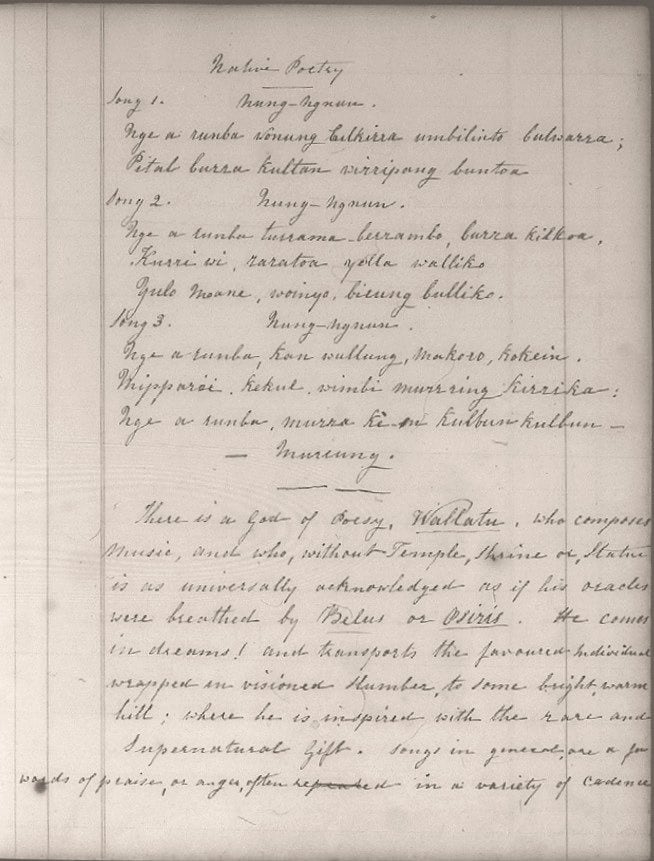
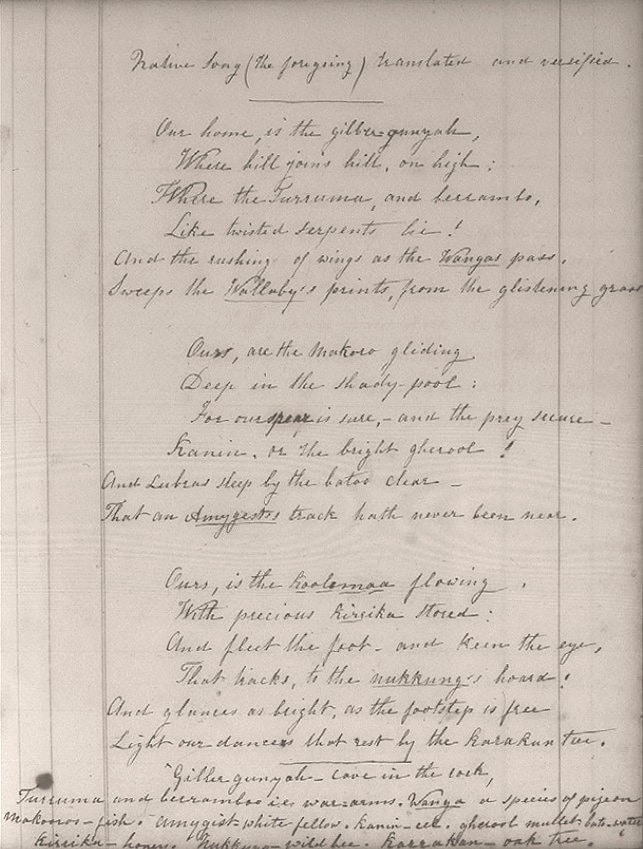
The vase
http://digital.sl.nsw.gov.au/delivery/DeliveryManagerServlet?dps_pid=FL9674345 (DIGITISED)
Song 1. / Nung-Ngnun.
Nge a runba wonung bulkirra umbilinto bulwarra;
Pital burra kultan wirripang buntoa
Song 2. / Nung-Ngnun
Nge a runba turrama berrambo, burra kilkoa:
Kurri wi, raratoa yella walliko,
Yulo Moane, woinyo, birung poro bulliko,
Song 3. / Nung-Ngnun
Nge a rumba kan wullung, Makoro, kokein,
Mip-pa-rai, kekul, wimbi murr ring kirrika:
Nge a runba mura ke-en kulbun kulbun -
- murrung.
- - -
There is a god of Poesy, Wallatu, who composes music, and who, without temple, shrine, or statue, is as universally acknowledged as if his oracles were breathed by Belus or Osiris: he comes in dreams, and transports the favoured individual wrapped in visioned slumber, to some bright, warm hill; where he is inspired with the rare and supernatural gift. Songs in general are a few words of praise, or anger, often repeated in a variety of cadence[s].
[56] Native song (the foregoing) translated and Versified.
Our home, is the gibber-gunyah,
Where hill joins hill, on high;
Where the turruma, and berrambo,
Like twisted serpents lie!
And the rushing of wings, as the Wangas pass,
Sweeps the wallaby's prints, from the glistening grass.
Ours are the makoro gliding
Deep in the shady pool:
For our spear is sure, and the prey secure--
Kanin, or the bright gherool!
Our lubras sleep by the batoo clear,
That the Amygest's track hath never been near.
Ours, is the koolema flowing
With precious kirrika stored:
And fleet the foot, and keen the eye,
That tracks to the nukkung's hoard!
And glances as bright, and the footstep is free,
Light our dancers that by the karakun tree.
- - -
Gibber-gunya--Cave in the rock.
Turruna and Berrambo--War arms.
Wanga--A species of pigeon.
Makoro--Fish.
Amygest--White-fellow.
Kanim--Eel.
Gheerool--Mullet.
Bato--Water.
Kirrika--Honey.
Nukkung--Wild bee.
Karrakun--The oak-tree.
Documentation:
"Aborigines of Australia", The Band of Hope Journal and Australian Home Companion (5 June 1858), 179
http://nla.gov.au/nla.news-article72485306
References:
Lancelot E. Threlkeld, "Language of the Australian Aborigines", in Waugh's Australian almanac for the year 1858 (Sydney: James W. Waugh, 1858), (60-80), 70-71
https://archive.org/stream/rosettaproject_awk_multiple-3/threlkeld1858#page/n6/mode/1up (DIGITISED)
https://books.google.com.au/books?id=A2NQAQAAMAAJ&pg=RA1-PA71 (DIGITISED)
https://downloads.newcastle.edu.au/library/cultural%20collections/pdf/threlkeld1858ocr.pdf (DIGITISED)
R. W. Venderkiste, Lost, but not for ever: my personal narrative of starvation and providence in the Australian mountain regions (London: James Nisbet, 1863), 209-210
https://books.google.com.au/books?id=Av49AQAAMAAJ&pg=PA210 (DIGITISED)
Edward Ellis Morris, Austral English: a dictionary of Australasian words, phrases and usages(London: Macmillan and Company, 1898), 160
https://archive.org/stream/australenglishdi00morruoft#page/160/mode/2up (DIGITISED)
Margaret Clunies Ross, "Australian Aboriginal oral traditions", Oral tradition 1/2 (1986), (231-71), 235
http://journal.oraltradition.org/issues/1ii/cluniesross (DIGITISED)
1853 / 57 - The Helleborus niger: the Christmas rose - Stern Winter hath no power (Tune: Eveleen's bower)
Commentary:
This is the only instance of a song where Dunlop nominated a tune unequivocally sourced from Moore and Stevenson's collections. The published 1857 version does not name the tune, which is identified only in the 1853 manuscript of the earlier version. Moore selected the melody for his lyric, Eveleen's bower, in the second number of his series, noting there that its pedigree was disputed, and that it was well known as The pretty girl of Derby, O (or Peggy of Derby O).
As he arranged it for the opera Two to one (London, 1784), Samuel Arnold marked his setting Vivace. Stevenson and Moore, however, marked it Plaintively, and, given the melancholy turn of her lyric, Dunlop would probably have done likewise.
Words and melody edition (first verse of version 2, 1857, only underlaid):
The Helleborus niger ("Stern Winter hath no power" (Dunlop, version2, 1857); tune: Eveleen's bower [Peggy of Derby O] (Moore and Stevenson 2, 1807)
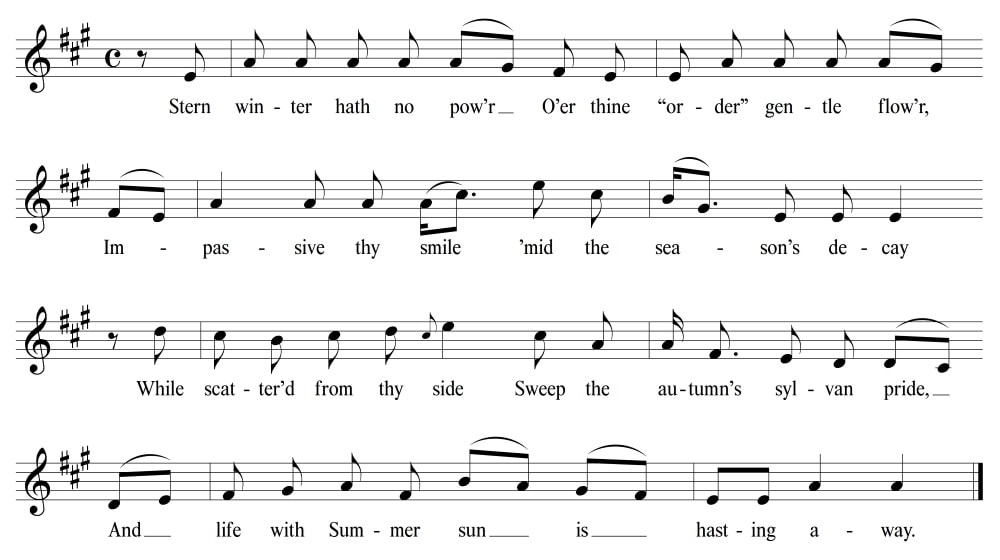
Synthesised sound file, Australharmony 2019
Sources:
Version 1 (1853)
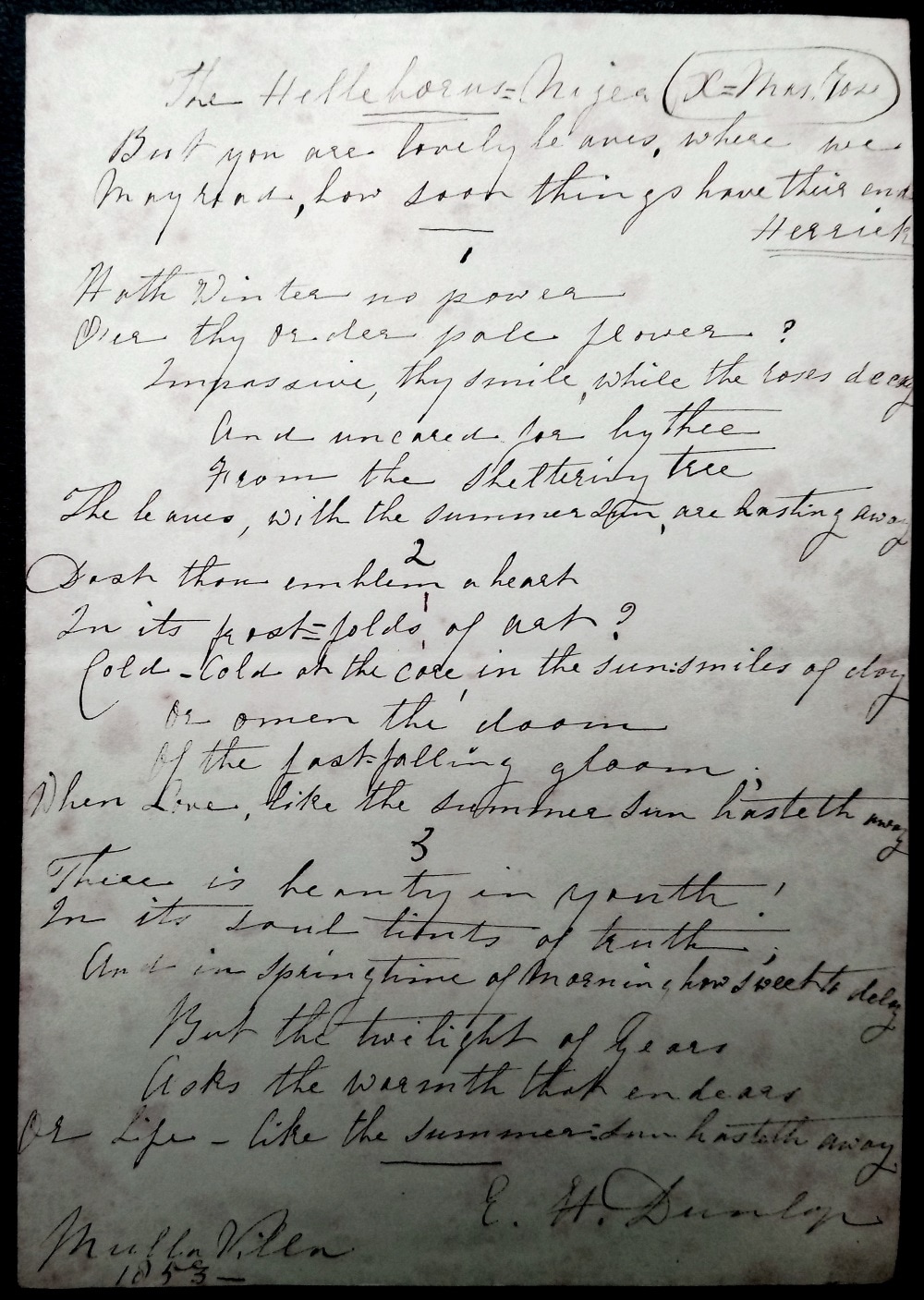
Manuscript copy on separate folded sheet in author's hand; in Papers mainly relating to the Raine family and Eliza Dunlop, 1821-1870; State Library of New South Wales, MLMSS 10156
http://archival.sl.nsw.gov.au/Details/archive/110621176
Catalogue record has: "The Hellehorus [sic] Niger." Manuscript poem by Eliza Dunlop adapted to the music of "Eveleen's Bower", for Mr. G. Law [sic], 1853
[Cover] Adapted to the Music of "Eveleen"s Bower"
For M. G. Law.
The Helleborus-Niger (X-mas Rose)
But you are lovely leaves, where we
May read, how soon things have their end.
- Herrick.
Hath Winter hath no power
O'er thine order gentle flower?
Impassive, thy smile while the roses decay.
And uncared for by thee
From the sheltering tree,
The leaves, with the summer sun, are hasting away.
Dost thou emblem a heart
In its frost-folds of art?
Cold, cold at the cores, in the sun-smiles of day
Or omen the doom
Of the fast-falling gloom;
When love, like the summer son hasteth away.
There is beauty in youth!
In its soul tints of truth,
And in springtime of morning how sweet to delay
But the twilight of years
Asks the warmth that endears,
Or life, like the Summer sun hasteth away.
E. H. Dunlop.
Mulla Villa, 1853.
Version 2 (1857)
"HELLEBORUS NIGER", Empire (11 April 1857), 3
http://nla.gov.au/nla.news-article60277324
"HELLEBORUS NIGER,"
THE CHRISTMAS ROSE.
By E. H. D.
Stern Winter hath no power
O'er thine "order" gentle flower,
Impassive thy smile
'Mid the season's decay.
While scattered from thy side--
Sweep the Autumn's sylvan pride,
And life, with the Summer sun--
Is hasting away.
Art thou emblem of a heart
In its loneliness apart?
The bloom of innate energies--
Its fadeless array!
Or symbol meet enshrin'd
Of the self reliant mind?
Flower laden, while its Summer sun
Is hasting away!
Oh! the morning prime of youth!
With its fountain springs of truth,
Where the footsteps of the spirit rest--
With fondest delay;
But fairer still the flower--
That will bloom in wintry hour,
When Time, like the Summer sun,
Is hasting away.
Mulla Villa, Wollombi.
Music concordances:
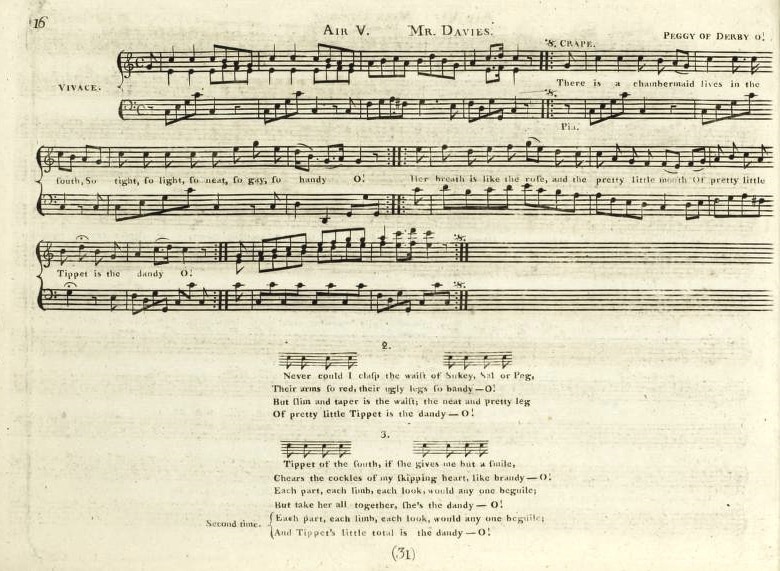
"Peggy of Derby O" [arr. by Samuel Arnold], in Two to one, a comic opera, now performing with universal applause, at the Theatre Royal in the Haymarket, for the voice, harpsichord, and violin, opera 24 (London: Harrison, 1784, 16
https://archive.org/details/twotoonecomicope00arno/page/16 (DIGITISED)
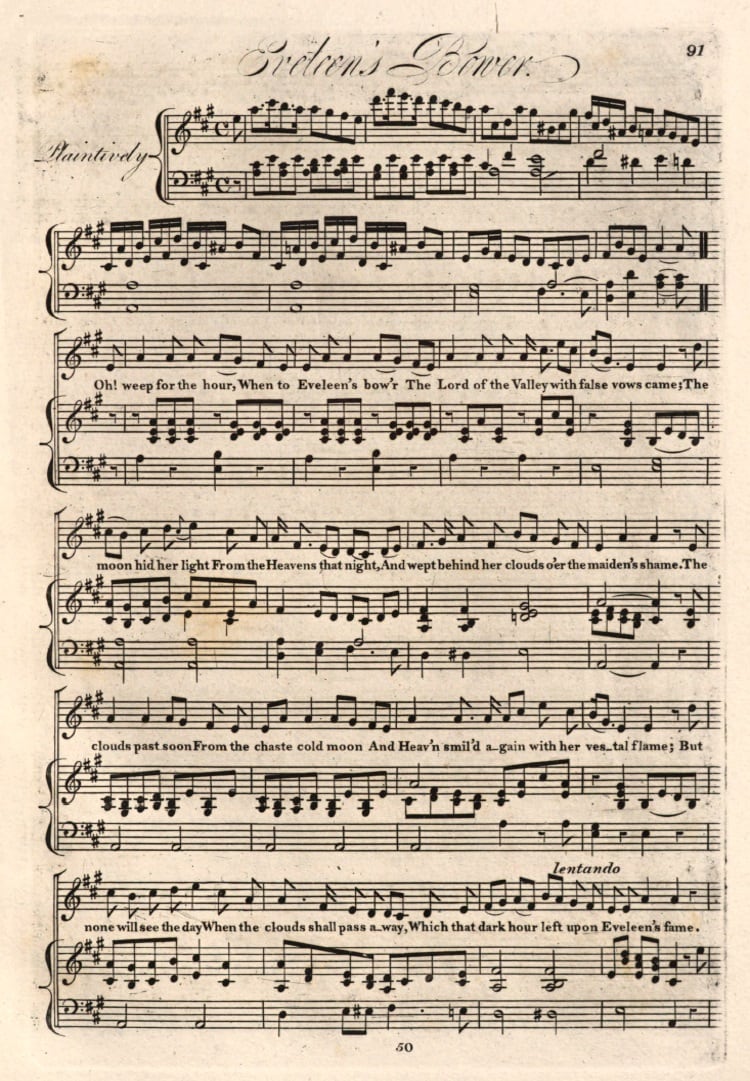
"Eveleen's bower" ("Oh! weep for the hour"), in Moore-2-1807, 91-97
https://reader.digitale-sammlungen.de/de/fs1/object/display/bsb11131642_00043.html (DIGITISED)
https://archive.org/details/MooreIrishMelodies17/page/n129 (DIGITISED)
Our claim to the Air has been disputed; but they, who are best acquainted with National Melodies, pronounce it to be Irish. It is generally known by the name of "The Pretty Girl of Derby, O!"
NOTE: Better known as "The Irish dragoons", or "Pretty Peggy of Derby, O", or "The bonnie Lass o'Fyvie"; the first lines: "There was a regiment of Irish dragoons, / They were all marching to Derby O"
"Eveleen's bower", The Traditional Tune Archive
https://tunearch.org/wiki/Annotation:Eveleen's_Bower (ONLINE)
1865 - Erin dheelish - The bell birds ring their silvery call (Tune: "plaintive air" from Bunting)
Commentary:
For Erin dheelish, published in the Empire in 1865, Dunlop said she had in mind a setting from one of Bunting's collections, while at the same time noting her preference for Stevenson's arrangements of Moore's Melodies. Unfortunately, she stopped short of positively identifying the tune she had in mind. She merely explained that her lyric was:
written for an old and somewhat plaintive air, published by Edward Bunting in his "Irish Melodies." Mr. Bunting, although so eminent, was less talented than our great composer, Sir John Stevenson.
Predictably, across Bunting's three collections, there are several tunes which Dunlop's lyric can be made to fit, including "Kitty Tyrrel" (Bunting 1-1796, no. 8, page 5, music only), "The green woods of Truigha" (Bunting 2-1809, page 12), and "Planxty Maguire" (Bunting 1-1796, 30; Bunting 2-1809, 34). The last of these three is probably ruled out for being insufficiently "plaintive" (a planxty is, generically, a fairly animated Irish harp tune, and Bunting marked his arrangement of this one Allegretto spiritoso). Moreover, Dunlop's comparison of Bunting with Stevenson does seem to suggest that the volume she had to hand was indeed the 1809 book, the only one of the three that includes songs arranged and laid out in the same voice-and-piano format as adopted by Moore and Stevenson in their first two numbers two years earlier.
As musical criticism, Dunlop's preference for Stevenson's often elaborate arrangements is probably objectively fair, though the simpler accompaniments in Bunting's 1809 book are perfectly serviceable, as is that for a fourth possible tune, "The dawning of the day" ("Eirghidhe an lae"). Bunting presents it, moreover with new lyrics written "from a literal translation of the original Irish" by one of his Belfast circle, Mary Balfour (c.1778-1819):
The blush or morn at length appears,
The hawthorn weeps in dewy tears;
Emerging from the shades of night,
The distant hills are tipp'd with light . . .
If Dunlop did indeed set them to Bunting's 1809 version of this tune, her lyrics can then perhaps also be read as a Wollombi bush contrafactum parody of Miss Balfour's earlier text.
And if Dunlop had recourse once in 1865 to Bunting's 1809 collection, we might usefully look there for possible tunes to some of her other undesignated songs, like A phase of Ireland (1867), and Morning on Rostrevor mountain (1835/45).
Dunlop may well have had an opportunity to meet Bunting and Mary Balfour, for they were certainly both still active in Belfast at the time of her earliest documented public engagement there with Irish national music (see Verses for Parick Carolan, 1818, above).
Words and melody edition (first verse only underlaid):
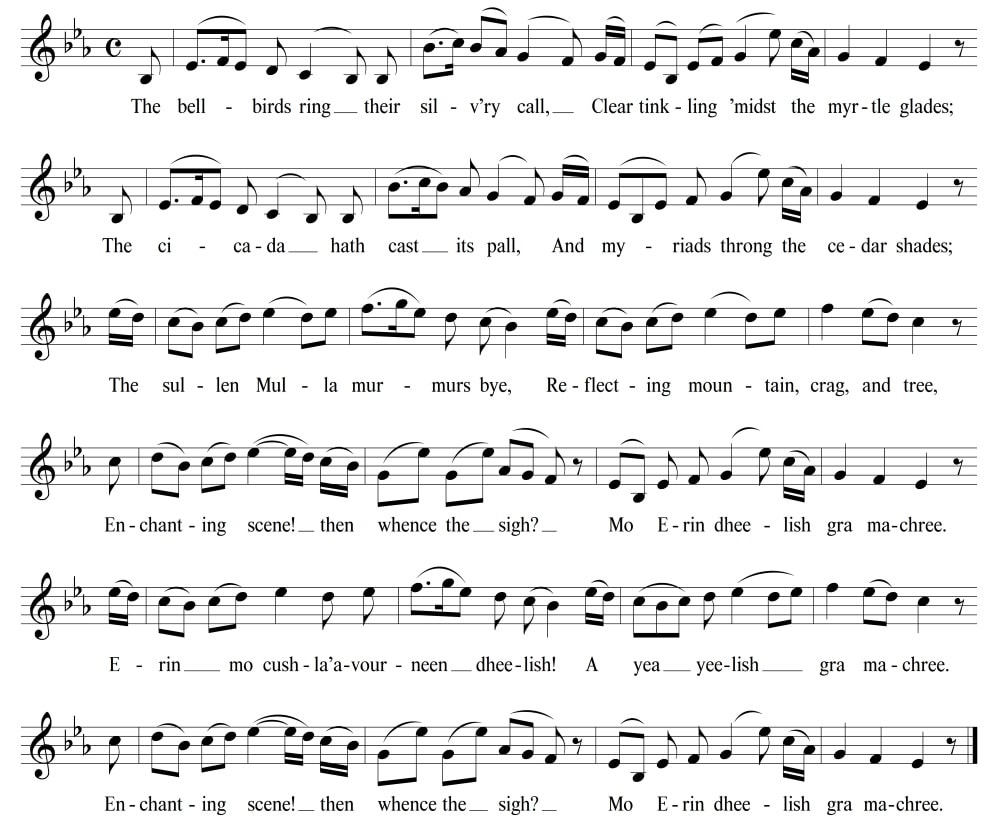
Synthesised sound file, Australharmony 2018
Source:
"ERIN DHEELISH", Empire (8 July 1865), 5
http://nla.gov.au/nla.news-article64140758
ERIN DHEELISH.*
BY MRS. E. H. DUNLOP.
The bell birds ring their silvery call,
Clear tinkling 'midst the myrtle glades;
The ci-ca-da hath cast its pall,
And myriads throng the cedar shades . . .
The sullen Mulla murmurs bye,
Reflecting mountain, crag, and tree,
Enchanting scene! then whence the sigh?
Mo Erin dheelish gra machree
Erin mo cushla, avourneen dheelish!
A yea yeelish gra machree
Enchanting scene! then whence the sigh?
Mo Erin dheelish gra machree.
With ruby breast and emerald wing,
The gorgeous lory flashes near;
Sweet mocking birds their carols sing,
Till hearts lie listening in the ear.
Spinosa's++ odours load the air,
The fragrance stays the wandering bee.
Why must I sigh in land so fair?
Mo Erin dheelish gra machree.
Erin mo cushla, vourneen dheelish,
A yea yeelish! gra machree!
Why must I sigh in land so fair?
Mo Erin dheelish gra machre.
Mulla Villa, Wollombi, New South Wales, 12th May [1865]
* Erin dheelish is written for an old and somewhat plaintive air, published by Edward Bunting in his "Irish Melodies." Mr. Bunting, although so eminent, was less talented than our great composer, Sir John Stevenson . . .
+ The cicada septendecim bursts from its shroud, which retains the perfect form of the insect, except the wings. The hollow cast off cover is left adhering to dry branches or rails of fences. The chirp of the cicada is not unpleasing.
++ The spinosa odorato of Sir T. Mitchell is the most enjoyable and the most lasting perfume of any shrub or flower that I have met with in any land.
E. H. D.
Music concordances:
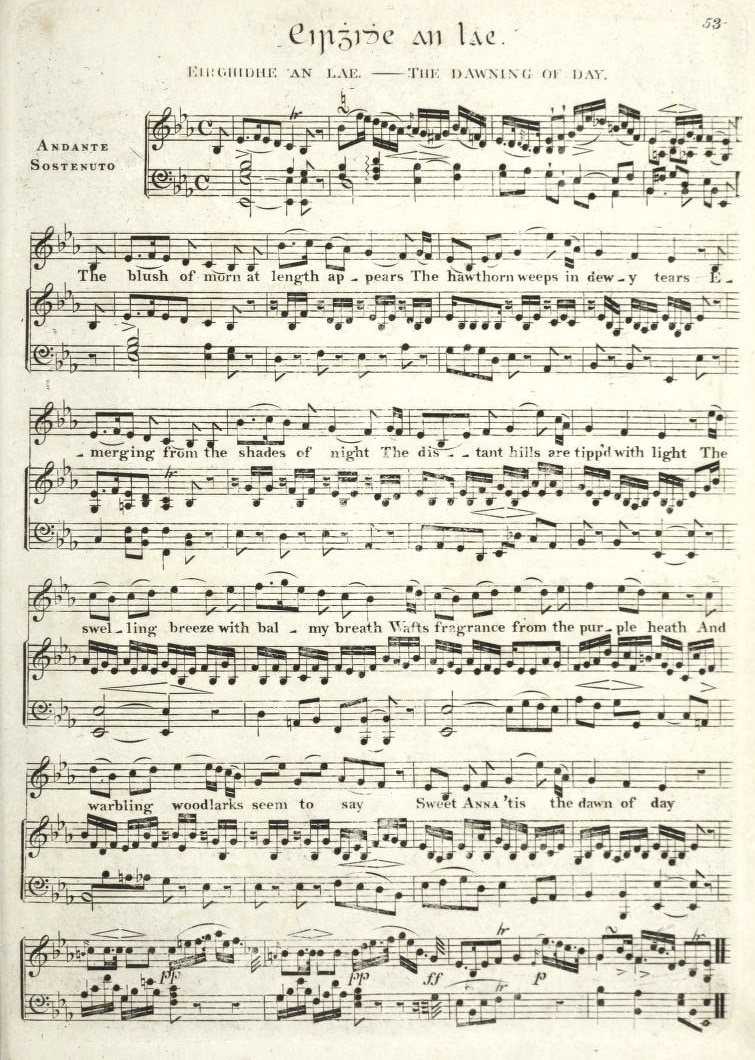
Bunting 2-1809, 53
https://archive.org/stream/generalcollectio00bunt_0#page/53/mode/2up (DIGITISED)
But compare also [1] Kitty Tyrell:
Bunting 1-1796 (Dublin), no. 8, page 5
https://imslp.org/wiki/Special:ReverseLookup/32835 (DIGITISED)
Bunting 1-1796 (London n.d.), no. 8, page 5
https://archive.org/stream/generalcollectio00bunt#page/5/mode/2up (DIGITISED)
[2] Planxty Maguire
Bunting 1-1796 (Dublin), no. 64, page 30
https://imslp.org/wiki/Special:ReverseLookup/32835 (DIGITISED)
Bunting 1-1796 (London n.d), no. 64, page 35
https://archive.org/stream/generalcollectio00bunt#page/35/mode/1up (DIGITISED)
Bunting 2-1809, 34
https://archive.org/stream/generalcollectio00bunt_0#page/34/mode/2up (DIGITISED)
And [3] The green woods of Truigha
Bunting 2-1809, 42
https://archive.org/stream/generalcollectio00bunt_0#page/42/mode/2up (DIGITISED)
References:
-
1867 - A phase of Ireland in the 16th century - The spindrift bursts high o'er the cliffs of Clonara (no tune nominated)
Commentary:
Among Dunlop's later lyrics without nominated tunes, probably the most likely to carry "hidden music" is "A phase of Ireland in the 16th century" (1867), a thoroughly bardic ballad, whose opening lines toll resonantly with a litany of placenames:
The spindrift bursts high o'er the cliffs of Clonara,
The breakers surge madly around Craignabe;
Storms hurstle [sic] and howl in the clefts of Knockbara
And snow-wreaths lie deep in the gorge of Dunro . . .
Dunlop's subject is the disastrous Battle of Kinsale, in 1601, in which the Irish chieftains were finally defeated by the English invaders. Though in her notes she refers to Leland's History, the passages she quoted actually derive directly from the account in Lawless's Compendium (see references below).
Appropriate Irish ballad tunes fitting the elaborate structure of the lyric are few and far between, yet one was apparently fairly widely known. Moore wrote his "The parallel" ("Yes, sad one of Sion"), published in the eighth number of the Irish melodies (1821), for the tune of "I would rather than Ireland" (Bhfear liom na Eire) as given by Bunting in 1796 (tune only), and 1809 ("O lov'd maid of Broka"). Dunlop probably knew it in one or other version, but even if not, the tune exemplifies the type of generic musical vehicle she clearly had in mind.
We can be reasonably sure of this because Dunlop was fairly generous elsewhere in signposting Bunting as one of her musical sources (see Erin dheelish of 1865 above).
Words and melody edition (first verse only underlaid):
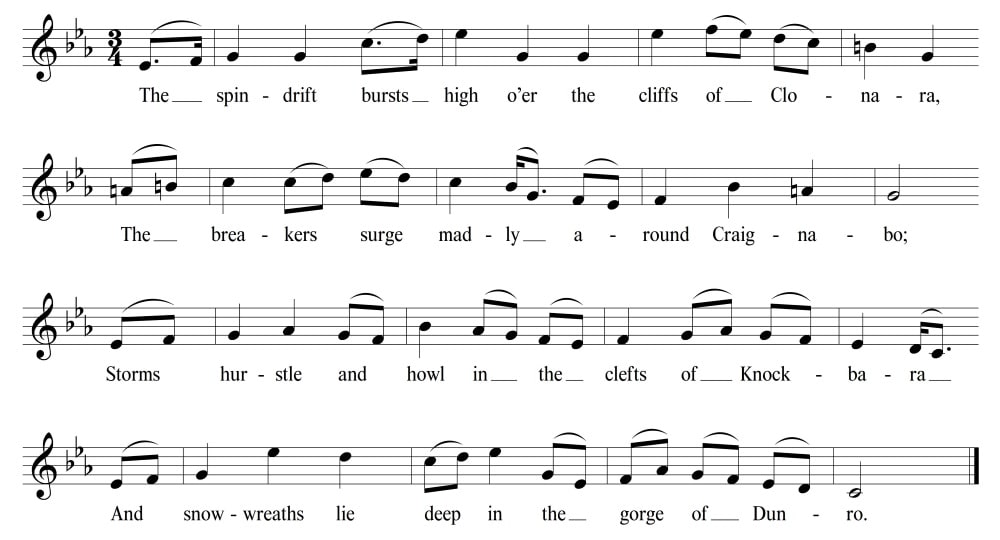
Synthesised sound file, Australharmony 2018
Source:
"A PHASE OF IRELAND IN THE 16TH CENTURY", Empire (18 May 1867), 5
http://nla.gov.au/nla.news-article60840247
A PHASE OF IRELAND IN THE 16TH CENTURY.
BY MRS. E. H. DUNLOP.
The spindrift bursts high o'er the cliffs of Clonara,
The breakers surge madly around Craignabo;
Storms hurstle and howl in the clefts of Knockbara,
And snow-wreaths lie deep in the gorge of Dunro.
Yet onward, brave Luath, the footsore and weary,
For Redmon O'Hanlon nor food nor repose;
This storm, which has found us unsheltered and dreary,
Is better to bear than the fury of foes.
Black Rory Maguire keeps the pass of the Callon,
And renegade Rourke lies in Hamilton's barn -
We;;, Mahon Macmahon is strong In Clonallen;
And heads shall lie low, ere this "Erick" * be drawn!
Dungannon is pillaged, Armagh reeks with slaughter,
Poyntzpass and the Newry have fallen to Mountjoy;
No matter, I'll swim o'er the Old Narrow Water,
And win to the standard of noble Clanboy!
Ha! Luath, the sound of that name: does it lighten
Our perilous path, and your vigour restore?
You press to my side, and those wistful eyes brighten -
Ah! Luath, 'tis far to our fires at Cloghmhor.
- - - - -
In Castle Clonallen is feasting and gladness -
Its turrets are flashing with many a light:
No ear for the tempest - no moment for sadness,
Wine, music, and dance, load the hours of the night.
Alone in her chamber one maiden sits weeping -
Tears, silent and bright, as the gems on her breast,
Her ear ls awake to the fearful winds sweeping -
Alow and aloft in their jarring unrest.
Fate frowns on the yellow-haired Chief of Iveagh,
His clansmen defeated, imprisoned, or fled;
Denounced by the Sheriff for "lifting a Creagh," *
Fair Mable Macmahon bewails him - as dead.
Bewails the fond hopes of affection relinquished;
As Felon proclaimed the O'Hanlon is gone:
Is gone - and the light of her life is extinguished.
Aye, bosoms shall heave, hearts may break, and live on.
- - - - -
The O'Neil is in arms - his adherents increasing -
O'Donnel has joined with his numerous band,
And Juan d'Aquilla, + with efforts unceasing -
Has rallied his troops - for a resolute stand.
- - - - -
Can jealousy, pride, and internal dissension
Bridge gulphs which broad turbulent torrents have crossed?
Shall Leaders of Hosts, in their selfish contentions,
Not "work out the curse" till their country be lost!
Soon spread over Munster one wide devastation,
Fair Leinster's proud city and castles ablaze!
Then Erin subdued, bowed her neck as a Nation,
Accepting the fetters which darken her days.
- - - - -
In the Bay of Rostrevor a white sail is furling,
The sun-spangled wavelets are kissing the shore;
Up the side of the mountain blue smoke-wreaths are curling,
A sheiling lies hid in the shade of Cloghmhor. ++
Where a tall mountain ash near a hawthorn is keeping
Proud watch while its red berries brighten the dell,
A crystalline spring down a cleft-rock ls creeping -
To lose its pure rill In the "Rowan Tree Well."
There, stretch'd on the heather, his heart filled with blessing
Brave Luath in gambols of joy; by his side
O'Hanlon reposes, caressed, and caressing,
His happy head laid in the lap of his bride.
[NOTES] "Creac," the original Irish for prey-booty-spoil - "Eric," by Brehon law, fines for various offences amongst which, however, murder was not one. "Sir G. Carew employed the artillery of jealousies and suspicions among the Irish, and succeeded in making the Chieftains the instruments of their own degradation." - - Leland.
+ Don Juan D'Aquilla forced the Irish chieftains to the attach of the English, then besieging Cork. After the most furious contest the Irish army was disgracefully routed. - Ibid.
++ Even in this land, very far off, an Irish tourist cannot fail to remember Cloomhor and the fairy well of Rostrevor Mountain.
Music concordances (possible):
Bunting 1-1796, no. 48, page 27
https://archive.org/details/generalcollectio00bunt/page/27 (DIGITISED)
Bunting 2-1809, 28-29
https://archive.org/details/generalcollectio00bunt_0/page/29 (DIGITISED)
Moore and Stevenson 8-1821, no. 3; words only, The works of Thomas Moore . . . vol. 4 (Paris: A. and W Galignani, 1823), 202-04
https://books.google.com.au/books?id=Hp1XBeNiROgC&pg=PA202 (DIGITISED)
https://archive.org/details/worksthomasmoor08moorgoog/page/n218 (DIGITISED)
References:
John Lawless, A compendium of the history of Ireland, from the earliest period to the reign of George I . . . second edition (Belfast: Joseph Smyth, 1815), especially 268-69
https://archive.org/details/compendiumofhist00lawl/page/268
[268] . . . Sir George Carew therefore employed the artillery of jealousies and suspicions among the Irish, and succeeded in making the Irish chieftain the instrument of his own degradation . . .
[269] . . . the Irish army, after a furious conflict, was disgracefully routed . . .
"Siege of Kinsale", Wikipedia
https://en.wikipedia.org/wiki/Siege_of_Kinsale
"Cloughmore", Wikipedia
https://en.wikipedia.org/wiki/Cloughmore
Undated 1 - Echo of "My ain kind dearie O" (tune: My ain kind dearie O [The lea rig])
Commentary:
An undated song in The vase, is, as the title advertises, an "Echo" of My ain kind dearie O ("Say what avails dim memory's form"). The words and tune alluded to (also known as The lea-rig) were anthologised in the 1787 first volume of James Johnson's The Scots musical museum, a series to which Robert Burns was a major contributor.
Words and melody edition (first verse only underlaid):
"Echo of My ain kind dearie O" (Dunlop undated); tune: My ain kind deary-O (Johnson 1787)
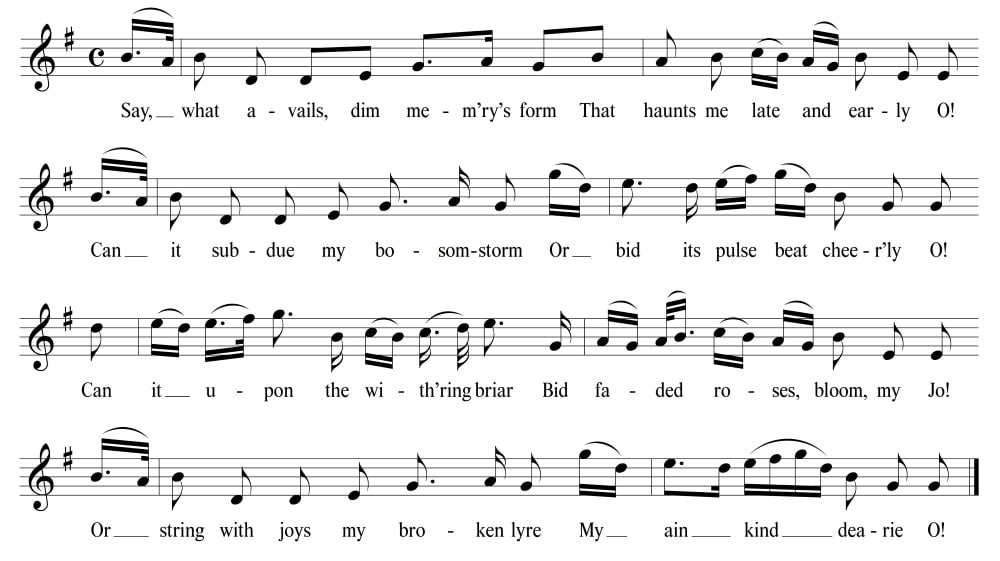
Synthesised sound file, Australharmony 2018
Source:
The vase
http://digital.sl.nsw.gov.au/delivery/DeliveryManagerServlet?dps_pid=FL9674336 (DIGITISED)
Echo of "My ain kind dearie O"
"What speaks each wave that laves [? loves] the shore?
Of days that pass, to come no more!" - Rev'd T. Dale
Say, what avails, dim-memory's-form
That haunts me late and early O!
Can it subdue my bosom-storm
Or bid its pulse beat cheerily O!
Can it upon the withering briar
Bid faded roses, bloom, my Jo!
Or string with joys my broken lyre
My ain kind dearie O!
Fond phantom yes! that magic smile,
Can light the heaven, of other days
The darkened lapse of time beguile -
Recalling tones, of love, and praise,
Or breathing low, each haunting strain -
Of those still lingerind, dearly O!
Till hope comes soft as summer rain,
My ain kind dearie O!
Then; wedded sprite, of mystic powers!
My bosom's sovereign thou [? there] shalt be;
Thy sacred fire, through future hours -
Shall feed the lamp that's lit - for thee!
Time's errant star! in mosses damp -
May quench each [ le . . ? ], should cheer me O!
But memory! thy exhaustless lamp -
Still turns for My ain kind dearie O!
Musical concordanceas:
"My ain kind Deary-O", The Scots musical museum (Edinburgh: Johnson & Co., 1787), 50
https://archive.org/details/scotsmusicalmuse12john/page/50
"MY AIN KIND DEARIE O", The Edinburgh musical miscellany . . . volume 2 (Edinburgh: John Elder . . ., 1793), 348-49
https://archive.org/details/edinburghmusicv200ingl/page/348
"MY AIN KIND DEARIE O", Caledonian musical repository (London: B. Crosby, [1811]), 130-33
https://archive.org/details/croscaledonmusica00edin/page/130
References:
Thomas Dale, "The voice of memory", in Alaric A. Watts (ed.), The literary souvenir; or, Cabinet of poetry and romance (London: Longman, Rees, Orme, Brown, & Green, 1828), 34-35
https://books.google.com.au/books?id=wLtNAQAAMAAJ&pg=PA34 (DIGITISED)
. . . What speaks each wave that leaves the shore?
Of days that pass, to come no more! . . .
George Farquhar Graham, The songs of Scotland adapted to their appropriate melodies (Edinburgh: Wood and Co., 1857), 71
https://archive.org/details/woodseditionofso00rugg/page/71
George Clement Boase, "Dale, Thomas (1797-1870)", Dictionary of national biography (1885-1900), volume 13, 386-87
https://en.wikisource.org/wiki/Dale,_Thomas_(1797-1870)_(DNB00) (DIGITISED)
The Scots Musical Museum - Volume I, song 49, page 50 - 'My ain kind Deary-o'; Burns Scotland
http://www.burnsscotland.com/items/v/volume-i,-song-049,-page-50-my-ain-kind-deary-o.aspx
Undated 2 - The royal pilosus - When the hour of departure is o'er (tune: Far, far, at sea)
Commentary:
Among the undated songs in The vase is The royal pilosus ("When the hour of departure is o'er"), fitted to the tune Far, far at sea. The original setting, by the London-based theatre composer Charles Florio (d. 1819) was popularised by the vocalist Charles Incledon (1763-1826).
Florio fitted the anonymous text's verses of four-lines and refrain to seven phrases of melody by repeating lines 3 and 4.
Original:
'Twas at night, when the bell had toll'd twelve,
And poor Susan was laid on her pillow,
In her ear whisper'd some flitting elve,
Your love is now toss'd on a billow,
In her ear whisper'd some flitting elve,
Your love is now toss'd on a billow,
Far, far at sea!
Dunlop probably envisaged a similar scheme for her lyric:
Dunlop:
When the hour of departure is o'er,
And each tender farewell hath been spoken;
The Pilosus, afar from our shores;
Shall the love links of memory be broken.
The Pilosis, afar from our shores;
Shall the love links of memory be broken.
Far far at sea!
Unless, by some chance, she remembered a shortened four-line and refrain version of the melody (for instance, omitting phrases 4 and 5 - that is: phrases 1, 2, 3, 6 and refrain). This is not impossible or implausible; by the time Dunlop encountered it, Florio's tune had probably long since passed from being music circulated and consumed mainly in print and manuscript, to being transmitted orally, and in that process becoming something closer to what in the 20th-century used to be called folk music, but which Dunlop and her generation might have classed as either as "national music" or "popular music".
Words and melody edition (? reconstruction; first verse only underlaid):
"The royal pilosus" (Dunlop undated); tune: Far, far at sea (Florio c. 1805)
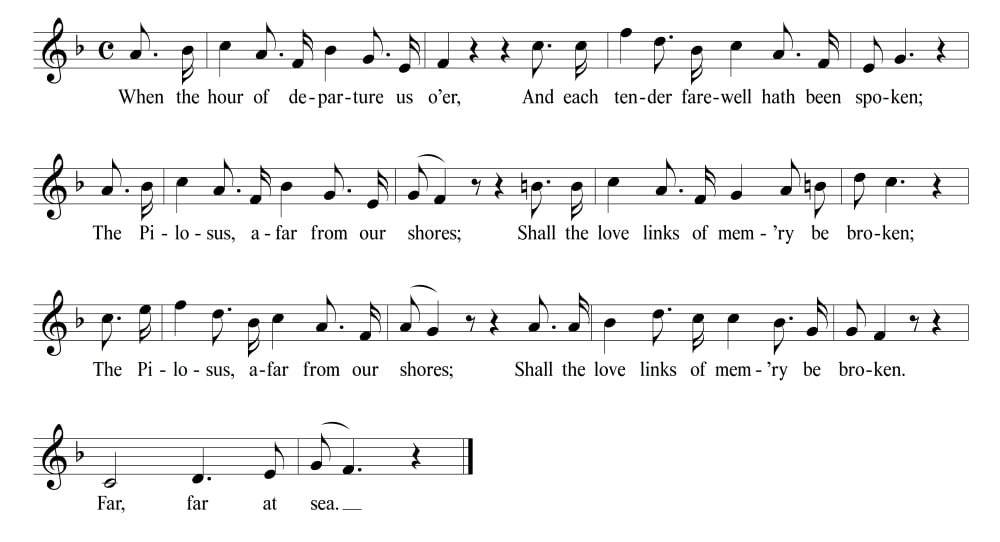
Synthesised sound file, Australharmony 2018
Source:
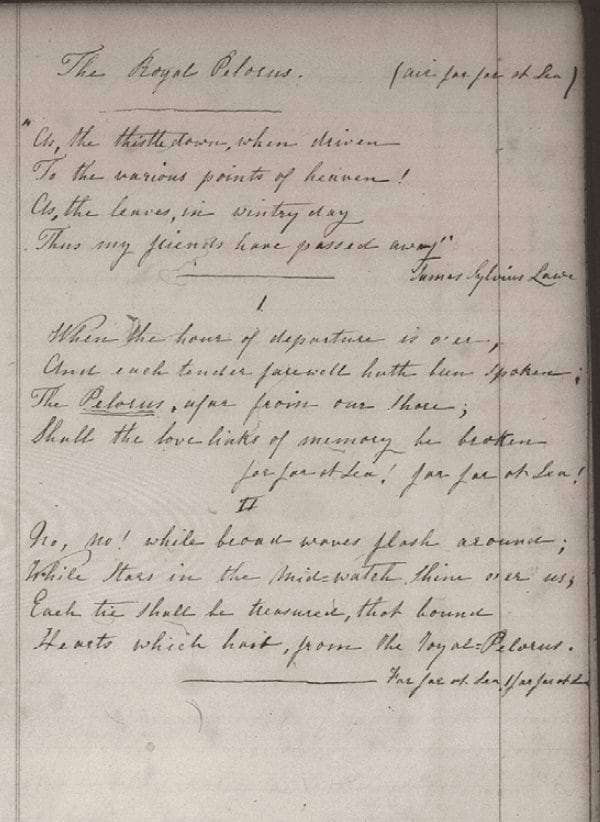
The vase
http://digital.sl.nsw.gov.au/delivery/DeliveryManagerServlet?dps_pid=FL9674375 (DIGITISED)
The Royal Pilosus (air far far at sea)
[Epigraph] "As, the thistle down, when driven
To the various points of heaven!
As, the leaves, in wintry day
Thus my friends have passed away"
- James Sylvius Law.
I
When the hour of departure is o'er,
And each tender farewell hath been spoken;
The Pilosus, afar from our shores;
Shall the love links of memory be broken.
Far far at sea! Far far at sea!
II
No, no! while broad waves plash around;
While stars in the mid-watch shine over us,
Each tie shall be treasured, that bound
Hearts which last, from the Royal Pilosus.
Far far at sea! Far far at sea!
Music concordances:
Far, far at sea; words by ? , in Variety, London, 1802; words by ?; music by Charles Haiman Florio (1770-1819)
Far far at sea, a favorite ballad, sung by Mr. Incledon, in his new entertainment called Variety, and by Mrs. Bland at Vauxhall, composed by C. H. Florio (London: Goudling, Phipps & D'Almaine, [1803])
https://trove.nla.gov.au/version/221347031
https://catalogue.nla.gov.au/Record/6977820
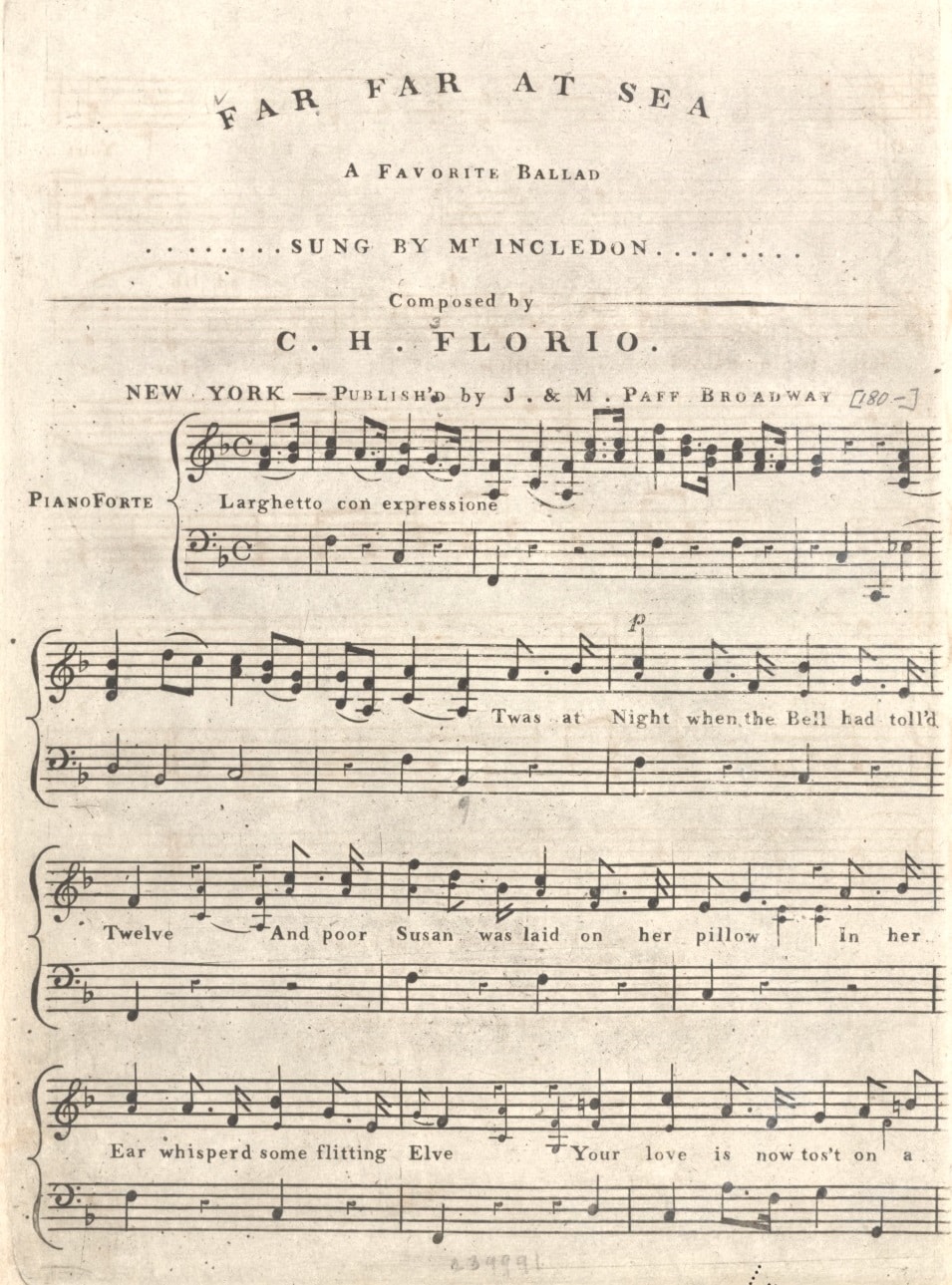
Far far at sea, a favorite ballad sung by Mr. Incledon . . . (New York: J. & M. Paff, [n.d.])
https://www.loc.gov/item/2014568420 (DIGITISED)
Far, far at sea, sung with great applause by Mr. Webster . . . (Philadelphia: G. E. Blake, [n.d.])
http://levysheetmusic.mse.jhu.edu/collection/109/052 (DIGITISED)
https://hdl.handle.net/2027/mdp.39015096477495 (DIGITISED)
References:
On Florio, see A biographical dictionary of actors, actresses, musicians, dancers, managers . . . volume 5: Eagan to Garrett (Carbondale and Edwardsville: Southern Illinois University Press, 1978), 311-12
https://books.google.com.au/books?id=iR8jadDrevwC&pg=PA311 (PREVIEW)
Undated 3 - The evening star - of The girl I left behind me - Now Hesper weeps her glistening tears (tune: The girl I left behind me)
Commentary:
Among the undated songs in The vase, The evening star ("Now Hesper weeps her glistening tears, / high o'er the Atlantic ocean . . .") is clearly set to the tune, as well as recalling the words of the popular regimental march tune The girl I left behind me. The melody was published in England in 1799 under the military title Brighton Camp. Moore included it the seventh number of the Irish melodies (1818), and Bunting, though he did not print it until 1840, claimed to have first collected it from Arthur O'Neill as early as 1800.
The epigraph is from Samuel Laman Blanchard's Stanzas for evening.
Words and melody edition (first stanza only):
"Now Hesper weeps her glistening tears" (Dunlop undated); tune: The girl I left behind me (Moore 1818)
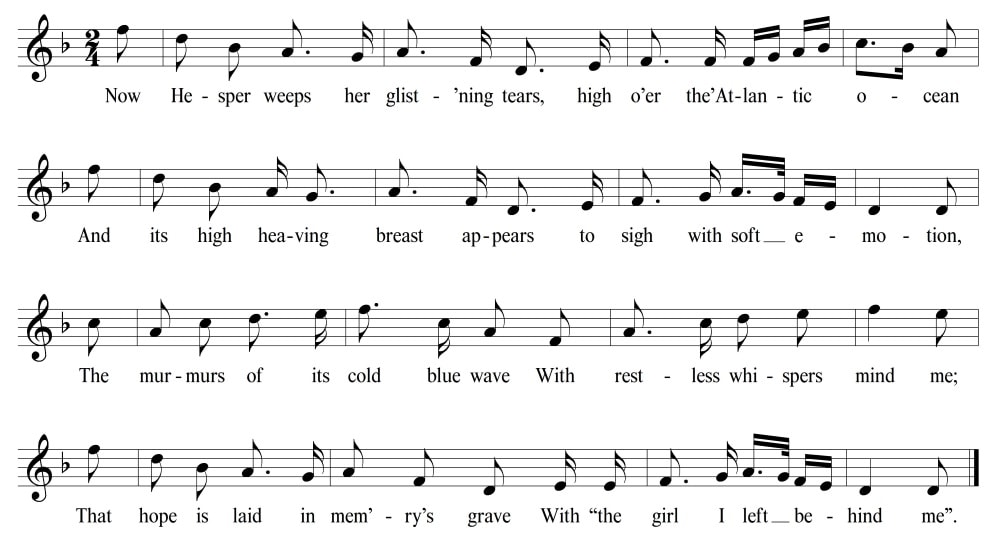
Synthesised sound file, Australharmony 2018
Sources:
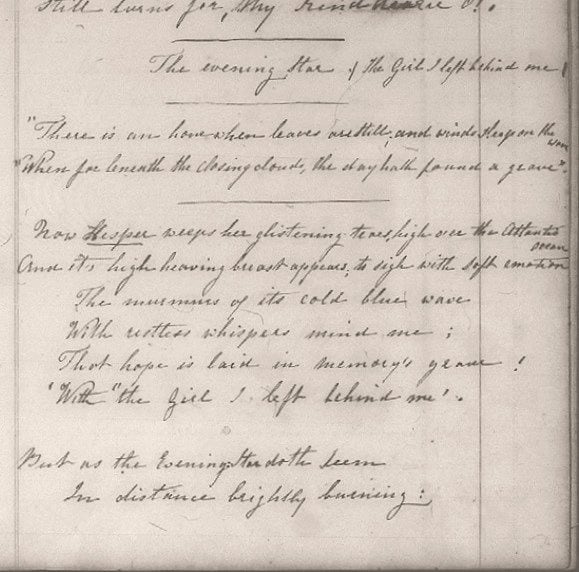
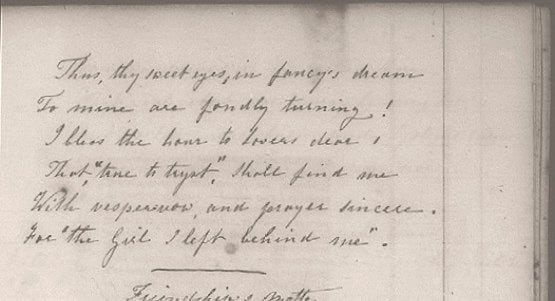
The vase
http://digital.sl.nsw.gov.au/delivery/DeliveryManagerServlet?dps_pid=FL9674337 (DIGITISED)
The evening star of The Girl I left behind me
"There is an hour when leaves are still, and winds sleep on the wave,
"When far beneath the closing clouds, the day hath found a grave". [Laman Blanchard]
Now Hesper weeps her glistening tears, high o'er the Atlantic ocean
And its high heaving breast appears to sigh with soft emotion,
The murmurs of its cold blue wave
With restless whispers mind me;
That hope is laid in memory's grave
With "the girl I left behind me".
But as the Evening Star doth seem
In distance brightly shining:
Thus, thy sweet eyes, in fancy's dream
To mine are fondly twining!
I bless the hour to lovers dear
That "time to tryst" shall find me
With vesper-vow, and prayer sincere,
For "the girl I left behind me."
Music concordances:

Twenty four new country dances for the year 1799 with proper directions to each dance as they are performed at court, Almacks, Bath, Pantheon, and all publick assemblies (London: T. Skillern, 1799), 7
Copy at the English Folk Song and Dance Society (digitised)
http://catalogue.efdss.org/cgi-bin/koha/opac-detail.pl?biblionumber=15204
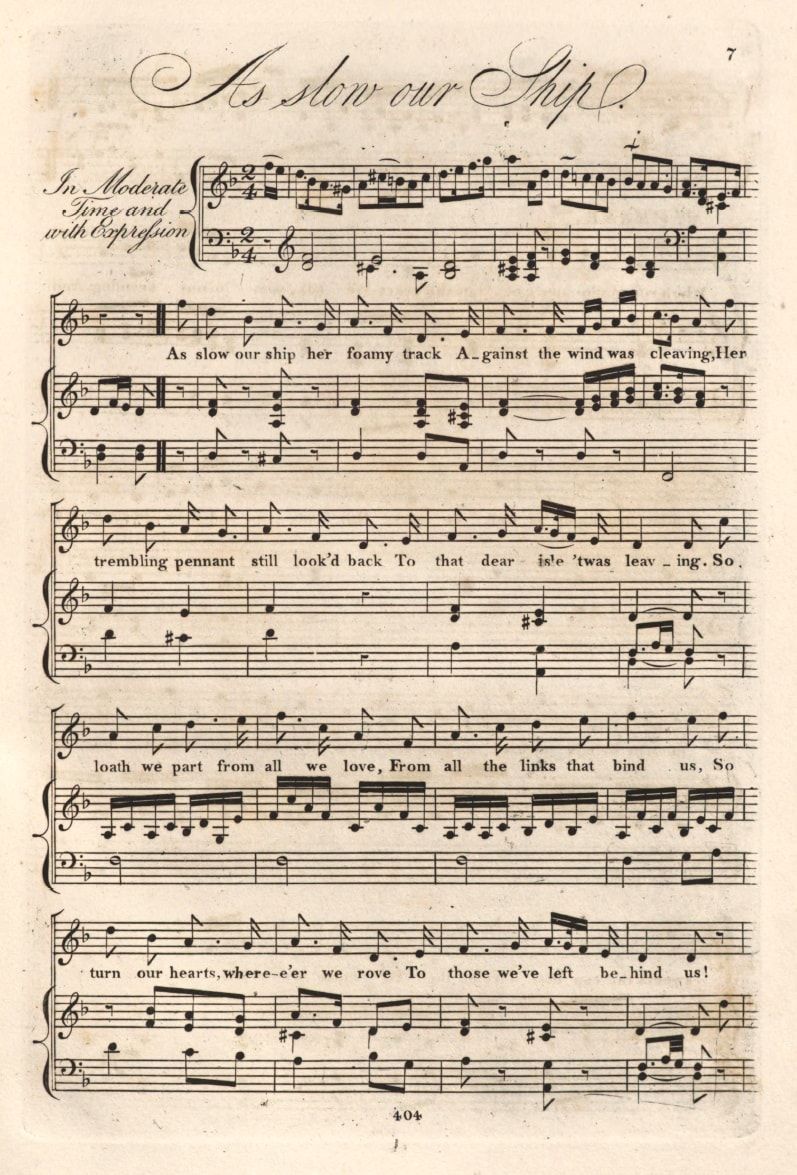
Moore and Stevenson 7-1818, 7
https://books.google.com.au/books?id=PwBfAAAAcAAJ&pg=PA7 (DIGITISED)
https://archive.org/stream/MooreIrishMelodies17/Moore_IrishMelodies_1-7#page/n533/mode/2up (DIGITISED)
http://reader.digitale-sammlungen.de/de/fs1/object/goToPage/bsb11131647.html?pageNo=21 (DIGITISED)
Bunting 3-1840, index
https://archive.org/details/ancientmusicofir00bunt/page/n121 (DIGITISED)
Bunting 3-1840, 42, tune (with major ending)
https://archive.org/details/ancientmusicofir00bunt/page/42 (DIGITISED)
William Chappell, Popular music of the olden time . . . vol. 2 (London: Cramer, Beale, & Chappell, [1856]), 708-711 (with music 710)
https://archive.org/stream/popularmusicofol02chapuoft#page/710/mode/2up (DIGITISED)
References:
Lyric offerings by S. Laman Blanchard (London: William Harrison Ainsworth, 1828), 75
https://books.google.com.au/books?id=UlkjTkmNst8C&pg=PA75 (DIGITISED)
The poetical works of Laman Blanchard, with a memoir by B. Jerrold (London: Chatto and Windus, 1876), 155
https://archive.org/details/poeticalworksla00blangoog/page/n169 (DIGITISED)
Undated 4 - Mo Varia Astore [?] - Yes I have wept, to see thus faded - (? Tune: O Mary Asthore)
Commentary:
This is almost certainly also a song, and given Dunlop's title ("Varia" being Mary), plausibly to the tune of O Mary Asthore, as given by Stanford, Petrie, no. 636
Source:
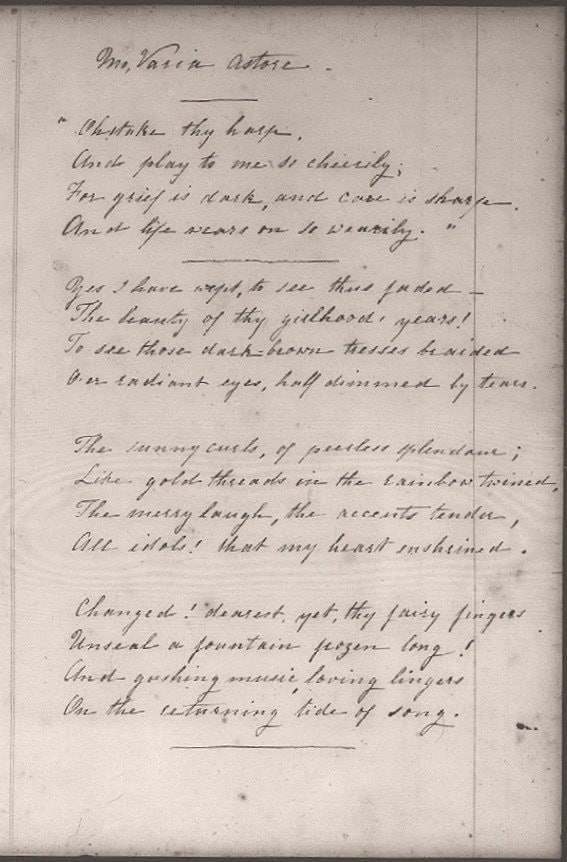
The vase
http://digital.sl.nsw.gov.au/delivery/DeliveryManagerServlet?dps_pid=FL9674404 (DIGITISED)
Mo, Varia Astore
"O strike thy harp,
And play to me so cheerily;
For grief is dark, and care is sharp
And life wears on so wearily." [Thomas Hood, altered]
Yes I have wept, to see thus faded -
The beauty of thy girlhood years!
To see those dark-brown tresses braided
O'er radiant eyes, half dimmed by tears.
The sunny curls, of peerless splendour;
Like gold threads in the rainbow twined,
The merry laugh, the accents tender,
All idols! that my heart enshrined.
Changed! dearest, yet, thy fair fingers
Unseal a fountain frozen long!
And gushing music loving lingers
On the returning tide of song.
Music concordances:

Charles Villiers Stanford (ed.), The complete collection of Irish music as noted by George Petrie . . . (London: Boosey and Co., 1903/04), no. 636, 159
See also "O Mary Asthore", Tune archive
https://www.tunearch.org/wiki/O_Mary_Asthore
References:
[Thomas Hood], "TO HOPE", The London magazine (July 1821), 85
https://books.google.com.au/books?id=FsAYAAAAMAAJ&pg=PA85 (DIGITISED)
O! take, young Seraph, take thy harp,
And play to me so cheerily;
For grief is dark, and care is sharp,
And life wears on so wearily . . .
Undated 6 - Nathan - Sweet voice of song! Australian shores
Commentary:
The epigraph ("And joy and sorrow both convey, / Man's mortal bark along its way") is from John Bowring's English translation (first published 1828) of the Hungarian ballad "Lovely Lenka" (Szép Lenka vár a' part fellet), by Ferenc Kölcsey (1790-1838).
Sources:
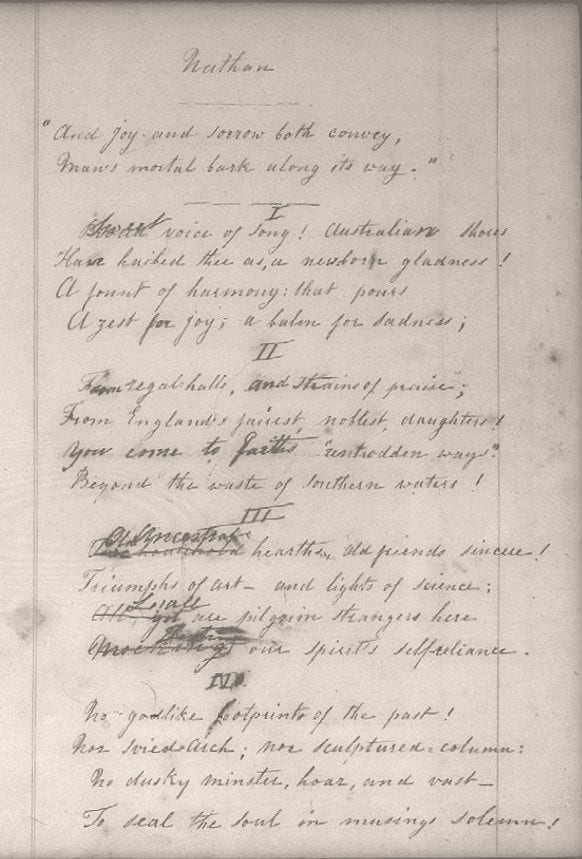
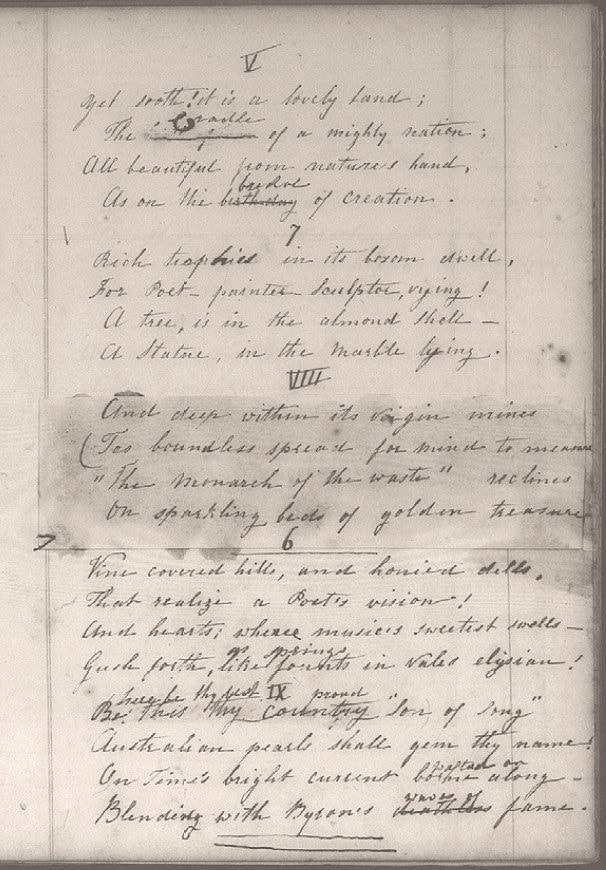
The vase
http://digital.sl.nsw.gov.au/delivery/DeliveryManagerServlet?dps_pid=FL9674377 (DIGITISED)
Nathan
"And joy and sorrow both convey,
Man's mortal bark along its way."
- - -
I
[Proud] Sweet voice of song! Australia's shores
Have hailed thee as a newborn gladness!
A fount of harmony: that pours
A zest for joy; a balm for sadness;
II
From regal halls, and strains of praise;
From England's fairest, noblest daughters!
You come to faith's [?] "untrodden ways."
Beyond the waste of southern waters!
III
[The household] Ancestral hearths, old friends sincere!
Triumphs of art - and lights of science;
[All yet] Lo! all are pilgrim strangers here
[Mocking] Testing our spirit's self-reliance.
IV
No godlike footprints of the past!
No ivied arch; nor sculptured column:
No dusky minster, hoar, and vast -
To seal the soul in musings solemn!
[88] V
Yet sooth! it is a lovely land;
The [birth-place] cradle of a mighty nation;
All beautiful from nature's hand,
As on the [birthday] bridal of creation
7 [sic]
Rich trophies in its bosom dwell,
For Poet - painter - sculptor, vying!
A tree, is in the almost shell
A statue, in the marble lying.
VIII
And deep within its virgin mines
Too boundless spread for mind to measure
"The monarch of the waste" reclines
On sparkling beds of golden treasure.
6 [sic]
Vine covered hills, and honied dells,
That realize a Poet's vision!
And hearts; whence music's sweetest swells -
Gush forth, like founts [as springs] in vales elysian!
IX
Be this thy country [May be thy best proud] "Son of Song"
Australian pearls shall gem thy name
On Time's bright current [borne along] wafted on
Blending with Byron's [deathless] waves of fame.
References:
[Károly György Rumy, translated by John Bowring], [Review] "Language and literature of the Magyars", The foreign quarterley review (September 1828), 62
https://books.google.com.au/books?id=B4ALAAAAQAAJ&pg=PA62 (DIGITISED)
See Walter E. Houghton, The Wellesley index to Victorian periodicals 1824-1900 ( ), 141, number 56
https://books.google.com.au/books?id=HhPG4Hm97mkC&pg=PA141 (DIGITISED)
John Bowring, Poetry of the Magyars: preceded by a sketch of the language and literature of Hungary and Transylvania (London: The author, 1830), 154
https://books.google.com.au/books?id=dVdnAAAAcAAJ&pg=PA154 (DIGITISED)
Appendix 1 - Song of the Aborigines - Bail-gammon! Bail-gammon! The cooey from far [Samuel Prout Hill] (Tune: Tambourgi [Nathan])
For main entry in checklist:
https://sydney.edu.au/paradisec/australharmony/checklist1841-1845.php#1842-02-05-nathan-eagle-chief
Sources:
"ORIGINAL POETRY", The Sydney Morning Herald (23 April 1844), 4
http://nla.gov.au/nla.news-article12409847
ORIGINAL POETRY.
[The following song has been written out of sheer compassion for the narrowed intellects of the blacks: the "EAGLE CHIEF," "ABORIGINAL MOTHER," &c., being considered of too flighty and exalted a nature to be comprehended by the dark and benighted understandings of our brethren of the woods: Damnant quod non intelligunt.]
SONG OF THE ABORIGINES.
AIR--"TAMBOURGI."
I.
BAIL-gammon! Bail-gammon! [1] The cooey [2] from far,
Dark frowns on the Settler with promise of war;
Now the tribes of the mountains with shouts take their way,
MURRUMBIDGEE, WOLLOMBI, and dark BROKEN BAY.
II.
Oh! who is more ugly than brave Broken-bay,
With his greasy old blanket, and jacket so gay,
To the gins [3] in his goonyer [4] he leaves all he's got,
His boomering, waddy, [5] and smoky tin pot!
III.
Shall thy sons, Murrumbidgee, who never forgive
The fault of a friend, bid an enemy live?
With gummy's [6] unerring ne'er let thy foes swim--
What mark is more fair than the breasts of black-bream?
IV.
Though the Squatter [7] sends slugs with a ne'er failing aim,
And hopes by his powder thy courage to tame;
On the brickfielder's [8] blast dark vengeance shall ride
And sweep the rude plain with gaunt death by its side.
V.
Then the White-boys [9] shall whistle the note of the lagg'd--
And teach the pale Franks what it is to be scragg'd:
They shall leave on their wild track the blood of their foe,
For the dark pall of night shall encourage the blow.
VI.
I ask not the pleasures that labour can buy,
My spear strikes so deep--one blow--and you die;
From the neighbouring tribe it shall woo me a gin,
And her soft smiles shall lull--her caresses shall win.
VII.
I love the black face of the gin in her pride,
I love her endearments and snubb'd nose beside:
She shall bring from her goonyer some musical lad,
To yell me a tale on the fall of her dad.
VIII.
Remember the moment when brave Jacky [10] died,
To the scragging-post yard arm the poor fool was tied;
But the cry of revenge shall yet peal through the air.
And the burst of our triumph cause phrenzied despair.
IX.
I talk not of mercy, our ways are our own,
Old Tamara's King--and the wild bush his throne.
We bow to his mandate and none shall dare say--
We allow'd the pale English to scrag us away!
X.
For Tamara's son to the wilds has now sped--
Let the white man beware of his dark bushy head!--
In wrath he returns with his brave tribe again,
And the blood of the cattle shall redden the plain.
XI.
Bail-gammon! Throw high now old Tamara's spear!
Bail-gammon! That cooey proclaims they are near;
One yell of dark hate to the white man who scraggs;
One shout for their cattle and--sweet sugar bags!
S. P. H.
[1] Bail-gammon. Literally--no falsehood. This is a
barbarism; and, for a barbarous expression, is certainly
full of meaning. When employed as an interrogative it
implies a good humoured suspicion; thus it might be
rendered in classical language--"you are not telling me a
crammer, are you?" The way in which it is employed
above, is, more properly speaking, an asseveration;--
and implies that what is to follow is--"a fact--and no
mistake!"
[2] A shout. Produced by a tremendous exertion of the lungs.
[3] Gins. Women.
[4] Goonyer. Hut.
[5] Boomering,--waddy. Implements of war.
[6] Gummy. Spear.
[7] Squatters. Friends of Sir George Gipps. (?)
[8] Brickfielder. Southerly wind.
[9] White- boys. Bushrangers.
[10] Jacky-Jacky, was executed for murder.
Music concordances:
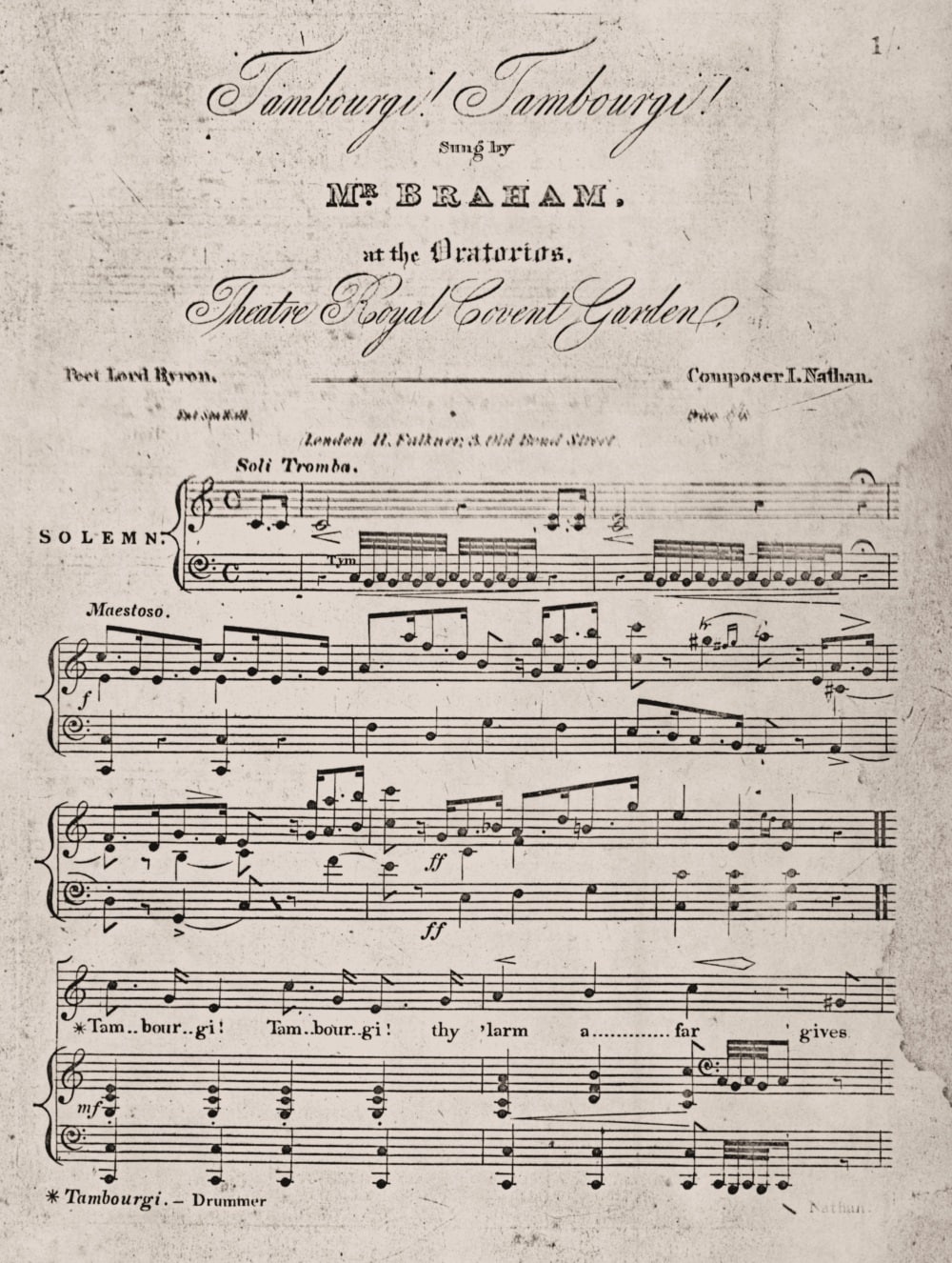
Tambourgi! Tambourgi! sung by Mr. Braham at the oratorios, Theatre Royal, Covent Garden, poet Lord Byron, composer I. Nathan (London: H. Falkner, [1831])
https://trove.nla.gov.au/version/171071900 (NLA, 1980s ABC photocopy of copy in SL-NSW) (DIGITISED)
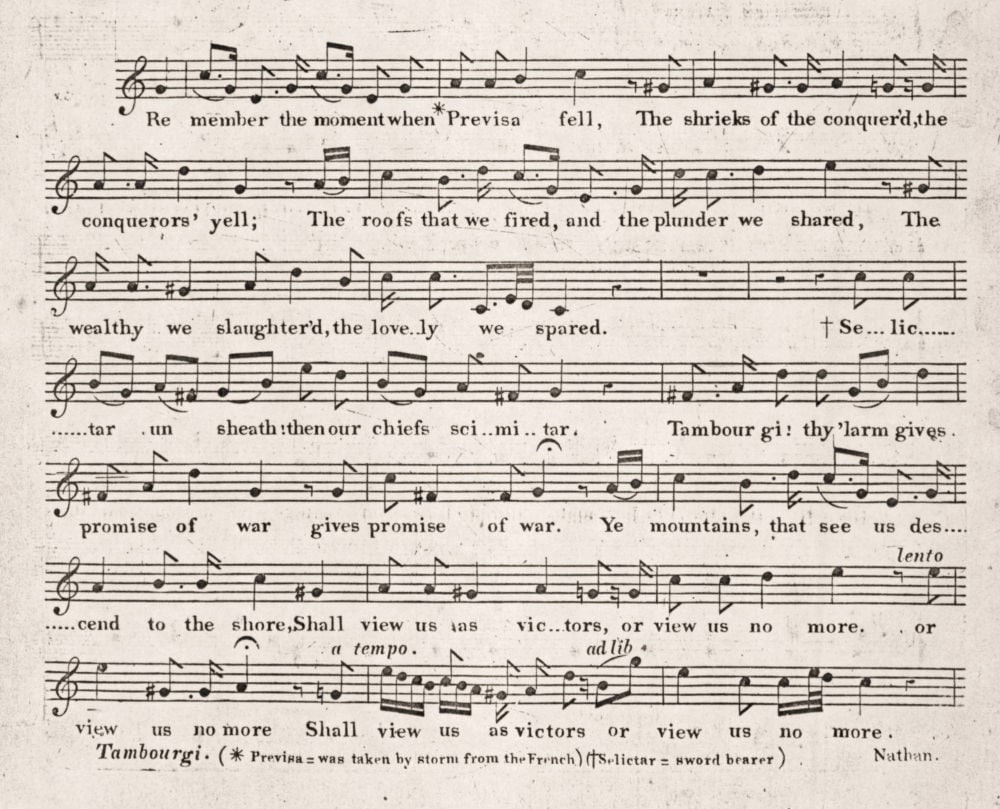
As shown above (the last stanza of the Byron-Nathan original) each musical stanza sets 8 lines of texts, coinciding with 2 4-line verses in Prout's parody; however, it is likely that Prout only had the first half of the tune in mind.
References:
[Music reviews], The Athenaeum 200 (27 August 1831), 556
https://books.google.com.au/books?id=Ai1HAQAAIAAJ&pg=PA556
The poet (Samuel Prout Hill); William Nicholas (1807-1854); National Gallery of Australia; 87.1645
http://www.printsandprintmaking.gov.au/works/3722/images/1756
Appendix 2 - A good black gin - You may drain your glasses (words: J. W. Dent; setting: Nathan)
WARNING: THIS SONG IS DEEPLY DISRESPECTFUL OF ABORIGINAL PEOPLE
For main entry in checklist:
Sources:
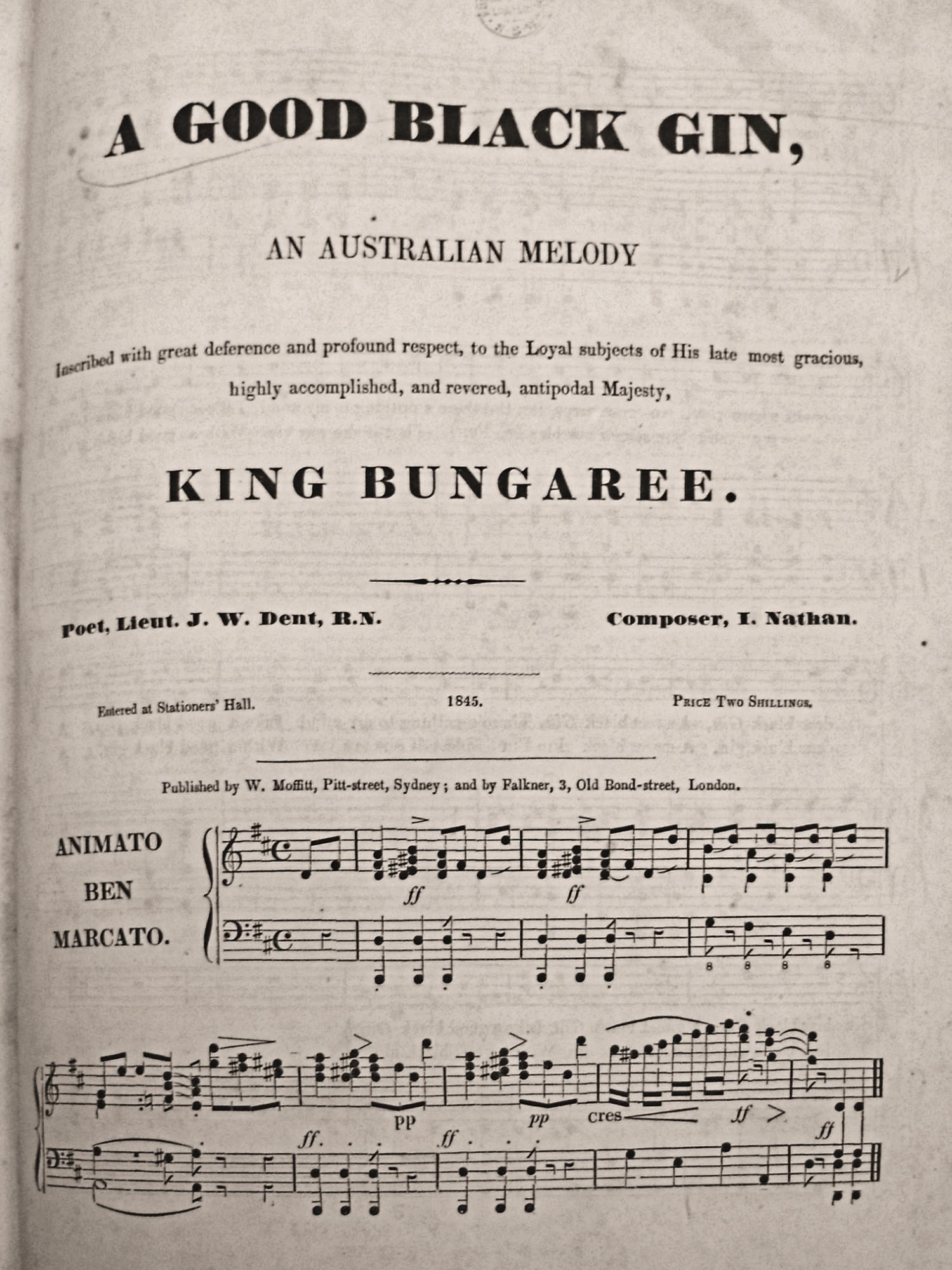
A good black gin, an Australian melody, inscribed with great deference and profound respect, to the loyal subjects of his late most gracious, highly accomplished, and revered, antipodal majesty, king Bungaree; poet, Lieut. J. W. Dent, R.N.; composer, I. Nathan (Sydney: Published by W. Moffitt, Pitt-street, 1845)
Copy at the State Library of New South Wales (page 1 pictured above, page 4 with last verse and chorus, below)
https://trove.nla.gov.au/version/20837032
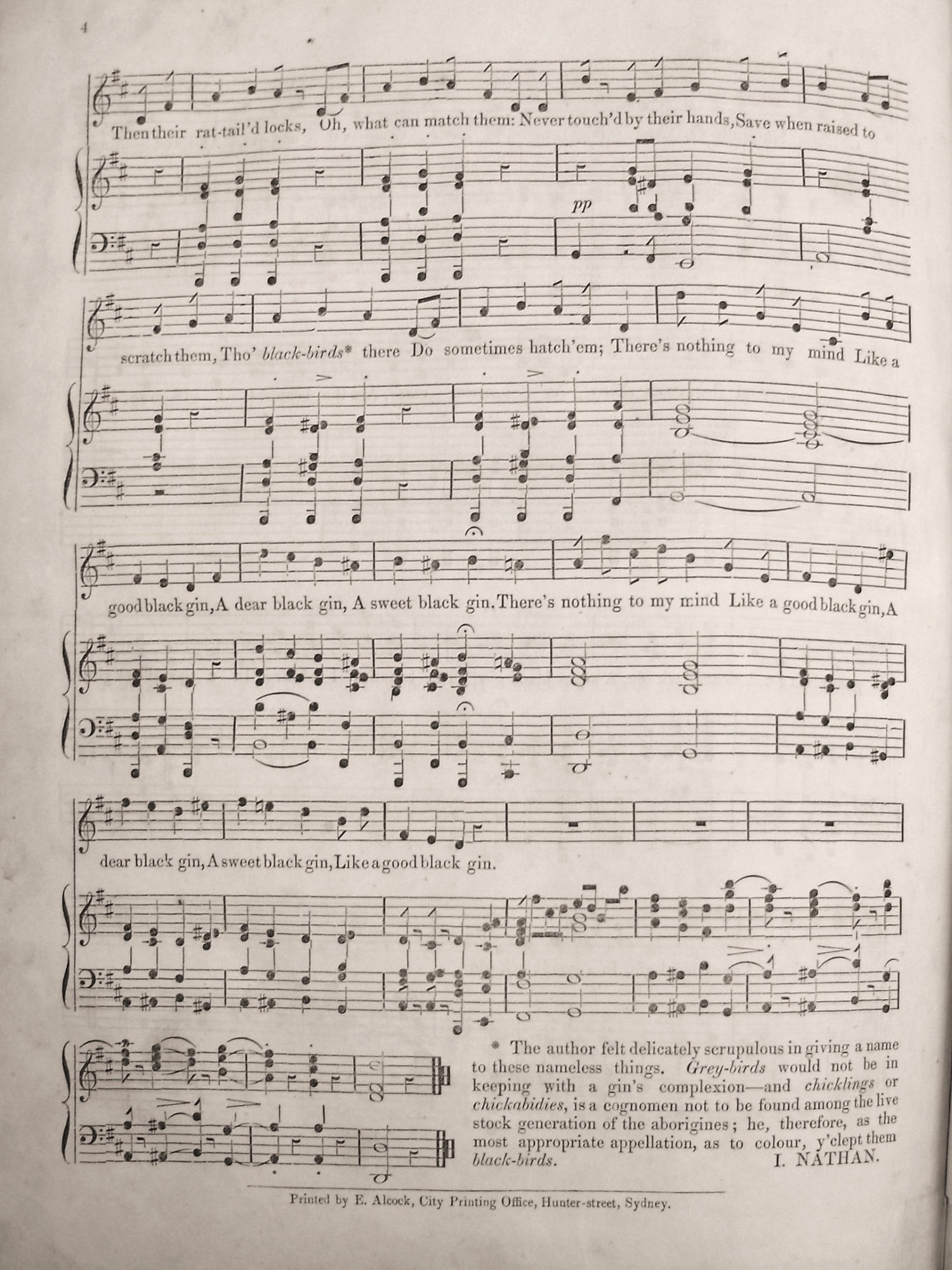
Documentation:
[Advertisement], The Sydney Morning Herald (24 February 1845), 2
http://nla.gov.au/nla.news-article12877634
THIS DAY IS PUBLISHED, By W. MOFFITT, PITT-STREET, Price 2s., A GOOD BLACK GIN: AN AUSTRALIAN MELODY. Inscribed with great deference, and profound respect, to the loyal subjects of his late most gracious, highly accomplished, and revered antipodal Majesty KING BUNGAREE. Poet - LIEUT. DENT, R.N. Composer - J. NATHAN.
"NEW SONG", The Sydney Morning Herald (24 February 1845), 2
http://nla.gov.au/nla.news-article12877635
We have received a newly published song, the words by Lieutenant Dent, and the music by Nathan. It is in praise of a black gin, and is as ribald a production as it has been our lot to meet with for a long time. It cannot be admitted into any decent family, and we regret that any of Nathan's music should be arranged to such words.
"NATHAN'S BLACK GIN", The Australian (4 March 1845), 3
http://nla.gov.au/nla.news-article37155362
This seems likely to become a very popular Air, having been performed in excellent style by the Band of the 99th, in the Domain, on Thursday last, to a numerous and fashionable assemblage.
References:
- - -
Appendix 3
"Original Poetry", The Omnibus and Sydney Spectator (1 April 1843), 16
http://nla.gov.au/nla.news-article228064354
TO -------- --------
The following lines are inscribed to Mr. Nathan, with a request that he will compose music for them.
I've roamed in many a distant land,
And many a form of beauty seen,
From the bright orients glowing strand,
To western wilds my step has been . . .
"LINES BY W. CHAUCER, WOLLOMBI", The Sentinel (15 October 1845), 3
http://nla.gov.au/nla.news-article226464050
"ORIGINAL VERSES BY W. CHAUCER, WOLLOMBI", The Sentinel (10 December 1845), 3
http://nla.gov.au/nla.news-article226463217
General documentation (Dunlop and family)
Shareable link for all TROVE items tagged Eliza Hamilton Dunlop
https://trove.nla.gov.au/search?l-publictag=Eliza+Hamilton+Dunlop (TROVE tagged)
Shareable link for all TROVE items tagged David Dunlop d1863
https://trove.nla.gov.au/search?l-publictag=David+Dunlop+d1863 (TROVE tagged by Australharmony)
1812
"SIGNATURES OBTAINED TO THE PETITION OF THE PROTESTANTS IN FAVOUR OF CATHOLIC EMANCIPATION", The Belfast monthly magazine (July 1812), 80-81
https://books.google.com.au/books?id=GvkzAQAAMAAJ&pg=PA80
. . . Errors in the former list from Coleraine. For Daniel Dunlop, read David Dunlop . . .
1836
? [News], The Londonderry journal [Belfast, Ireland] (22 November 1836), 2
On Sunday, the 13th, the elegant new Catholic Chapel at Coleraine, the foundation stone of which was laid by the agent for the Honourable the Irish Society, was consecrated by the Right Rev. Dr. McGettigan, of Raphoe, in the unavoidable absence, caused by infirmity, of the Right Rev. Dr. McLaughlin. The Rev. P. O'Loughlin, of Ballynascreen, preached a most eloquent discourse on the occasion. The collectors were Dr. Reid, Thomas Dunlop, Thomas Black, James Gribben, and David Dunlop Esqrs. . . .
NOTE: Reece 1967 claims that David Dunlop was a Catholic; it this was him, he was probably a protestant collector; according to the 1841 census, of the 12 people living in the Dunlop residence at Wollombi, 11 were Church of England, 1 Catholic; Dunlop was buried by the Anglican minister
1838
"SHIPPING INTELLIGENCE", The Sydney Herald (26 February 1838), 2
http://nla.gov.au/nla.news-article12860694
From Liverpool, via Hobart Town, yesterday, having left the former port the 19th September, and the latter the 13th instant, the ship Superb, Captain Briscoe, with merchandise. Passengers, H. A. Carrington, Esq., Mrs. Carrington, and five children, John Malcolm, Esq., Mrs. Malcolm and three children, Mr. George Moore, Mr. P Evans, Mr. Henry Farecroft, Mr. Thos. Mort, Mr. E Kerr, Mr. P. Hay, Mr. J. McKenzie, Mr. John Stafford, Mr. James Lowe, Mr. David Dunlop, Mrs. Dunlop, and four children, Mr. and Mrs. Lock, and seven children, Mrs. Ashton, Mr. H. Peckham, Mrs. Peckham, Mary Lacy, Margaret Butler, Elizabeth and Emma Wright, Isabella Billyer, Andrew Wallace, Richard Norris, Thomas Bell, Joseph Holt, Eliza Holt, and four children, Francis Argo, Thomas Foster, and Thomas Williamson.
1839
"LEGISLATIVE COUNCIL. WEDNESDAY, NOVEMBER 13", The Colonist (16 November 1839), 2
http://nla.gov.au/nla.news-article31724040
"To the Editor of The Colonist", The Australian (17 December 1839), 2
http://nla.gov.au/nla.news-article36860921
Sir - Having been, during a long period of years, an unflinching advocate of that palladium of British liberty, an unshackled press - of that fourth estate which rules, and should rule without favour or affection, or malice - and believing too, that public men and measures are ever benefitted by its advocacy, or censure, I would be the last to complain of it, even as a vehicle of private malice, were not truth violated.
Since my taking office in this land, the conscientious discharge of my duties have been my first care, and to have noticed from time to time the howls of envy, or the querulous yelpings of disappointed minds, either in high or low places, could not in any way have benefitted that public on whom devolves the payment of my services - but now, when two members of the Legislative Council have taken advantage of their place and privilege to give vent to their malignant feelings, there may be, among the many whose esteem and confidence it is necessary I should hold - there may, I repeat, be a few who would give credence to the slanders, did I permit them to pass unrefuted.
In your report, Mr. Editor, of the debate on the police estimates, you represent Captain King to have said, that "Mr. Dunlop chose to associate with the chief constable, and to send to a public-house for a bottle of wine to drink with the chief constable" . . .
"TO THE EDITOR OF THE COLONIST", The Colonist (18 December 1839), 2
http://nla.gov.au/nla.news-article31724238
NOTE: Regarding the use of David Dunlop's phrase "a vehicle of private malice in the title of Wu 2014, it should be noted that he was addressing his remarks to the editor of The colonist, James McEachern, a radical, and that the statements he was contesting were published as part of a report of the proceedings in the Legislative Council.
On McEachern, who died in Melbourne on 1 June 1860, see "MELBOURNE", The Sydney Morning Herald (11 June 1860), 8
http://nla.gov.au/nla.news-article28627251
See also Terry Irving, The southern tree of liberty: the democratic movement in New South Wales (Sydney: Federation Press, 2006), 57-58
https://books.google.com.au/books?id=Ss29l9YX1BcC&pg=PA57 (PREVIEW)
1841
New South Wales - Census of the year 1841. Abstract of the returns of the population . . . of Wollombi, County of Northumberland (7 pages); State Archives of New South Wales
https://www.ancestry.com.au/interactive/1214/CSAUS1841A_081759-00166
NOTE: Dunlop himself, as returning officer, signed off the census
See also "NEW SOUTH WALES CENSUS OF THE YEAR 1841", New South Wales Government Gazette (31 August 1841), 1172a-d
http://nla.gov.au/nla.news-article230395037
1842
Despatch, George Gipps, Sydney, 19 July 1842, to Lord Stanley, London; ed. in HRA 1/22, 158-59
http://arrow.latrobe.edu.au:8080/vital/access/manager/Repository/latrobe:34915 (DIGITISED)
My Lord, Government House, 19th July, 1842.
I have had the honor to receive Your Lordship's Despatch No. 67 of the 22nd Feby. last,
informing m e that Your Lordship had received an application from Mr. R. C. Lethbridge to be appointed Police Magistrate of Penrith;
and desiring to be informed of the circumstances under which Mr. Dunlop was appointed Police Magistrate of the Penrith District in 1838,
and subsequently removed to Wollombi in 1839; and in reply I have the honor to state to Your Lordship that,
on my arrival in this Colony in Feby., 1838, I found that the Bench of Magistrates at Penrith had been long
and urgently pressing for the appointment of a Stipendiary Magistrate in their District;
and that, in consequence of a renewed application to me, dated the 29th May, 1838,
I appointed Mr. David Dunlop, formerly of Coleraine, a gentleman who had been strongly recommended to me by the
late Mr. Drummond on the part of the Irish Government.
I have since had reason to believe that the Bench of Penrith, in recommending the appointment of a Paid Magistrate, expected or hoped that one of their own Body (Mr. R. Copeland Lethbridge) would have been the person selected to fill it; but such an appointment would have been contrary to the principles on which I have ever acted, and, if not an abuse in itself, would not unjustly have given rise to the suspicion of abuse. Mr. Lethbridge was a resident at or near Penrith, and already in the Commission of the Peace; to have made him a Paid Magistrate would have been to pay him for doing that which it was his duty to do, or assist in doing without being paid; and would in reality have been nothing more or less than what is commonly called a Job.
If it be Your Lordship's desire to have Mr. Lethbridge appointed a Police Magistrate, I shall be most happy to comply [159], with that desire on the first opportunity which may present itself; but I must earnestly press upon Your Lordship that such an appointment should not be for the District of Penrith.
The appointment of Mr. Dunlop in 1838 did not give satisfaction to the Bench of Penrith; on the contrary, many disagreements between Mr. Dunlop and the unpaid Magistrates arose, and the enquiry into and settlement of which gave no small trouble to the Government.
I therefore was well pleased when the Committee of the Legislative Council, which sat in 1839 to consider the state of the Police, reported (inter alia) that, as there was a sufficiency of unpaid Magistrates residing at or near Penrith to transact the business of the District, the presence of a Paid Magistrate might be dispensed with. I accordingly removed Mr. Dunlop from Penrith to Wollombi, a place to which the Committee recommended that a Paid Magistrate should be appointed; and Mr. Dunlop still remains at Wollombi, there not being I believe an unpaid Magistrate within I believe 30 miles of him . . .
1845
Reply to questions in circular letter (originally sent by William Macpherson, clerk of the Legislative Council, Sydney, 3 September 1845); "From David Dunlop, Esq., J. P., Wollombi", in Report of the Select Committee on the condition of the Aborigines (Sydney: N.S.W. Legislative Council, 1845), 29-31
1.- What is the probable number of Aborigines in your district, distinguishing males, females, and children?
1.-The aborigines of the Wollombi and Macdonald River district are seventy-three in number, divided into three tribes. Township of Wollombi tribe, hunting ground extending to Patrick's Plains. Ellalong tribe, hunting ground joining that of the Maitland blacks, and the Macdonald River tribe, who range from the Colo to Wiseman's Ferry. Of the first there are fourteen men, ten women, two male children, and one little girl; one of the men aged fifty-five, is blind from old age; one young man born deaf and dumb; another one is lame. The Elalong tribe, eighteen men, eight women; one boy eleven years, one girl twelve, and one five years old. The Macdonald River tribe, twelve old men, three women aged forty, thirty-five, and twenty-five years ; two boys about eleven years old; no children. According to the statement of one of the early settlers, this latter tribe, in his memory, exceeded three hundred.
2.- Has the number diminished or increased, and if so, to what extent, within the last five or ten years?
2.- The number has decreased; although many children have been born, they seldom live over the first winter.
3.- Has the decrease been among the children or adults?
3.- Within the last five years the deaths of adults in the Wollombi tribe are as follows:- One very fine young man fell from a tree, and died on the spot; another was shot by an unseen hand when sitting at his night fire with his two gins, one of whom he had recently stolen from the Brisbane Water tribes. There was much angry excitement and some skirmishing between the tribes, but they are now on friendly terms. A third death, that of the Wollombi Chief's brother, has never been accounted for by any one; he was found dead in a deserted hut, and in such a state of decay, that the cause of his death could not be ascertained. Two old men, and one aged woman, have died during the last winter. I have no hesitation in stating my belief, that they died of cold and hunger.
4.- To what causes do you attribute the decrease in your district?
4.- Answered in query third.
5.- What is their actual condition and means of subsistence?
5.- Their condition during the winter is miserable in the extreme; women, who are perhaps suckling infants, will be for half a day or night in the water spearing eels. At other times they may be seen seeking for grubs or mimosa gum, with their young infants tied on their shoulders. In the spring and summer months, they have guanos, flying squirrel, and opossum, in tolerable quantity, but it is only during the reaping season, or while pulling and husking maize, that they are employed by the settlers. At the above periods they get plenty of good food, and also some clothing, such as shirts and trowsers. The men have an insuperable objection to wear any slop clothing that resembles the convict dress; as an instance, six pair of trousers having the government brand, were distributed by order of His Excellency, I could find none in use at the end of one week ; and the only answer to my enquiry was, "no good, all same like croppy."
6.- Has their ordinary means of subsistence diminished, and if so, what part of it, and from what causes; if it has increased, what part, and from what causes?
6.- Their regular and continuous means of subsistence have been decidedly diminished since the district became so much more densely inhabited. The kangaroo has entirely disappeared; the wallaby, the black swan, wild duck, wanga-wanga, bronze pigeon, and pheasant, are daily decreasing. For this loss, a few weeks food during harvest time, affords no adequate equivalent.
7.- Have blankets been issued to the Aborigines in your district heretofore, and for what period? What was the effect of giving them? Has the giving of blankets ceased? when did it cease; and what has been the effect of its cessation? Would it be advisable to resume the distribution?
7.- In the year 1840, there were twenty-two single blankets distributed to the Wollombi tribe, who at that time were at deadly feud with the Elalongs. In 1841, the number issued was eighteen single blankets of inferior size and quality. In 1842, there were forty single blankets sent to my order from the Colonial Storekeeper's, and these were distributed equally, according to number, amongst the three tribes. In 1843, the number received by me was thirty-two, the size and quality very bad. In 1844, after several applications, six single blankets were forwarded here from the Police Office, Maitland. These were given to two very aged women, and four gins were nursing mothers, all of the Wollombi tribe. For 1845, no blankets were issued. In answer to what was the effect of giving them, I say it was considered as a recognised tie between the ruler and the ruled. Their simple nature understood it thus, that the Governor sold their grounds to people who cut down the trees where the opossums dwelt, which had always furnished food for themselves, and warmth for their sleeping place, and for their women, and that in lieu thereof he gave blankets, which they accepted from want, but always spoke of as no sufficient recompence. The miserable dole having ceased, is looked upon as a breach of faith, of which the effects cannot yet be fully known, but a spirit of deeper discontent is engendered, and suffering to the trusting beings who looked for the needful aid is fearfully increased. I cannot convey an idea of the energetic feeling of the chief, when pleading for his very few old women and sick young ones all so cold, no hut, no blanket, no light fire on white fellow's ground, adding indignantly - "what we do, bail no fight like New Zealand fellow, no! I gave land, and have cold, and very hunger. No, did no bad, we not get blanket! what for?" My opinion, founded on an experience of upwards of seven years, is, that the issue of good serviceable blankets, (if blue or scarlet colour, so much the better), should be instantly resumed to all peaceable and friendly tribes, for although of small real utility to creatures of improvident habits, yet if the lives of a few infants be saved, and their wretched mothers comforted by the warmth of a blanket, such should be a consideration to the government far above all paltry saving of so many shillings or pounds.
8.- Have they been allowed or refused Hospital or Medical treatment in case of need; and in what manner; and, if allowed, at whose expense?
8.- I do not know of any application for aid in sickness having been made by aboriginals in this district. For wounds, they have simple remedies in various herbs, and for head and stomach ache, tea is the universal panacea.
9.- What proportion of them are either regularly or occasionally employed by the settlers, in what way? In what manner are they remunerated ?
9.- Answer in reply to query fifth.
10.- What habits have they bearing upon their aptitude for employment?
10.- Their early habits have unsuited them for settled employment, but when there is some definite object to be accomplished, or some peculiar interest in the pursuit, many of the men work diligently and well. Several of them are excellent reapers; they do not like the servile offices of cutting wood or fetching water, but willingly drive cattle or attend to horses. Two young men are employed by individuals in the township as household servants.
11.- Are they any, and how many, half-castes in your district? Are they living with or after the manner of the Aborigines ?
11.- There are no half castes, old or young, in this district. I have remarked that children for a few months after their birth, are of a much lighter shade of color than after two or three years' exposure to the changes of the climate.
12.- Is there any disposition on the part of the white labouring population, to amalgamate with the Aborigines, so as to form families?
12.- The female aborigines are as modest in demeanor, and quite as morally conducted as the native, or otherwise free women. There is no instance of their leaving their tribe, or connecting themselves "with the white labouring population."
13.- Are the Aborigines in friendly or hostile relations with the settlers in your district; if hostile, how has the hostility arisen, and what collisions have taken place between the two races; what loss of life has there been; and in what manner has it taken place on either side?
13.- Friendly and obliging in the extreme, willingly undertaking the task of tracing lost animals. Careful of property, strictly honest, and, unless when trained by the whites, will not speak a lie. The only aboriginal aggression in this district is in the case of a person named Lynch; the circumstances as narrated of both parties are of a revolting nature, and better left untold.
14.- What destruction of property has been occasioned by Aborigines?
14.- No destruction of property in this district has at any time been caused by aborigines.
15.- What are the relations, hostile or otherwise, of the Aborigines among themselves in your district?
15.- They are a peaceable people, and too few in number to have fights on a grand scale, but occasionally a few heads are broken with the koteri, or a spear wound inflicted in retaliation for some breach of their laws or customs. The rights of chase are closely looked after, and any encroachment on each other's boundaries occasions much hostile feelings betwixt the tribes. Sometimes the price of peace must be either a young gin, or an opposum cloak.
16.- Are their numbers directly or indirectly affected by their hostilities, and to what extent?
16.- Answered in reply to query fifteen.
17.- Is infanticide known among them?
17.- If the crime of infanticide exists, the instances must be very few, and occasioned only by the deepest misery and want. I have seen a young mother shivering with cold, and her thin blanket covering dripping wet, reject the food we had given to her, until she had first quieted her baby, and seen my wife wrap it carefully in dry clothes. The men, too, have exultingly shown us their children, saying "there, look him boy blackfellow."
18.- Will you be good enough to state any facts relative to the Aborigines that would assist the Committee in its endeavour to promote their welfare?
18.- Their eternal welfare ought to be the first of all things cared for, but this onerous task, I fear, can only be accomplished when there shall be a thorough reformation in the white population, for while reckless men, and abandoned women, ignorant of divine, and despising all human laws, are living examples daily before them, the aborigines cannot learn to love or venerate our laws, our customs, or our religion. Less than six years ago, in this district, the Sabbath was as all the other days of the week; killing and salting meat, making butter, baking, washing, and reaping, and carting home grain, were as sedulously followed, as if a day of rest had never been ordained by the Almighty, and this not alone by the lowest order of settlers, but by those having large establishments, and being the assignees of numerous convicts. Even yet, we have not a resident minister of the Gospel nearer than thirtyfive miles, but within the past year, a pious teacher of the Wesleyan faith has brought many souls into the paths of godliness, and already our aborigines begin to count their time by Sundays, when "day him no work." The Committee can best promote the welfare of the aborigines by enforcing on the minds of those who have the power, the necessity of sending the word of God to our homes in the wilderness, and furnishing us with the good examples of Christian ministers and their families, and by co-operating with that philanthropic lady who is devoting her unequalled energies to the speedy introduction of an honest peasantry, and making what she herself terms it, "squatters stations fit abodes for Christian men." For the present, I would respectfully suggest for the approval of the Committee, that besides a supply of blankets to each district, that a discretionary power should be vested in the respective Benches to give trowsers, woollen shirts, tomahawks, needles, and sewing thread, as rewards for assisting in the recovery of stolen cattle, or other public service.
ASSOCIATIONS: The Wesleyan teacher Dunlop refers to at [18] was probably William Chaucer, see 1846 below
See also: "THE ABORIGINES", Morning Chronicle (27 December 1845), 2
http://nla.gov.au/nla.news-article31747070
And "THE ABORIGINES", Morning Chronicle (17 January 1846), 2
http://nla.gov.au/nla.news-article31747160
See also: "THE WOLLOMBI", The Sydney Morning Herald (17 July 1846), 3
http://nla.gov.au/nla.news-article12888505
A CORRESPONDENT from the interior of the Wollombi district transmits . . . The sufferings of the helpless and wretched aborigines are depicted as extreme, deprived during the most inclement season, even of their former scanty covering - the "Government blankets," - their wretchedness is enhanced ten-fold by the withdrawment of that penurious loan.
1846
"Country News. (From our Correspondent) WOLLOMBI . . . POETRY", The Sentinel (10 September 1845), 3
http://nla.gov.au/nla.news-article226461568
The public is not probably aware that various fugitive and descriptive pieces, with occasional lyric compositions,
are said to emanate from the pen of a Wollombi poetess - and as "a lady is in the case,"
we shall touch upon the subject with all the gentleness with which the swallow dips the points of his wings upon the bosom of the glassy lake -
referring our readers and those who have read "Morning on Rostrevor Mountain in Ulster; Ireland, by Mrs. E. H. Dunlop,"
as published in the Atlas newspaper, of 26th April, 1845 - to "Morning on Rostrevor Mountains," published in the Dublin Penny Journal,
of 8th August, 1835, page 42 - E. - What a felicitous instance of anticipation!!!
Wollombi, 4th September, 1845.
1846
A report on the condition, capabilities, and prospects of the Australian Aborigines (Melbourne: Printed by William Clarke, 1846), 3, table after 4, 10, 11, 12, 13, 25, 32
https://trove.nla.gov.au/version/26558324
http://handle.slv.vic.gov.au/10381/208443 (DIGITISED)
[2] . . . The following list comprises the names of the various Magistrates, Commissioners of Crown Lands, and Officers of the Protectorate, who had forwarded answers to the circulars of the Committee. These gentlemen, in their replies, refer [3] generally to those tribes of Aborigines only that belong to the locality or District where their communication is dated:- . . . D. Dunlop, J.P., Wollombi . . .
[32] . . . Mr. Dunlop describes the plaintive but indignant remonstrance of the native chief at the discontinuance of the miserable dole on the part of the Government "to his very few old women and sick young ones, all so cold-no hut, no blanket, no light fire on white-fellow's ground." . . .
1871
"LOCAL NEWS. POEMS BY E. H. D.", The Maitland Mercury and Hunter River General Advertiser (1 June 1871), 2
http://nla.gov.au/nla.news-article18754478
Readers of the Mercury in years gone by, and more recently of the Herald, as well as of some other colonial periodicals, will doubtless remember the appearance occasionally of short poems of considerable merit, with the signature "E. H. D., Mulla Villa," attached. We understand that the authoress has some intention of collecting these verses, and publishing them in a more permanent form.
1882
"HEIRS WANTED", Coleraine Chronicle (5 August 1882), 4
https://www.britishnewspaperarchive.co.uk/viewer/bl/0001283/18820805/016/0004 (PAYWALL)
An advertisement appears in the Times newspaper asking information about Sylvius Law, grandson of Solomon Law, sometime a judge in Calcutta, and son of Mrs. David Dunlop, formerly of the Diamond, Coleraine, who died in New South Wales in 1880, or any of the said Sylvius Law's representatives, if living. A copy of the advertisement caw be seen at this by any one interested.
[Advertisement], Irish Times (8 August 1882), 8
https://www.britishnewspaperarchive.co.uk/viewer/bl/0001683/18820808/153/0008 (PAYWALL)
SYLVIUS LAW alias JAMES SYLVIUS LAW (if living) or his Representatives (if dead) are requested to communicate with Messrs. D. L. COWIE and Co., Merchants, Calcutta; or Messrs ROBERTS, MORGAN, and Co., Solicitors, Calcutta. The said Sylvius Law was a grandson of Solomon Hamilton, Barrister-at-Law, and a Judge of the late Supreme Court at Calcutta, who died in the year 1820, and under whose will he is interested. His mother, Mrs. Eliza Law, in the year 1823 was residing at Armagh, in Ireland, and there married Mr. David Dunlop, and then went to New South Wales, where she died in June, 1880, at the age of 84 years, leaving children and grandchildren. He was last heard of about forty years ago, when practising as a solicitor in Dublin. If on or before the 1st October, 1882, no communication is received from or on behalf of the said Sylvius Law or his representatives, an application will be made in the action now pending in the High Court, Calcutta, for the administration of the estate of the said Solomon Hamilton for the distribution of the share of the said Sylvius Law.
Music sources and resources
Hibernian muse c.1786-90
The Hibernian muse, a collection of Irish airs including the most favorite compositions of Carolan, the celebrated Irish bard, to which is prefixed an essay on Irish music, with memoirs of Carolan (London: C. A. & S. Thompson, [c. 1786-90])
https://archive.org/details/imslp-hibernian-muse-a-collection-of-irish-airs-various (DIGITISED)
Paddy's resource 1 1795
Paddy's resource: being a select collection of original and modern patriotic songs, toasts and sentiments, compiled for the use of the people of Ireland ([Belfast], [s.n.], Printed in the year 1795)
https://trove.nla.gov.au/work/31897445 (Catalogue record only)
Paddy's resource: being a select collection of original and modern patriotic songs, compiled for the use of the people of Ireland, to which is added, Arthur O'Connor's address (New York: Printed by R. WILSON . . . at the Request of a number of Hibernians in this country, who were desirous of having copies of them, 1798)
http://name.umdl.umich.edu/N25792.0001.001
https://quod.lib.umich.edu/cgi/t/text/text-idx?c=evans;cc=evans;rgn=main;view=text;idno=N25792.0001.001 (MODERN EDITION; TRANSCRIPT)
Paddy's resource 1798
Paddy's resource, or the harp of Erin, attuned to freedom, being a collection of patriotic songs, selected for Paddy's amusement (Dublin: Printed by the printer hereof, [? 1798])
http://catalogue.nli.ie/Record/vtls000207413 (Catalogue record only)
Bunting 1-3 1796-1840
Copies of all editions (digitised at Petrucci Music Library IMSLP)
http://imslp.org/wiki/The_Ancient_Music_of_Ireland_(Bunting,_Edward)
Bunting 1 1796 (Dublin)
A general collection of the ancient Irish music containing a variety of admired airs never before published and also the compositions of Conoloan and Carolan collected from the harpers & in the different provinces of Ireland and adapted for the piano-forte with a prefatory introduction by Edward Bunting (Dublin: W. Power & Co., [1796])
https://imslp.org/wiki/Special:ReverseLookup/32835 (DIGITISED)
Bunting 1 1796 (London, n.d.)
A general collection of the ancient Irish music containing a variety of admired airs never before published and also the compositions of Conoloan and Carolan collected from the harpers & in the different provinces of Ireland and adapted for the piano-forte with a prefatory introduction by Edward Bunting (London: Preston & Son, [? 1796])
Copy at Brigham Young University (digitised at Internet Archive)
https://archive.org/details/generalcollectio00bunt (DIGITISED)
Bunting 1 1796 (c.1820)
New edition of a general collection . . . vol. 1 (Dublin: I. Willis, [c. 1820])
Copy at Bayerische StaatsBibliotek digital
http://www.mdz-nbn-resolving.de/urn/resolver.pl?urn=urn:nbn:de:bvb:12-bsb11304311-4 (DIGITISED)
Bunting 2 1809
A general collection of the ancient music of Ireland, arranged for the piano forte, some of the most admired melodies are adapted for the voice to poetry chiefly translated from the original Irish songs by Thomas Campbell esq. and other eminent poets, to which is prefixed a historical & critical dissertation on the Egyptian, British and Irish harp by Edward Bunting, vol. 1st [sic] (London: Engraved by Williamson, n.d. [1809])
Copy at Boston Public Library (digitised at Internet Archive)
https://archive.org/details/generalcollectio00bunt_0 (DIGITISED)
Copy at the National Library of Scotland
http://digital.nls.uk/special-collections-of-printed-music/archive/105833692 (DIGITISED)
Bunting 3 1840
The ancient music of Ireland, arranged for the piano forte, to which is prefixed a dissertation on the Irish harp and harpers, including an account of the old melodies of Ireland by Edward Bunting (Dublin: Hodges and Smith, 1840)
Copy at Boston Public Library (digitised at Internet Archive)
https://archive.org/details/ancientmusicofir00bunt (DIGITISED)
Owenson 1805 ("Lady Morgan")
Sidney Owenson, Twelve original Hibernian melodies, with English words, imitated and translated, from the works of the ancient Irish bards . . . (London: Preston, [1805])
Copy at the British Library (digitised Google Books)
https://books.google.com.au/books?id=VuvZ714xkNcC (DIGITISED)
Moore and Stevenson 1-7 1808-18
A selection of Irish melodies, with symphonies and accompaniments by Sir John Stevenson Mus.Doc. and characteristic words by Thomas Moore esq., vols. 1-7 (London: J. Power, [1807-18])
Copies of 1-7 at Bayerische StaatsBibliotek, digitised at Internet Archive:
https://archive.org/details/MooreIrishMelodies17 (NUMBERS 1-7 DIGITISED at Internet Archive)
Copies of 1-7 at the Bayerische StaatsBibliotek, digitised in separate numbers at BDB, Google, and Internet Archive:
NUMBER 1 (volume 1 no. 1) 1807:
http://www.mdz-nbn-resolving.de/urn/resolver.pl?urn=urn:nbn:de:bvb:12-bsb11131641-5 (NUMBER 1 1807 at BSB)
https://books.google.com.au/books?id=XwBfAAAAcAAJ (NUMBER 1 1807 at GOOGLE)
https://archive.org/details/MooreIrishMelodies17/mode/2up (DIGITISED)
NUMBER 2 (volume 1 no. 2) 1807:
http://www.mdz-nbn-resolving.de/urn/resolver.pl?urn=urn:nbn:de:bvb:12-bsb11131642-1 (NUMBER 2 1807 at BSB)
https://books.google.com.au/books?id=VQBfAAAAcAAJ (NUMBER 2 1807 at GOOGLE)
https://archive.org/details/MooreIrishMelodies17/page/n87 (NUMBER 2 1807 at Internet Archive)
NUMBER 3 (volume 2 no. 1) 1810:
http://www.mdz-nbn-resolving.de/urn/resolver.pl?urn=urn:nbn:de:bvb:12-bsb11131643-6 (NUMBER 3 1810 at BSB)
https://books.google.com.au/books?id=egBfAAAAcAAJ (NUMBER 3 1810 at GOOGLE)
https://archive.org/details/MooreIrishMelodies17/page/n167 (NUMBER 3 1810 at Internet Archive)
NUMBER 4 (volume 2 no. 2) 1811:
http://www.mdz-nbn-resolving.de/urn/resolver.pl?urn=urn:nbn:de:bvb:12-bsb11131644-1 (NUMBER 4 1811 at BSB)
https://books.google.com.au/books?id=dwBfAAAAcAAJ (NUMBER 4 1818 BSB at GOOGLE)
https://archive.org/details/MooreIrishMelodies17/page/n255 (NUMBER 4 1811 at Internet Archive)
NUMBER 5 1813:
http://www.mdz-nbn-resolving.de/urn/resolver.pl?urn=urn:nbn:de:bvb:12-bsb11131645-7 (SET 5 1813 DIGITISED at BSB)
https://books.google.com.au/books?id=bgBfAAAAcAAJ (NUMBER 5 1813 at GOOGLE)
https://archive.org/details/MooreIrishMelodies17/page/n335 (NUMBER 5 1813 at Internet Archive)
NUMBER 6 1815:
http://www.mdz-nbn-resolving.de/urn/resolver.pl?urn=urn:nbn:de:bvb:12-bsb11131646-2 (NUMBER 6 1815 at BSB)
https://books.google.com.au/books?id=QABfAAAAcAAJ (NUMBER 6 1815 at GOOGLE)
https://archive.org/details/MooreIrishMelodies17/page/n423 (NUMBER 6 1815 at Internet archive)
NUMBER 7 1818:
http://www.mdz-nbn-resolving.de/urn/resolver.pl?urn=urn:nbn:de:bvb:12-bsb11131647-7 (NUMBER 7 1818 at BSB)
https://books.google.com.au/books?id=PwBfAAAAcAAJ (NUMBER 7 1818 DIGITISED at GOOGLE)
ORIGINAL EDITION OF SETS 8, 9, 10, and supplements NOT CURRENTLY DIGITISED
See also:
Notes from the letters of Thomas Moore to his music publisher, James Power (the publication of which were suppressed in London) with an introductory letter from Thomas Crofton Croker . . . (New York: Redfield, [1854])
https://archive.org/details/notesfromletters01moor/page/n6 (DIGITISED)
See particularly "THE SUPPRESSED PREFACE TO THE SECOND NUMBER OF THE IRISH MELODIES", 1-3
https://archive.org/details/notesfromletters01moor/page/n45 (DIGITISED)
Smith 1825
The Irish minstrel, a selection from the vocal melodies of Ireland, ancient & modern, arranged for the piano forte by R. A. Smith (Edinburgh: Rob't Purdie, [1825])
https://archive.org/details/irishminstrelsel00rugg/page/n6 (DIGITISED)
Smith 1827
"The Irish immigrant" [Old Irish melody, words by William Kennedy], in Select melodies, with appropriate words, chiefly original collected and arranged with symphonies and accompaniments for the piano forte by R. A. Smith (Edinburgh: Rob't Purdie [1827]), 16-17
https://archive.org/details/selectmelodieswi00rugg/page/16 (DIGITISED)
Kennedy himself had sung this "rale Irish melody" to Smith in Paisley; see Philip A. Ramsay, The works of Robert Tannahill, with a life of the author and a memoir of Robert A. Smith (London and Edinburgh: A. Fullerton & Co., 1838), lix
https://books.google.com.au/books?id=zRJhAAAAcAAJ&pg=PR59 (DIGITISED)
Citizen or Dublin magazine 1841-43
Irish melodies from the The citizen magazine, 1840s; ITMA (Irish traditional music archive)
https://www.itma.ie/features/printed-collections/citizen
"The native music of Ireland for the year 1841", in The citizen; or, Dublin monthly magazine (1841)
https://books.google.com.au/books?id=pHcAAAAAYAAJ (DIGITISED)
https://books.google.com.au/books?id=sC8FAAAAQAAJ (DIGITISED)
https://www.itma.ie/digital-library/text/citizen1 (DIGITISED)
"The native music of Ireland for the year 1842", in The Dublin magazine . . . [part 1] . . . January to June 1842; see table of contents:
https://books.google.com.au/books?id=03cAAAAAYAAJ&pg=PP12 (DIGITISED)
https://www.itma.ie/digital-library/text/citizen21
"The native music of Ireland for the year 1842", in The Dublin magazine . . . [part 2] July to December 1842; see table of contents:
https://books.google.com.au/books?id=83cAAAAAYAAJ&pg=RA1-PR1 (DIGITISED)
https://www.itma.ie/digital-library/text/citizen3
"The native music of Ireland for the year 1843",
https://www.itma.ie/digital-library/text/citizen4
Petrie 1855
George Petrie, The Petrie collection of the ancient music of Ireland, arranged for the piano-forte (Dublin: At the University Press, 1855)
https://archive.org/details/petriecollection01petr (DIGITISED)
Flood 1905
"List of the principal collections of Irish music (from 1725 to 1887)", in William H. Grattan Flood, A history of Irish music (1905), appendix A
https://www.libraryireland.com/IrishMusic/AppendixA.php (MODERN EDITION ONLINE)
Flood 1912
William H. Grattan Flood, "Irish musical bibliography", Sammelbände der Internationalen Musikgesellschaft 13/3. (April-June 1912), 458-62
https://www.jstor.org/stable/929360 (PAYWALL)
Recent literature:
Chinnéide 1959
Veronica ní Chinnéide, "The sources of Moore's melodies", The Journal of the Royal Society of Antiquaries of Ireland 89/2 (1959), 109-34
https://www.jstor.org/stable/25509361 (PAYWALL)
Fleischmann et al. 1998
Aloys Fleischmann, Mícheál Ó Súilleabháin, and Paul McGettrick (eds), Sources of Irish traditional music, c.1600-1855 (original edition, Garland, 1998; reprint New York and London: Routledge; Taylor & Francis, 2016), 2 volumes
https://books.google.com.au/books?id=nb-zaArKu3EC (PREVIEW)
Hunt 2017
Una Hunt, Sources and style in Moore's Irish melodies (Abingdon: Routledge, 2017)
https://books.google.com.au/books?id=z-BBDgAAQBAJ (PREVIEW)
Bibliography and resources
Documentary and other sources:
The vase
The vase, comprising songs for music and poems by Eliza Hamilton Dunlop, 1814-1866; State Library of New South Wales
http://archival.sl.nsw.gov.au/Details/archive/110359904 (DIGITISED)
De Salis papers
Margaret de Salis - papers, 1965-1980; State Library of New South Wales, MLMSS 5745
http://archival.sl.nsw.gov.au/Details/archive/110037240
Milson family papers
Milson family - newscuttings and other miscellaneous material, 1880-1955; State Library of New South Wales, MLMSS 6011/4/2
http://archival.sl.nsw.gov.au/Details/archive/110060708 ("The cousins of Aledo" DIGITISED)
Raine family papers
Papers mainly relating to the Raine family and Eliza Dunlop, 1821-1870; State Library of New South Wales, MLMSS 10156
http://archival.sl.nsw.gov.au/Details/archive/110621176
Kamilaroi vocabulary
[Eliza Hamilton Dunlop] Mrs. David Milson Kamilaroi vocabulary and Aboriginal songs, 1840; MS; State Library of New South Wales, A 1688
https://trove.nla.gov.au/version/209662610
http://archival.sl.nsw.gov.au/Details/archive/110365167 (DIGITISED)
David Dunlop papers
David Dunlop, correspondence & documents, 1830s-1880s; papers of James Milson; State Library of New South Wales, MLMSS 9409/Box 14/Folder 7
http://archival.sl.nsw.gov.au/Details/archive/110372766 (DIGITISED)
Published sources:
Elkin 1946
A. P. Elkin, The Wollombi and the parish of Wollombi: a history (Sydney: The University of Sydney, 1946), 8
https://trove.nla.gov.au/work/20254610
. . . Mr. Dunlop was a difficult person and inclined to quarrel with unpaid magistrates. It was because of this propensity that he was removed to Wollombi, where the Governor understood there were none of the latter . . .
Goddard 1955
The life and times of James Milson (Melbourne: Georgian House, 1955)
https://trove.nla.gov.au/work/8491026
Gunson 1966
Niel Gunson, "Dunlop, Eliza Hamilton (1796-1880)", Australian dictionary of biography 1 (1966)
http://adb.anu.edu.au/biography/dunlop-eliza-hamilton-2007
De Salis 1967
Margaret de Salis, Two early colonials, by a great grand-daughter ([Sydney]: [Author], 1967)
https://trove.nla.gov.au/work/16751216
Webby 1986
Elizabeth Webby (ed.), The Aboriginal mother and other poems (Canberra: Mulini Press, 1981)
https://trove.nla.gov.au/work/21319502
Vickery 2002
Ann Vickery, "A 'Lonely crossing': approaching nineteenth-century Australian women's poetry", Victorian Poetry 40/1 (Spring 2002), 33-54
https://trove.nla.gov.au/version/72433223
O'Leary 2004
John O'Leary, "Giving the Indigenous a voice - further thoughts on the poetry of Eliza Hamilton Dunlop", Journal of Australian Studies 82 (2004) [special issue: Colour], 85-93
https://trove.nla.gov.au/version/52186793
O'Leary 2007
John O'Leary, "'The life, the loves, of that dark race': the ethnographic verse of mid-nineteenth-century Australia", Australian Literary Studies 23/1 (April 2007), 3-17
https://trove.nla.gov.au/version/91324676
Van Toorn 2007
Penny Van Toorn, "Wild speech, tame speech, real speech? written renditions of Aboriginal Australian speech, 1788-1850", Southerly 67/1-2 (Spring-Summer 2007), 166-78
https://trove.nla.gov.au/version/83262711
O'Leary 2009
John O'Leary, "Speaking the suffering indigene: 'native' songs and laments, 1820-1850", Kunapipi 31/1 (2009)
http://ro.uow.edu.au/kunapipi/vol31/iss1/5 (DIGITISED FREE DOWNLOAD)
Hansord 2011
Katie Hansord, "Eliza Hamilton Dunlop's 'The Aboriginal mother': romanticism, anti slavery and imperial feminism in the nineteenth century", Journal of the Association for the Study of Australian Literature 11/1 (2011) [special issue: Archive madness],
https://trove.nla.gov.au/version/254041894
https://openjournals.library.sydney.edu.au/index.php/JASAL/article/view/9793/9682 (DIGITISED FREE DOWNLOAD)
O'Leary 2011
John O'Leary, Savage songs & wild romances: settler poetry and the indigine, 1830-1880 (Amsterdam, New York: Rodopi, 2011)
https://trove.nla.gov.au/work/165161826
https://books.google.com.au/books?id=j4SbCmJ9q5AC (LIMITED PREVIEW)
Skinner 2011
Skinner 2011, First national music, on Isaac Nathan 167-237, on Dunlop especially 182-189, 193-198, 203, 214, 449, 453, 455
http://ses.library.usyd.edu.au/handle/2123/7264 (DIGITISED FREE DOWNLOAD)
Wu 2014
Duncan Wu, "'A vehicle of private malice': Eliza Hamilton Dunlop and the Sydney Herald", The review of English studies new series 65/272 (2014), 888-903
https://doi.org/10.1093/res/hgu034 (PAYWALL)
Hansford 2015
Katie Hansford, A forgotten colonial woman poet, Tintean, posted 6 November 2015
https://tintean.org.au/2015/11/06/a-forgotten-colonial-woman-poet (ONLINE)
Wafer 2017
Jim Wafer, "Ghost-writing for Wulatji: incubation and 're-dreaming' as song revitalisation practices", in Jim Wafer and Myfany Turpin (eds), Recirculating songs: revitalising the singing practices of Indigenous Australia (Hamilton: Hunter Press, 2017), 187-244
http://hdl.handle.net/1885/132161
https://openresearch-repository.anu.edu.au/bitstream/1885/132161/18/9_wafer.pdf (DIGITISED FREE DOWNLOAD)
Johnston 2018a
Anna Johnston, "Mrs. Milson's wordlist: Eliza Hamilton Dunlop and the intimacy of linguistic work", in Penelope Edmonds and Amanda Nettelbeck (eds), Intimacies of violence in the settler colony: economies of dispossession around the Pacific rim (Cham: Springer/Palgrave Macmillan, 2018), 225-248
https://books.google.com.au/books?id=KnJdDwAAQBAJ&pg=PA224 (LIMITED PREVIEW)
Johnston 2018b
Anna Johnston, "'The Aboriginal mother': poetry and politics", in Jane Lydon and Lyndall Ryan (eds), Remembering the Myall Creek massacre (Sydney: New South Publishing, 2018),
https://trove.nla.gov.au/version/254184561
https://books.google.com.au/books?id=zGZZDwAAQBAJ (LIMITED PREVIEW)
Johnson and Webby 2021
Anna Johnston and Elizabeth Webby (eds), Eliza Hamilton Dunlop: writing from the colonial frontier (Sydney: Sydney University Press, 2021)
https://dx.doi.org/10.30722/sup.9781743327487 (print and ebook)
Skinner 2021
Graeme Skinner (University of Sydney), "Eliza Hamilton Dunlop, Irish and colonial melodist: her songs for music and collaborations with Isaac Nathan", in Anna Johnston and Elizabeth Webby (eds), Eliza Hamilton Dunlop: writing from the colonial frontier (Sydney: Sydney University Press, 2021), 121-58
https://dx.doi.org/10.30722/sup.9781743327487 (print and ebook)
ONSITE PDF (DOWNLOAD)
Wafer 2021
Jim Wafer, "Unmapping the Mulla: Dunlop and the villa on Wollombi Brook", in Anna Johnston and Elizabeth Webby (eds), Eliza Hamilton Dunlop: writing from the colonial frontier (Sydney: Sydney University Press, 2021), 159-79
https://dx.doi.org/10.30722/sup.9781743327487 (print and ebook)
© Graeme Skinner 2014 - 2026